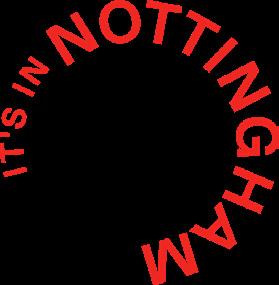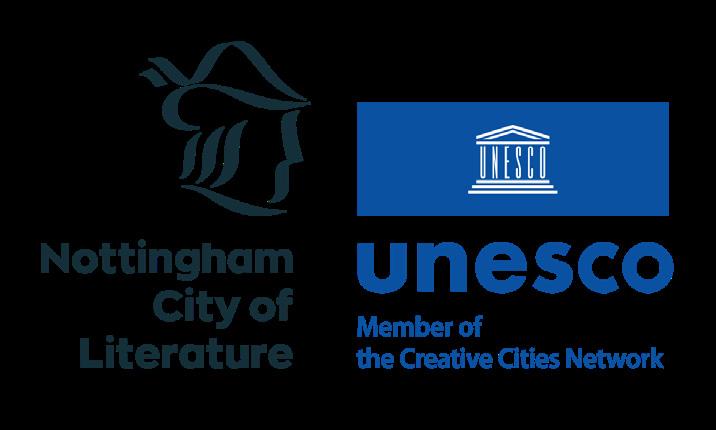

New Nottingham Journal
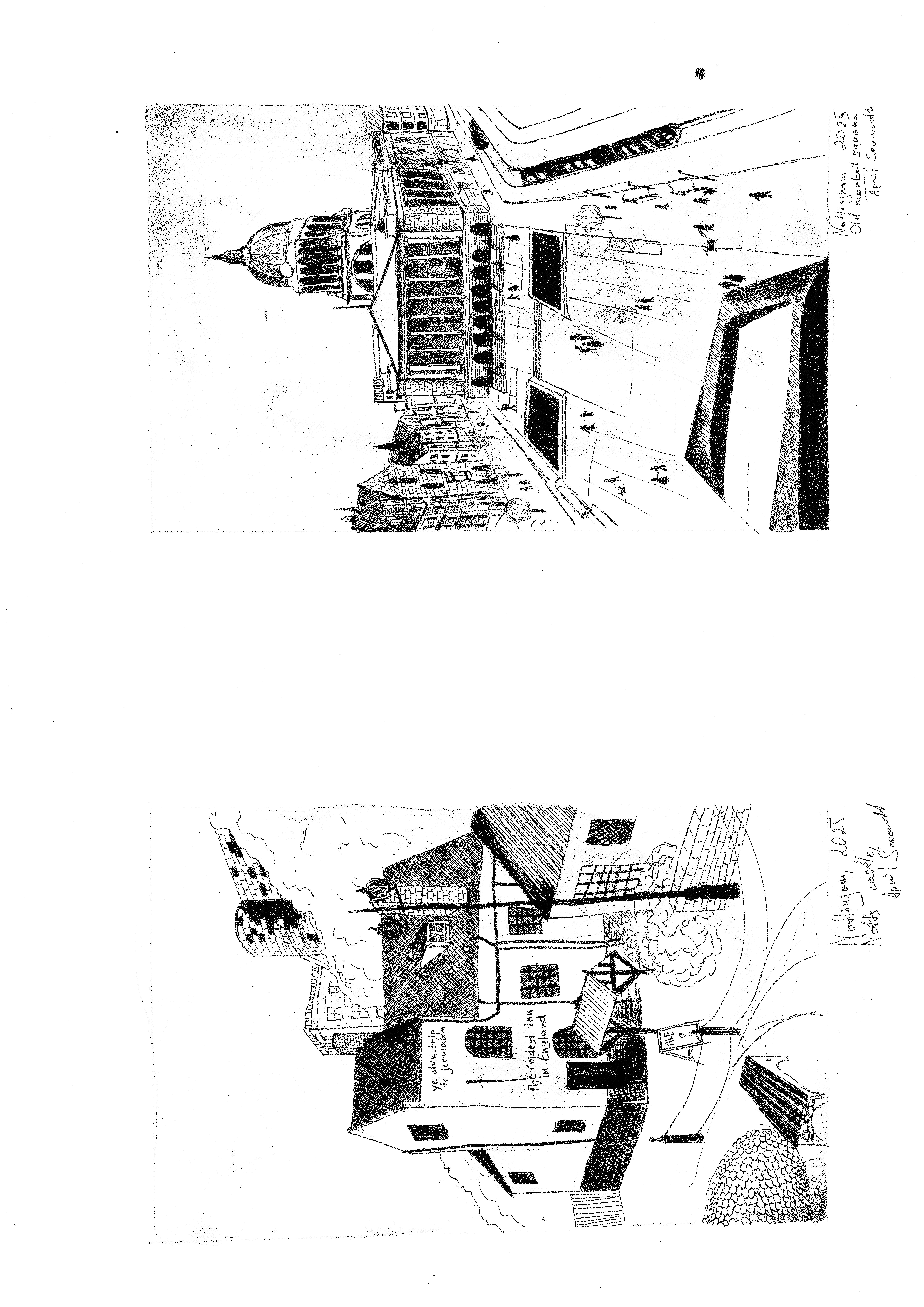
Illustrations by April Seaworth

VOLUME 1
EDITOR-IN-CHIEF - Andrew Tucker Leavis
ASSOCIATE EDITOR - George Newton
MANAGING EDITOR - Martin Fitzgerald
EVENTS COORDINATOR - Kibrina Davey
PR & MARKETING ASSOCIATE - Hannah Cox
COVER DESIGNER - Jim Brown
EDITORIAL DESIGNER - Karen Constanti
ADVISORY
BOARD
Amy Acre-Hall
Hongwei Bao
Becky Cullen
Jim Leaviss
Hannah Trevarthen
Rory Waterman
Matthew Welton
Robert Weston
Jared Wilson
© 2025 New Nottingham Journal Ltd. All rights reserved.
‘The Stone Dead’ by Alison Moore first appeared in Eastmouth and Other Stories. Copyright © 2022 Salt Publishing. All rights reserved. Reproduced by permission of the author.
The New Nottingham Journal is bound and printed in Cornwall by TJ Books. This journal is printed on paper that has been certified by the Forest Stewardship Council (FSC).
New Nottingham Journal Ltd. - registered in England and Wales 16346485.
The Phoenix and the Sieve
A letter from the editor
It might have escaped your attention, but there’s an uncanny moment in the Italian version of Peppa Pig. In need of escape, the jovial porcine family have booked a holiday to give themselves a fresh start – they opt for Italy, but, unable to speak the local language, they flounder. In the English version, this plays as a gentle farce.
But in the Italian translation, this makes no sense: as Italian Papa Pig gestures to the Italian reindeer behind the information booth, everyone is speaking Italian. Somehow, though, nobody can understand one another. Language is unreliable like that.
Watching Peppa Pig is a vice I’ve developed this year, not because my frontal lobe has so atrophied that it can only digest five minute cartoons (although: possibly) but because on grey days I can console myself with that, by learning the language, that there’ll always be a warm, boot-shaped country to which I can escape.
I love Nottingham more than anywhere in the world, but it is prone, like anywhere in this country, to get drizzled upon; grumpy, under the grey end of a rainbow, shuttered away from itself. The Meadows here, for all their charms, are very un-Mediterranean.
DH Lawrence escaped from Nottingham to Italy in 1912, to get married on the white-shingled shores of Lake Garda. Through his intense charisma, Lawrence convinced his new
wife to abandon her family – to leave England, to run away from wartime mistrust of his radical writing.
In 1915, Lawrence published The Rainbow. Perhaps his best novel, it was quickly withdrawn: in one chapter, the teenage character Ursula begins a lesbian affair with her schoolteacher. For this unforgivable obscenity, the book was yanked from the shelves, and every one of the thousand printed copies was pulped. His effort to communicate had been frustrated.
Lawrence only doubled down. His next novel, Lady Chatterley’s Lover, was to be even more inflamed and infamous. He decided to publish it first in Florence, away from his prohibitive home country – dedicated British readers could subscribe to import the book from Italy. When it arrived in their hands, it had stamped on it the author’s new logo: it was a phoenix.
Of course it was a phoenix. At the beginning of the 20th century, the mythical bird was everywhere: ‘Phoenix Cottages’ could be found in Lawrence’s native Eastwood, or you could caffeinate yourself at the nearby Phoenix Coffee Tavern. Insurance companies used the bird for their logos. You can imagine the significance to DH: the uncouth son of a miner could never stay down for long. A century later, he’s still regarded as one of the finest modern writers, far along the path to immortality.
Eternal life is the Unique Selling Point of the phoenix, but when you think about it, it’s a strange sort of continuance. It doesn’t, strictly speaking, live forever. It burns down and is reborn, cremates and un-cremates itself. In this myth, immortality isn’t just the avoidance of death, but having the wherewithal to keep being born.
So perhaps worthwhile things don’t have to go on forever – they can vanish, recollect themselves, and begin again. That’s the case with Nottingham’s history of print publications: there have been so many, and there are so few left. Just one example is the Nottingham Quarterly, a literary magazine created in the seventies by John Sheffield, featur-
ing at least one new story by Alan Sillitoe. In the introduction to the first issue, John memorably compares launching a new journal to launching out to sea in a sieve. To the founder of a new journal, that gives a very visceral sinking feeling. New publications have always been a risky voyage.
The original Nottingham Journal is another publication that’s long since disappeared. In its lifetime, from the 1700s to the 1970s, it offered daily news to the city, and writing experience for J.M. Barrie, Graham Greene, Cecil Roberts and many more. I should be clear that the book that you hold in your hands is not a continuation of that daily newspaper. But it is inspired by, and borrows some spirit from, the journals that have ceased to be, and the ones now fighting for survival against stiff competition from social media and the sort of digital infotainment that wants only to entangle you.
The New Nottingham Journal is by no means an obvious formula for success. And so our thanks is unreserved now to everyone who has backed and supported this project — whether with your money, your time, the strong scaffold of your encouragement, or by sending your work to our thankfully jam-packed email address. This journal exists in your hands because you saw this as a gamble worth taking.
Deeply in your debt, we’ve been working hard pulling it all together. In this first volume, you’ll find stories set on ocean trawlers, poems from the edge of…, essays about stuttering and longing, and photography that reframes some places we know and some that we don’t. Some of it is rooted in Nottingham, and some of it comes from elsewhere, from six continents. All of it is gathered here under the idea that print culture and our stubborn city in the Midlands are suitably matched — neither have yet come to the end of their many lives.
I have no illusions here. Creating a new journal of writing in 2025 is still, as John Sheffield said, like launching out to sea in a sieve. But it’s also Papa Pig speaking Italian to a cartoon reindeer. By which I mean that all communication is a process
of mischief, of a wide-eyed optimism, of bizarre persistence. The phoenix lives forever by refusing not to begin again. Lawrence knew this. When England turned its back on him, he went abroad to pull himself from the embers. He printed what he needed to print, and sent it flying to the people who needed it. Whatever headwinds blow across Nottingham –however wrenching it is sometimes to be an underlooked city – I am massively proud of this place. We are untrampleable. You’ll read this in our native writers, in the ones we bring in; in our old, shuttered publications, and, I must now hope, in this new one.
On those grey days in a city like this, sometimes there’s a smoke that clears, and you can see a new thing standing there. It’s always the same old bird, alive again, singed at the edges, but ready in its beak to sing.
I hope that makes some kind of sense.
Dear friends near and far,
Welcome to the New Nottingham Journal.
Andrew Tucker Leavis - Editor in Chief
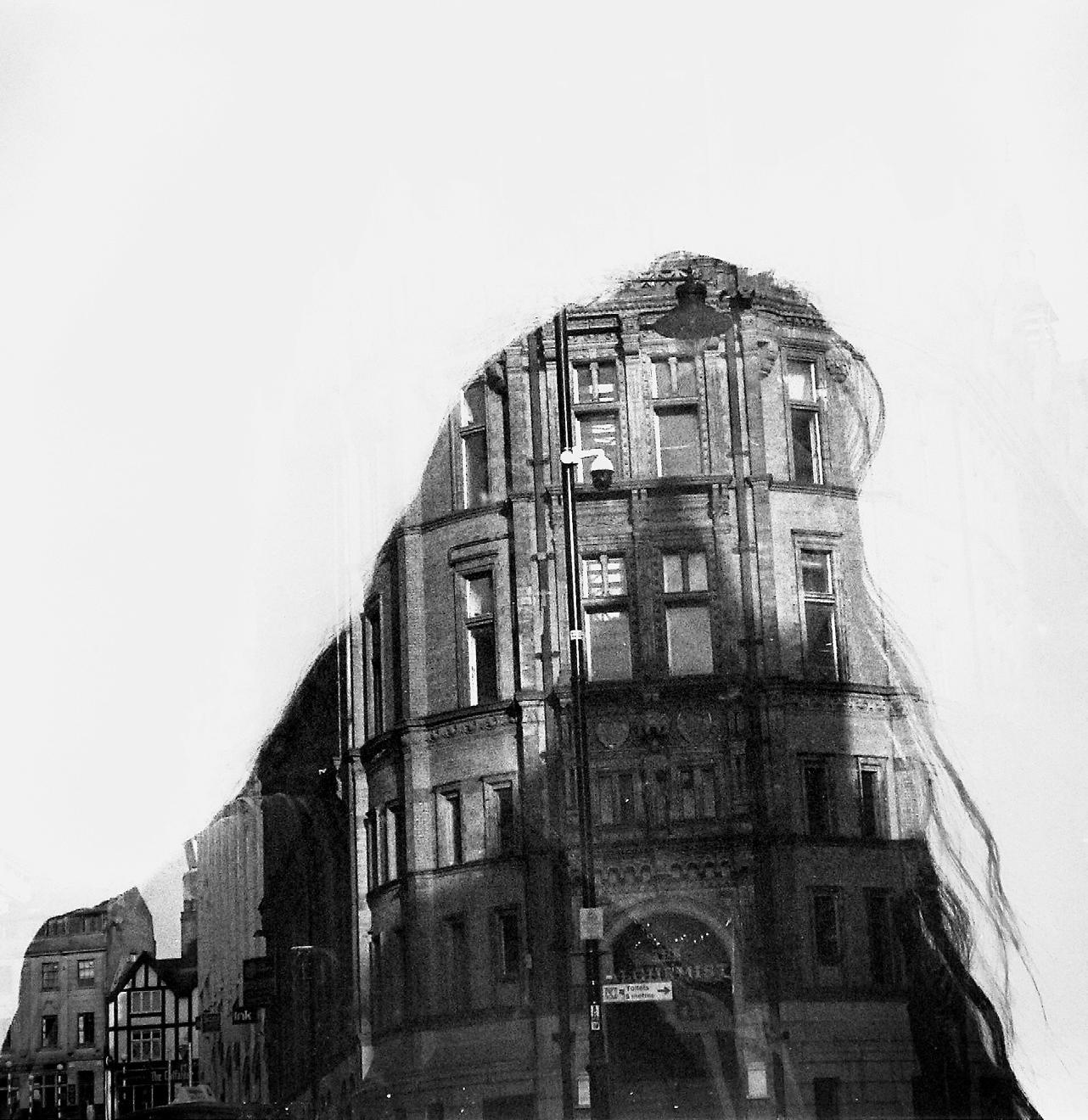
Photo by CJ Deocareza
Cussed City Benedict Cooper
Is it in the blood? The history, the culture, even the geography? Where does it come from, I often wonder – this city’s tendency to produce or attract rebels and rogues, mavericks and misfits?
It’s not just the outlaws, literary bad boys, machine-smashers, castle burners, England’s most outspoken football manager, even one of the few documented 17th century female highway robbers. The Rebel City has a way of producing rebel politicians as well.
At least, there are plenty of examples to help make that case – from the recent past alone.
There’s Alan Simpson, former MP for Nottingham South, who clashed with the Blair government over many issues, not least the Iraq War. There’s Tory maverick and rebel Ken Clarke, a lifelong thorn in the side of many a Conservative Brexiteer and free market nut. Fellow Europhile Tory Anna Soubry, as MP for Broxtowe, was so loath to support Boris Johnson’s Brexit that she quit and helped form a new pro-EU party, which Nottingham East MP Chris Leslie also joined, partly in rebellion against Jeremy Corbyn’s leadership.
And these days we have Nadia Whittome, who went against the Labour whips nine times in the first 10 days of July alone, over votes including PIP legislation and the proscription of Palestine Action. Ashfield MP Lee Anderson has certainly taken the rogue’s route through politics, switching from Labour to the Conservatives to Reform to become the latter’s first ever MP.
‘A golden thread of rebellion’ runs through the city’s history – so John Hess, veteran BBC political reporter and editor, tells me over a coffee. ‘There’s a cussedness to the city,
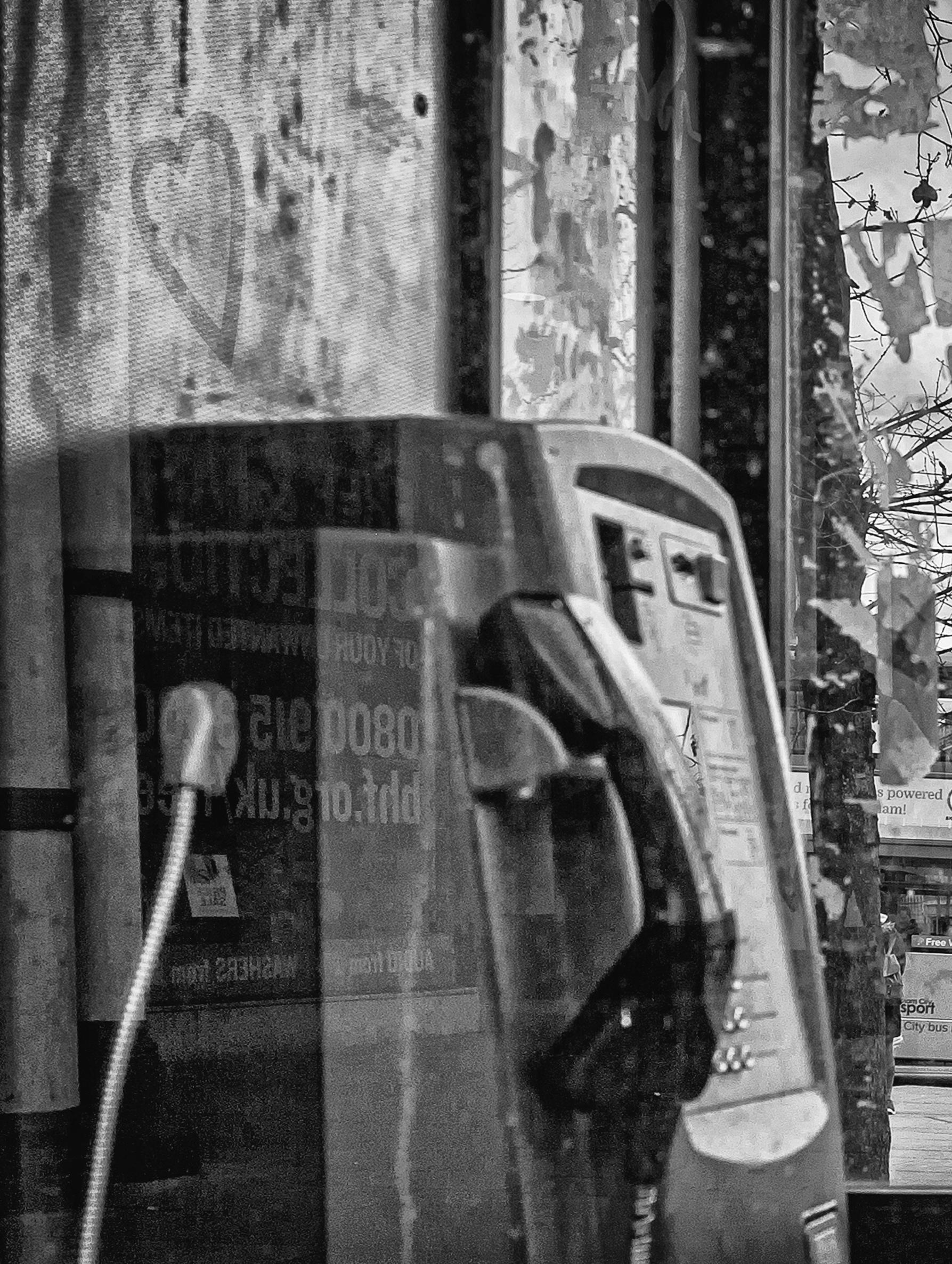
Photo by Ash Wroughton
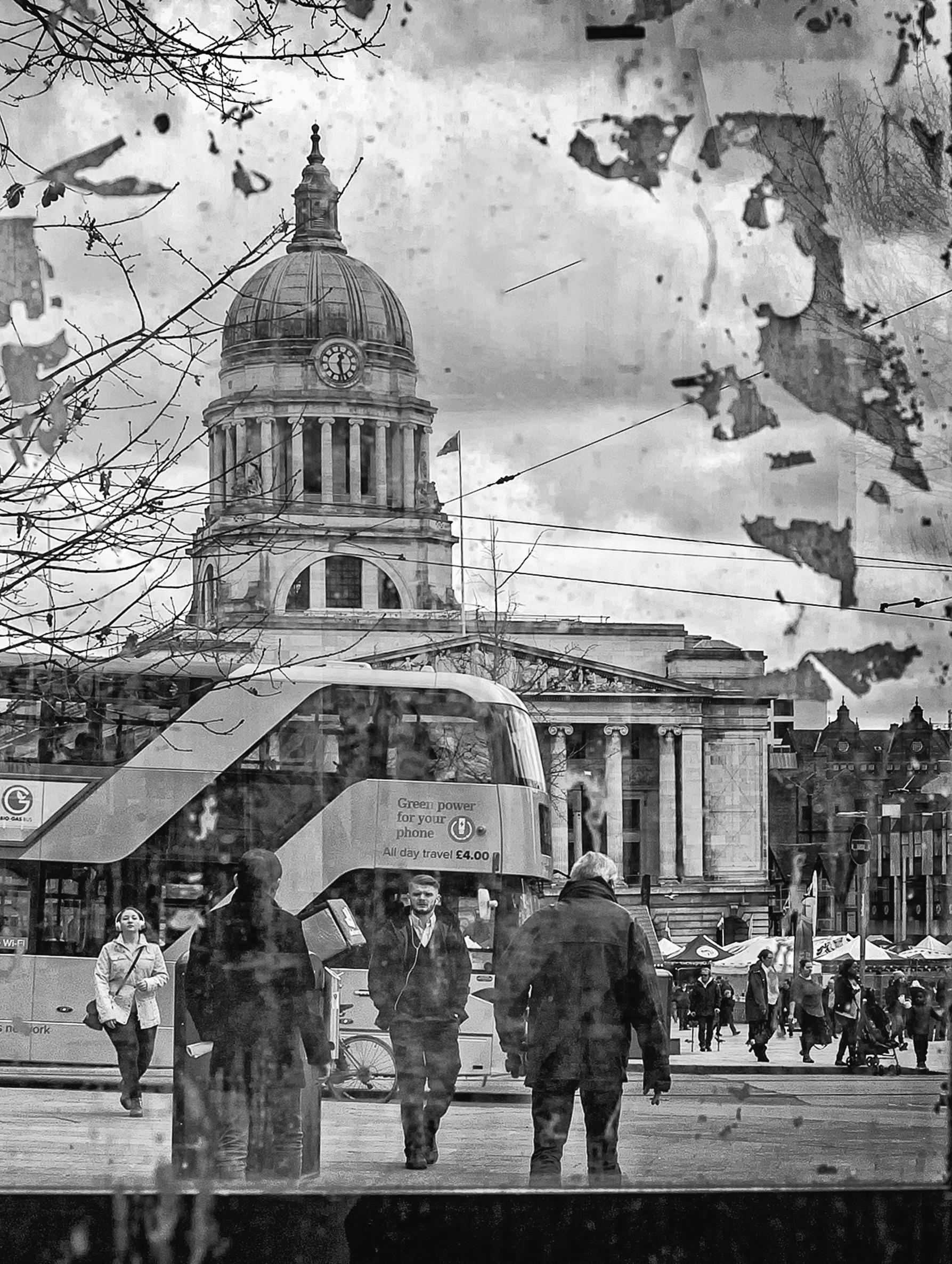
a bolshiness. It goes back beyond Alan Sillitoe, back to the frameworkers and smashers’.
Anna Soubry also thinks I’m onto something with my ‘Rebel City – Rebel MP’ theory. Soubry’s back serving as a barrister – a KC no less – but her formidable parliamentary presence, and her refusal to take refuge in consensus, are still renowned in Westminster.
‘It’s true Nottingham has a history of producing people who are just, you could say, a bit difficult,’ she tells me when I catch her in between court appearances. ‘People who are rebels and they’re not afraid to be rebels.’
‘There’s that sense of independence. It might be in the water. There’s a strain of courage there. Or maybe we don’t have a fear gene.’
She ought to know. As well as being a fearless rebel against Boris Johnson’s pro-Brexit Tory government, which she eventually quit to form a breakaway rejoin party, Soubry, who grew up in North Notts mining country, has never been one to cravenly follow a crowd.
‘If I look back at my own life, I am not good with authority,’ she tells me. ‘I don’t like being bossed about.’ Boris Johnson wasn’t approached for comment, but I have a feeling he’d verify that.
Soubry admits that she could have made life far easier for herself. She could be a comfortably-off member of the Lords with a peerage and a pension by now, had she been willing to go with the flow. But she wasn’t; that’s not her style.
It certainly hasn’t been the style of another Notts Tory rebel, who still thunders away in the House of Lords as Lord Clarke of Nottingham, but is better known as Ken Clarke, the whisky-drinking, cigar-smoking, jazz-loving Chancellor. Lord Clarke is to politics, perhaps, what Brian Clough was to football: the man who never quite made it to the top, but could – perhaps should – have done. Cloughie was ‘the best manager England never had,’ and, Soubry tells me, ‘Ken is one of the greatest PMs we never had.’
There are easier ways to get along in life than being a
principled rogue, certainly in politics. You can climb the greasy pole much more easily if you drop your principles on the way up.
But for another great figure from Nottingham’s political history – who also didn’t like being bossed about – principles and the terrible toll of war meant that simply wasn’t an option. Alan Simpson wasn’t born in the city. Like other big Nottingham names he moved here as a young man and has stayed ever since; there’s something about Nottingham that gets in people’s blood. Arranging our interview, Alan tells me how much he’s looking forward to getting into the theory. Is there a book in this? I wonder, as I head off to meet him. And over coffee Alan agrees about the culture of radicalism in the city that adopted him – he cites figures such as 19th century Nottingham MP and firebrand workers’ rights campaigner Feargus O’Connor, whose statue stands in the Arboretum.
But it’s not about rebelliousness for the sake of it, he says. The reason Nottingham has always been a ‘slumbering radical giant,’ as he puts it, woken into bursts of angry activism, is that there are people like him (though he would be too modest to admit it), who ‘keep to their political roots’ and don’t back down.
To Simpson, rebelliousness is left radicalism: not a general loathing of what Soubry describes as ‘excessive authoritarianism wherever it raises its head’, but of a specific left wing kind. Yet Soubry applies the label of ‘rebel’ to the miners who didn’t strike in 1984, against the orders of the ‘authoritarian’ National Union of Mineworkers. Not a view popular on the left.
So you see that even in this short journey we find disagreement, strong opinion, maybe even a touch of bolshiness. Of course we do. It’s Nottingham.
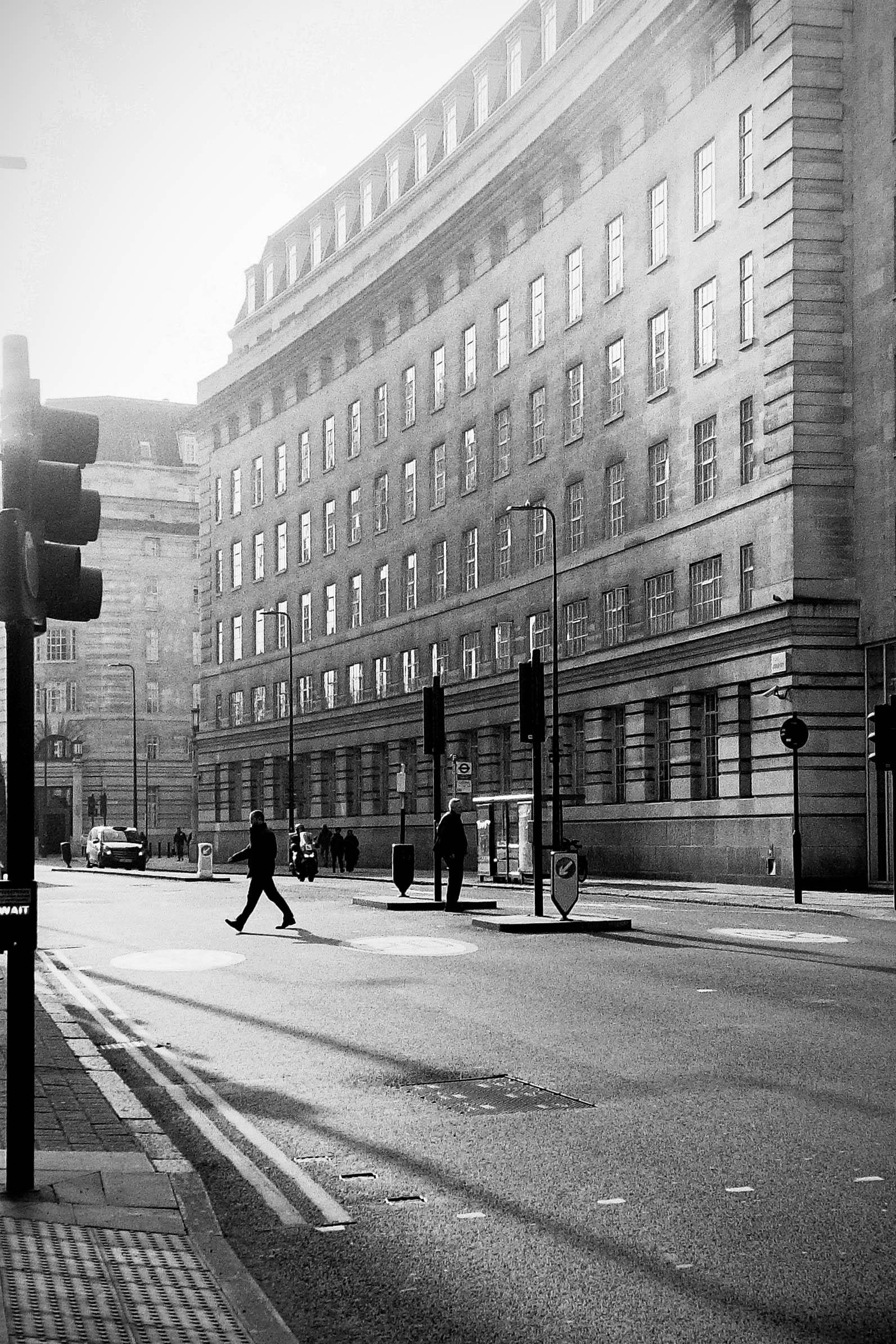
Photo by CJ Deocareza
An Honest Politician Reneges
Emma Neale
You walk in on the headline news and it’s as if you’ve discovered a favourite, self-contained child crouched over a concealed treasure to see the glint between fingers and thumb is neither his new glasses, nor toy microscope, but your embroidery scissors, the miniature set with blades like the fine gold beak of a merciless bird and he snaps, snips, clips, dexterous in his focused, ferocious intelligence; there is a cold, opalescent drift from a radiant blizzard as he forges a technically brilliant creation: the model of a chemical compound, say, or of a supercomputer’s inner circuitry, all fashioned from something as unlikely as tissue-paper, bright as persimmon and what you see in his soft-yet hands is a species of elusive moth its zinnia-red wings with fluted blue and yellow trim, its owl-feather brown thorax, antennae as curved as ferns and multi-stringed as harps, now bisected, folded, cut and twisted into a result complex, terrible and dead.
Night Shelter
Emma Neale
A man in a concrete alcove downtown raises his bottle of whisky and calls across the street to three of us, ‘Girls’ night out, is it? It is, isn’t it? ’ey! Look at me when I’m talking to you!’
We try to ignore him the way we would the one lasso-necked seagull in every flock, the self-elected General who stalks and bawls out all the others for some petty, manufactured dissent.
Yet hours later, in the hard, split core of a cold snap I wake as if to the sharp knock of trouble and I can see him there, hunched small in the doorway, like a child who wet his sheets lost in his dream where he became a body torn as light across the sky as a discarded till receipt, his bones browned as windfall apples suckled on by flies and wasps and I want to know, who was there when he first cried out from the deep, bricked well of fever, night terrors in his head like blood-laced water?
Did anyone draw him, rocking, back up to the surface, dry him, murmuring, I’m here, you’re safe now, there was no well; on either side of a wide, shared bed, did anything like love ever raise its doubled covers, strong as a soffit, paired as wings?

Photo by CJ Deocareza
Sky-Clad Indu
Menon
Trans. by Nandakumar K.
The day my brother married a Kannadiga Muslim girl from Moodabidri, I opened out all the windows of my room, flouting all the restrictions placed upon me. In the shimmering heat, the train – its windowpanes still unsullied – sped through the day’s blinding light like a glistening, red-hot catfish. The smoke from the chugging blue trains, smelling of metal, had blackened the walls of my husband’s childhood home.
During the afternoons, when my husband went out for his party activities and my mother-in-law lay asleep, I would stretch out my thick neck through the window like an overweight tortoise, keep my head out, and watch myriad types of people and things as the trains trundled past. Everything that my window provided was a revelation.
Although he was fair and slim, my husband resembled a Hindu god. He had eyes that sloped up on either side of his face, and the wide, fan-like ears of Ganesha. Every night when he returned from his work in the RSS Shakha paramilitary group, my mother-in-law and I would be watching a Jai Hanuman serial on the TV. Quivering with devotion and excitement, my mother-in-law would keep chanting devoutly: ‘Hare Rama, hare Rama’, whenever Hanuman or Rama appeared on the screen.
One evening my husband reached home early, very flustered and bothered. Holding my hand, he took me into our bedroom and bolted the door.
‘Our Jayakrishnan has goofed up.’
Flashes of lightning lit up my brain. My palms became sodden with sweat.
‘Don’t be scared. But he’s gone and married a Muslim.’

‘I thought something had happened to my amma.’ I had been picking jasmine flowers to make a garland for the deity. My amma, my mother, was an inmate of Gandhi Ashram, the hermitage in Kamala Sevagram.
‘When I think of your mother...with all the infirmities of old age...’
I looked at my husband sympathetically. I made him understand that father, bapu, valued every religion equally – and
that for my amma, faith was never important.
‘As for bapu,’ he said, ‘whatever. I’ve been promised a seat at the next election...’ With a distracted look he lowered the jasmine branch so I could pluck the flowers.
I was getting irritated. It put my back up that my man knew nothing about bapu.
‘It’s no use shouting Bharat Mata ki jai,’ I said, ‘“Victory to Mother India” – she is not what you think she is. How is it that every time my brother has seduced a Muslim girl, then debauched her and left her, you haven’t warned him?’
My husband himself had informed me about this side of my brother. He’d told me that Jayakrishnan had understood the essence of Hinduism. When I’d heard him say that, I had looked at him in shock.
‘Each girl’s debauchery,’ he said now, ‘means the ruination of her community.’ According to my husband, Jayakrishnan had a hardline agenda. Annihilation, razing, extermination. He is doing it in his own fashion, my husband said.
‘But doing such things?’ I said, ‘What is to be achieved by causing dishonour to anyone?’
‘I’ve been cautioning him. This time, though, like the monkey in the Panchathantra, he has pulled out the wedge and his nuts are in a tight spot.’
The news had stunned me. Every time my brother seduced a girl, humped her and left her in the lurch, I was scared that my yet-to-be born children, and even the generations to come, would be visited by his sins.
‘When the people caught him red-handed,’ said my husband, ‘it was all much of the same. He was grabbed without a stitch of cloth on him.’
Whatever the circumstances – even a shotgun wedding – I was happy that my brother had finally married. I knew that a fervid kind of feminine love was essential to mellow his hard, firing heart. But as a person, I was never able to really understand him. The slightest provocation was enough to distress him.
The squeak of chalk on the blackboard in the Malayalam
class used to be enough to make him have an epileptic fit. The moment the teacher finished writing ‘nga, nja, na, na, ma’ on the blackboard, Jayakrishnan would shriek, pull out a clump of his own hair, and keel over onto the floor. He would curl into himself, like a millipede taking protective action.
When our parents fought, he would roll his eyes and scream his head off. On the day the court granted their divorce, Jayakrishnan had gone to throw stones at the state road buses and trains.
When the court gave my father custody of Jayakrishnan, he made a scene and went away with my amma to the Gandhi Ashram instead. All through the journey he lay against her chest, gnashing his teeth.
When he was twelve, he was taken away to Sevagram, Gandhi’s residence in Wardha. Once, amma and I visited him at the Ashram. He was working in the village, cleaning the overflowing public toilet – he went down into the pit and shovelled shit into basins. His body and face smelt of the black shit, and he resembled it too; the nauseating reek saddened me. But Jayakrishnan’s transformation made amma happy. Pulling up the hem of her khadi saree and tucking it into her waist, she too helped carry away the shit, just like the villagers. At that moment I recalled that my mother was a high-caste Brahmin woman.
I hated Gujarat. My mother sought an alliance for me early, and at nineteen I was married off. The trip to Wardha after my wedding was fun; my new husband was enthusiastic about the trip as well, since his party was ruling the state. As soon as we disembarked at Wardha, a group of men garlanded us with saffron-coloured flowers.
‘Bholo Sri Ram ji ki...’ Chant Lord Shree Ram... ‘Jai.’ Hail.
‘Bholo Bharat Mata ki...’ Chant Mother India... ‘Jai.’ Hail.
I found my mother’s behaviour odd when we reached the Ashram. She spoke to me secretively, caressing my head with
her fingers, which smelt now of groundnut oil, where once they had the fragrance of herb-infused coconut.
One day Jayakrishnan blew in, ranting and raving, after being sent to Sabarmati Ashram for a week of voluntary service that he had not completed. His right hand had become spastic. His tongue, on which he had bitten down in a frenzy, looked bloodshot like the Kali’s. He went to the apiary and, using his left hand, threw down and smashed all the honey bottles. Then he yanked out the charka spinning wheels from inside the Ashram – he trampled on them, smashed them, and threw them in the fire.
‘Kanthi, Kanthi, Konthi...’ he was ranting, wilfully mispronouncing Gandhi’s name as he threw stones at Gandhi’s framed photo. When my mother started to bawl, he emerged from the Ashram building and started to tear up and throw away his own clothes. Finally, naked but for a string girdle at his waist, he strode towards the city.
‘He has now become a sannyasi ascetic,’ my mother said, ‘I’m told he’s in the Dulai cremation grounds. But I’ve never been to see him.’
So the next day my husband and I went. On either side of the road were Sadhus and ascetics. I watched with curious awe a Sadhu who was doing penance, standing on one leg – in his matted hair, sparrows had laid their eggs.
The ascetics wore no clothes. I found their nudity gross and abhorrent.
‘Nimala, they are Digambaras. The sky-clad. And now look at those over there, they are Shaivites.’ My husband pointed out a few Sadhus with dreadlocked hair and bodies covered in ash.
Near the cremation grounds I saw a Digambara ascetic with a group of women in front of him.
‘Physicality is what the Digambara school follows,’ he said. ‘But it’s not meant for women.’
I realised that I knew the voice and its owner. It was Jayakrishnan, my kid brother who, in his childhood, would
cover his nakedness shyly with his tiny palms. Now the hair of this shameless man was expressed like the sinuous, gnarled roots of some ancient tree. In between all this hair, his white organ dangled down with the liberation that comes only from detachment. His nudity stared at me with a cruel joy.
‘Please...’ I broke down and cried. I thrust my towel at him and said, ‘Eda! You better wear it!’
‘My child, I am a Jain who has renounced everything.’
‘Eda...’ In my anger I tried to grab my brother. ‘We can meet a good doctor,’ I told him.
‘Our flowing asravam is what leads to the endless cycle of births and rebirths. Samvaram – to shut the world out – is what liberates us. Anger is one of the asravams, my child.’
Even after returning home, the vision of Jayakrishnan the ascetic continued to trouble me.
It was a while later, when my husband had been to Gujarat and returned, that he told me with obvious relief: ‘Your brother has got his marbles back. He’s with us now in Gujarat. He told me that he has realised the greatness of Hinduism.’
The only consolation I derived from it was that he had started to wear clothes again and that, if we ever met again, I would not have to listen to his lunacies.
Four years later, one early morning after the Wardha Passenger train had gone by, someone knocked vigorously on our door. It was my brother again. He entered without the least amount of hesitation or embarrassment.
‘Amma had given me this address a long time ago. There are a lot of problems in Gujarat. I managed to get away without the police or neighbours being any the wiser. Now Karnataka will be the land of my karma.’
He said that he had found a job in Moodabidri, near Mangalore, and he would be leaving the same day. That was to be the last time I met the absconder, my brother.
My mother-in-law insisted that, since he was now married
to a Muslim girl, we should not have any relations with him. Since I valued peace and stability in my life, I did not disobey her. A year and a half passed, during which my mother-in-law fainted in the bathroom, I became pregnant, and my husband was nominated as a candidate in the state elections.
When the doctors declared that my pregnancy – conceived after many years of cohabitation – was problematic and that I must have bed rest as a result, I kept the windows open boldly and watched the sights outside.
Then, one Friday evening, my mother called me. Weeping and indignant, my amma let fly a few imprecations from the other end of the line.
‘You two were so close...but even you didn’t tell me.’ She said that and continued to cry. ‘Isn’t he your sibling? My poor, sick child.’
‘Ammae...’ I was at a loss, ‘What has happened to Jayakrishnan?’
‘He’s no more.’ Her tone was wrathful again. ‘Today is the seventh day,’ my mother’s voice quivered down the line, as though she had the chills.
My body arched and I fell back heavily, the receiver still in my hand.
Three days later, showing no embarrassment at having lost in the polls, my husband came home to console me. I got the distinct feeling that he already knew that Jayakrishnan was dead.
He took me to my brother’s home. The passers-by and neighbours gave us looks of surprise as we approached. They all hung around expectantly beyond the fence, as if waiting for something momentous to happen. Jayakrishnan’s wife and child were home. Holding my swollen belly, I went up the steps, gingerly, carefully. My husband waited outside. Inside I found my amma.
‘You knew everything,’ she said. ‘You and your husband’. Her face looked like thunder. Then the storm began to pass
from her eyes. ‘Forget it now – everything’s over now. Which side does the baby kick?’
‘The left side.’ I touched my belly and stared at my mother.
‘Oh, God! It looks like you’re going to deliver a boy. He will have to bear the burden of all your brother’s sins, the poor thing.’ Amma used the edge of her khadi mundu to hide the nakedness of Jayakrishnan’s own baby, who was with us now too.
‘Now this, another burden,’ she said. ‘It’s a good thing that your brother died. There’s no accounting for all his wickedness – if he were alive, I don’t know how many girls like this baby’s mother would have had to suffer. People are scared of this disease. She and the child must have it now as well. Because of him.’
My head snapped to the side as if I had been slapped, and darkness entered my eyes. My words were licked away in an ocean of saliva.
I felt that I heard my mother’s voice say that she did not plan to return to the Ashram, that she would stay there until she died – since the mother and child would be orphaned otherwise, and because in my condition I should not exert myself. I could hear Jayakrishnan’s wife wailing softly in an inside room. I walked out to my waiting husband. Ignoring the eyes of the curious crowd around us, I hugged him close.
At that same moment, the rolling and twisting inside my womb felt like a storm breaking upon the left side of my belly. The baby kicked me brutally, in anger, in resentment and protest.
He was wrapped only in sky, and from the inside he stared at me with a vicious joy.
The Box
Amy Acre
Hold this box
Hold it in your lap and let the busy heat of its contents warm your crotch your drumstick thighs
You may think the weight impractical but if you stay perfectly still you will soon see how easy the assignment Allow yourself to stroke the silky pink ribbon with the pad of the thumb you use to signal approval so silky against the rough industrial card of the solid box
Don’t open it that would ruin everything There you go good girl
Now stay like that for the rest of your life
The Rainbow
Amy Acre
Although not a woman of faith, you know – as we all do –about the flood, the dove, the rainbow, so when you saw it on the wall – trick of the morning light, colorific and spectral –you thought he was coming home, god saying enough of this madness, I just wanted you to stop sweating the small stuff, I wanted to shock you back into the faith you left in the nineties, but – and here, god exhales, finger on forehead – rainbows, I’m sorry, are fickle. It’s easy to believe when you want something and that’s why I had to keep him with me.
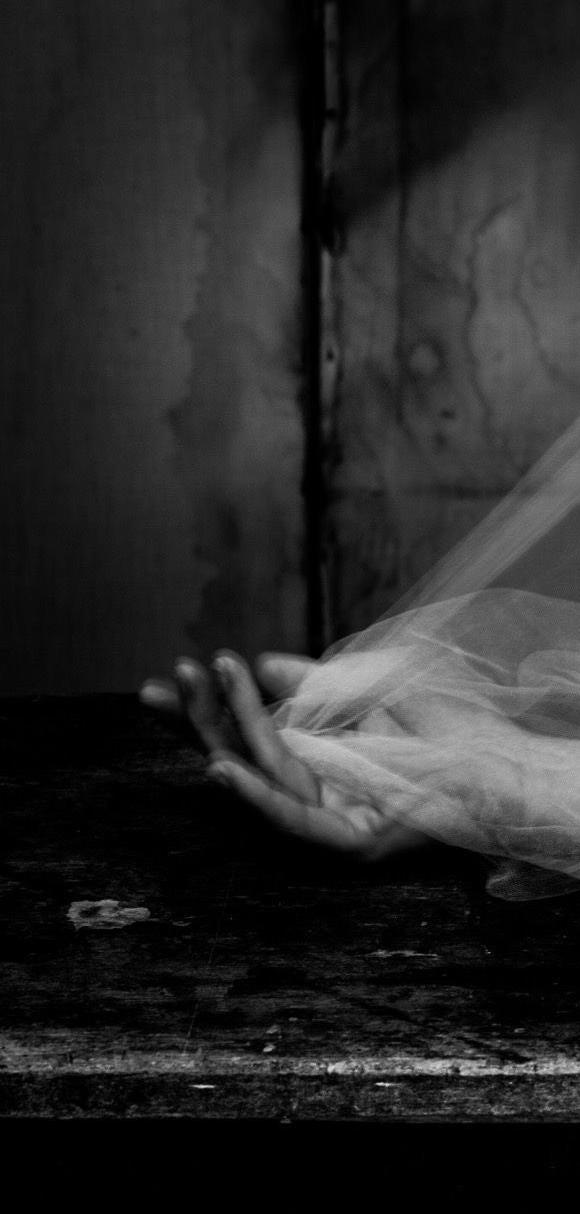
Photo by Nicola Davison Reed

Fragrant Bananas
Hongwei Bao
When I first came across the English word ‘banana’, I was surprised by its simplicity. Its rhythm and rhyme bring a weird tone of musicality, like singing, like humming, like whispering. And its spelling invites the association of a bunch of fruits hanging down from a branch, waiting to be handpicked. The Chinese name of the fruit is equally as tempting: 香蕉 – literally ‘fragrant banana’. It is common for fruits to be named in double syllables in Mandarin, although the second character usually suffices to convey the meaning. The person who first decided to add the word ‘fragrant’ to the word ‘banana’ must have had a touch of genius: the sound of the exotic, tropical fruit immediately conjures up a sensory experience associated with an inviting smell. Not to mention that the character 蕉 is idiographic – resembling a big tree, with a bunch of banana fingers hanging down among its leaves.
I was ten, living in a northern Chinese town located in the middle of the Gobi Desert near the China-Mongolia border. I was sitting beside a hospital bed accompanying Mum, watching transparent liquid dripping slowly and steadily from a bottle into a plastic IV tube connected to her arm. Earlier that day, Mum had been sent to the hospital following a heart attack. Now, she was sitting on the hospital bed against a white pillow and a blue wall. Her face looked pale and her arms skinny. She smiled at me, as if to say she was alright. She gestured to the bedside table and told me to help myself. On the table lay some presents brought by an earlier group of visitors: boiled eggs soaked in wet tea leaves, spam sausages, pears and apples. There was also a bunch of bright-yellow, curvy-shaped fruits. They looked like big hands wearing a yellow glove with fingers pointing to the air.
I knew they were called ‘bananas’. Although I had never eaten them before, I had seen them on television and knew that they were a delicacy for city people, especially those from the south. In this small, northern town, bananas could still only be spotted in big glass fridges at the largest department store. They would also crop up on special occasions such as weddings, birthdays and hospital visits.
I picked up the bunch, tore one finger from the other, and offered it to Mum. Mum shook her head and asked me to eat it.
I held the smooth skin in my hands, unsure about where to start. Its bright, yellow colour looked very tempting. As I was playing with it, my fingers made a few dents on the peel. I held the two ends of the banana and bent it with both hands. The peel opened. The white fruit with some strings popped in front of my eyes. I caught the fruit just in time before it flew into the air.
I picked up a small piece and put the white fruit in my mouth. It was soft, smooth and slippery. Not sugar-cane sweet, but mellow and with a lingering aftertaste. Without much chewing, the flesh slid down my throat and melted like candy floss. The sweet aftertaste soon spread in my mouth, throat and stomach.
Mum looked at me with a contented smile. The liquid from the bottle continued to drip quietly and rhythmically. We were not well-off, but Mum always wanted to give me the best in the world. I became the first one in the family to eat the ‘fragrant banana’, and later the first to go to university. I didn’t tell Mum that I liked boys instead of girls, in case it would disappoint her. The worst thing that a son could do to his mother.
I moved to Beijing to attend university and, after graduation, got a job in the city. The banana was a more common fruit in the capital. To afford the high rent and living costs, I had to do several jobs to make a living. My weekend schedule was packed: in the mornings I taught a group of school kids

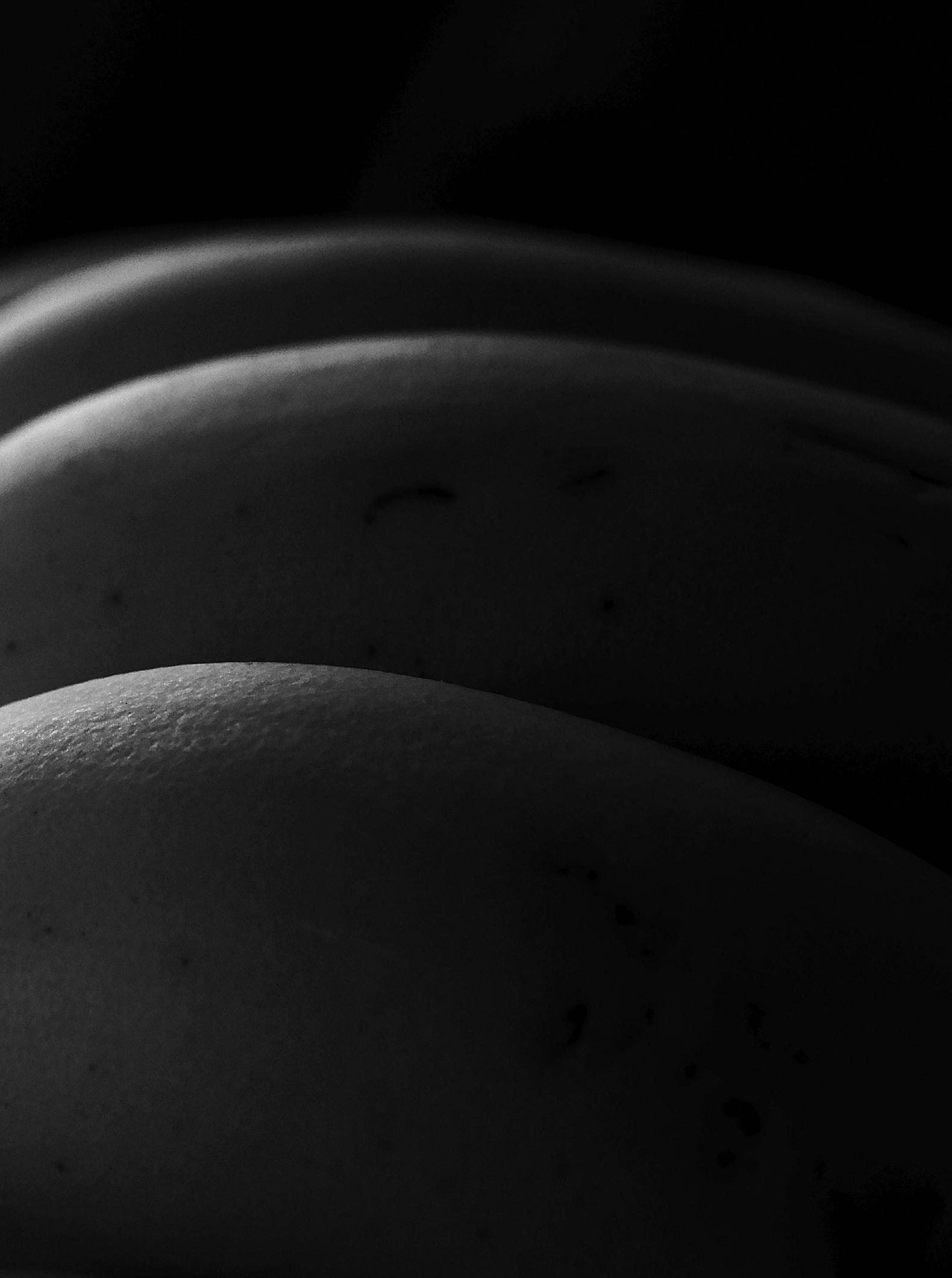
English in the eastern part of the city, and in the afternoons, I hurried to the western part of the city to give private lessons to a student. In between I was in transit, navigating the city’s complex public transport system. There was often no time for a proper, sit-down lunch. Bananas became my favourite snack. The reason was simple: they required no washing or cleaning, and they were easy to peel. Besides, they contained plenty of sugar and starch. They could stop hunger and get one reenergised immediately.
Before I left the flat every morning, Ming would put two banana fingers in a reusable food bag and place them in my rucksack. He was from southern China and bananas were common in his hometown. We had been seeing each other for six months. He was several years older than me and was a junior doctor working at a big hospital in the city. He was ambitious, capable and hard-working. ‘This young man has a bright future,’ his senior colleagues said. They probably wouldn’t have said so had they known that he was gay, or that the man who often visited him was not his old schoolmate but his current boyfriend. He lived, without much privacy, in the hospital staff dorm. Most of the time, he would come to stay overnight in my flat. Our relationship worked reasonably well until, one day, I announced my plan to study abroad.
I didn’t have to leave Beijing. But having worked there for five years, I could already see my predictable future. I was fed up with living a closeted life. I didn’t want to act straight and pretend to be ‘normal’ in front of others. I had done it long enough. I wanted to escape from the city and start a new life, in a country where I could be myself.
‘What am I going to do?’ he asked. I wasn’t sure whether this was rhetorical, or a question for me. I said he could apply for a university to study abroad. He shook his head. He wasn’t confident about his English. He had just secured a permanent position at the hospital and was expecting a promotion soon. For a person without the right family connections, he had done extremely well through hard work. It would be
difficult for him to simply leave everything behind and start a new life. ‘What are we going to do?’ he asked. I realised that he was asking about our relationship, our future – if we had a shared future at all – and I fell into silence. In a grand plan of pursuing dreams and sexual freedom, our relationship was not my highest priority. We had been together for six months, and already I could feel our personalities straining apart.
The day I got my offer from a UK university, I shared with him the news over a text message. After some silence, Ming texted back – ‘congratulations’. That evening, I was waiting for him to join me for a celebration. He didn’t turn up. I called. His phone was switched off.
I didn’t have bananas in my rucksack the next morning, or the mornings after. Years later, he would become a senior doctor and head a clinic in that hospital. He would marry a woman and have a daughter. He would occasionally think of me, as I would think of him, whenever he’d see a bunch.
It was cold and wet in the UK. It was difficult to settle down, but I managed to, eventually. The biggest challenge about living in a different country was not the food or language; it was the feeling of loneliness on those long, dark winter nights. There were plenty of international students from China, but most of them acted very straight. ‘Have you got a girlfriend?’ was the common question. I didn’t know whether there were any gay students among them, and it would have been risky for me to disclose my own sexuality for fear of being alienated. Meanwhile, there was a large queer community in London. Rainbow flags were everywhere during Pride Month, pastelling the city’s skyline, but I couldn’t see many Asian faces underneath. I was alone and lonely.
Even on gay dating apps, there were mostly white men, often known as ‘gay Caucasians’. A few of them had ‘No Blacks, No Asians’ or ‘Asians don’t bother’ clearly specified in their profile. Occasionally I had banana emojis thrown at me on the app. I came to learn about racism within the gay community. On the other hand, there were people exclusively
attracted to gay Asians – a fetish, almost. A ping on the app: ‘I love Asian boys. You all have such smooth bodies and nice bottoms’.
Then I came to relearn the word ‘banana’. ‘Are you a banana?’ a person of East Asian heritage asked me. I didn’t understand his question at first, so I asked for clarification. He explained that in colloquial English, ‘banana’ refers to Asians born in or living in the West, especially those who have adopted Western lifestyles or internalised Western values; in other words, ‘yellow outside and white inside’. The phrase is based on stereotypes, referring to the historical discourse in which Asian people were seen as racially ‘yellow’ and the ‘Yellow Peril’ anxiety that was said to threaten Western societies, because of Asian people’s distinct looks and values. That question made me wonder whether I was a banana. What were my cultural values? But this encounter raised more questions than I could answer: are Asian people and cultures intrinsically different? For whom, and according to whose criteria? Do gay and straight people share the same cultural values? And is there a cultural heritage that is particular to queer East Asian people? I can think of stories such as the rabbit god, the ‘shared peach’ and the ‘cut sleeve’ – classical references to queer intimacy in ancient China – but how difficult and impossible it would be to recover those things and retain them in a globalised world! My queer cultural heritage is as much from Leslie Cheung as the rabbit god –from Oscar Wilde and Freddie Mercury. Perhaps having a mixed heritage is no bad thing.
Almost all modern cultivated banana plants are cross-bred. They began in the mismatched pairing of two South Asian wild plant species: musa acuminata and musa balbisiana, both of which are seeded. But their hybrid, cultivated form does not have seeds and is therefore sterile. It has a mixed heritage itself.
We queer Asians who have been denied our cultural inheritance, who have been trapped between cultures, are good
examples of hybridity. Being a banana doesn’t have to carry a negative connotation after all.
The English phrase I like the most is ‘go bananas’, which I soon learned is a colloquialism for ‘becoming very excited or angry’, as if bananas were highly emotional fruits themselves. The first time I encountered the phrase I didn’t know what it meant, but I thought it was cute. In my mind, I imagined myself becoming a banana, or a bunch of them, braving the world with my queer Asian siblings until the entire sky would turn bright yellow – and utterly fragrant.
Phoenix Trees
Janet Gunter
There is a row of cherry trees in the Forest Recreation Ground, leading to the playing fields. They are generously sized – clearly the oldest in the park, their flowers heavy and humid when cupped in the hand. The trees form a canopy, this tunnel of petals that I imagine being like Kyoto. These cherries bloom during a certain week or fortnight in April.
In 2020, when I got up from my Covid sick bed for the first time to leave the house, they were in full bloom. It was Easter Sunday. While I’m not Christian, I did feel a certain new start that day, fancying myself free of the frightening new virus that loomed over us. I didn’t know then that this feeling – rising from my sick bed and coming back to life –would become familiar.
Five cherry blooms later, I am still sick. My energy is severely limited; I spend most of the day with my feet up. As I’ve come to learn in outings on good days, there are other notable cherry trees in the Forest Rec: the big one at the café, which creates a big pink corona over the space, and the white cherry grafted on top of another pink one. Or the row that runs near the park-and-ride car park, where they’ve been interplanted with delicate birch trees.
But the other cherry trees that marked me are the ones just outside the wall of the Rec, in the Rock Cemetery. They’re found in a sunken, walled section of the burial ground, where the victims of the 1918 influenza pandemic are buried.
These trees are massive, perhaps the size of a gigantic tropical ficus – the ones with the hanging aerial roots. When their leaves come in, the cherries provide shade for the massive stone markers made to honour those stricken by the flu. Names had once been carved on the markers, but are no longer clearly decipherable.
There is no gentler way of putting it – this is a mass grave, and it was designed to be hidden from view. To reach the space, you wander to the back of the cemetery and take a set of stairs – each one tall but spaced widely apart. The place feels like an imagined hypnosis prompt. One cherry flowers early, the other waits until April. They rise above the cemetery wall and, as we walk in the Forest Rec between January and April, they wave to us with their thousands of bright hands. Besides the cherries, the centennial oaks are the other trees that mean the most to me in the Rec, and recently I found myself discussing them online. This was unexpected. I’d joined the ‘Queerdos’ Zoom for disabled queer people in the Nottingham area, and towards the end, our facilitator Evie proposed an exercise where we’d give voice to trees. She sent a photo of eight tree types – oak, chestnut, spruce, and so on. Then she floated off to the next breakout room, and there was a long silence. I think perhaps everyone had expected to give voice to an individual tree, a lone witness to our world, not a variety – a tree stereotype!
Somebody expressed this thought, which was greeted with nods. I said I often imagined the oaks in the Forest Rec had harboured chats between Luddites. The person who’d spoken replied that their ancestors were Luddites. Then they talked about a conker tree from their childhood that had fallen but remained alive, recumbent – a phoenix tree. Their siblings used to climb up and down it, practicing key tree-climbing skills.
That sparked a discussion about these trees, which only need a couple of roots in the ground to live. I mentioned I’d just seen a mature birch like this – with perhaps 90% of its roots just floating in the air, dried out and inert. But while it lay down, the birch was thriving.
There were nods, and an unspoken recognition about the symbolism that such a tree had for us. The Descendant of the Luddites interjected that the exposed roots of these trees can unearth archaeological treasures – as if the tree were performing a grand reveal, just for us. Then they mentioned the
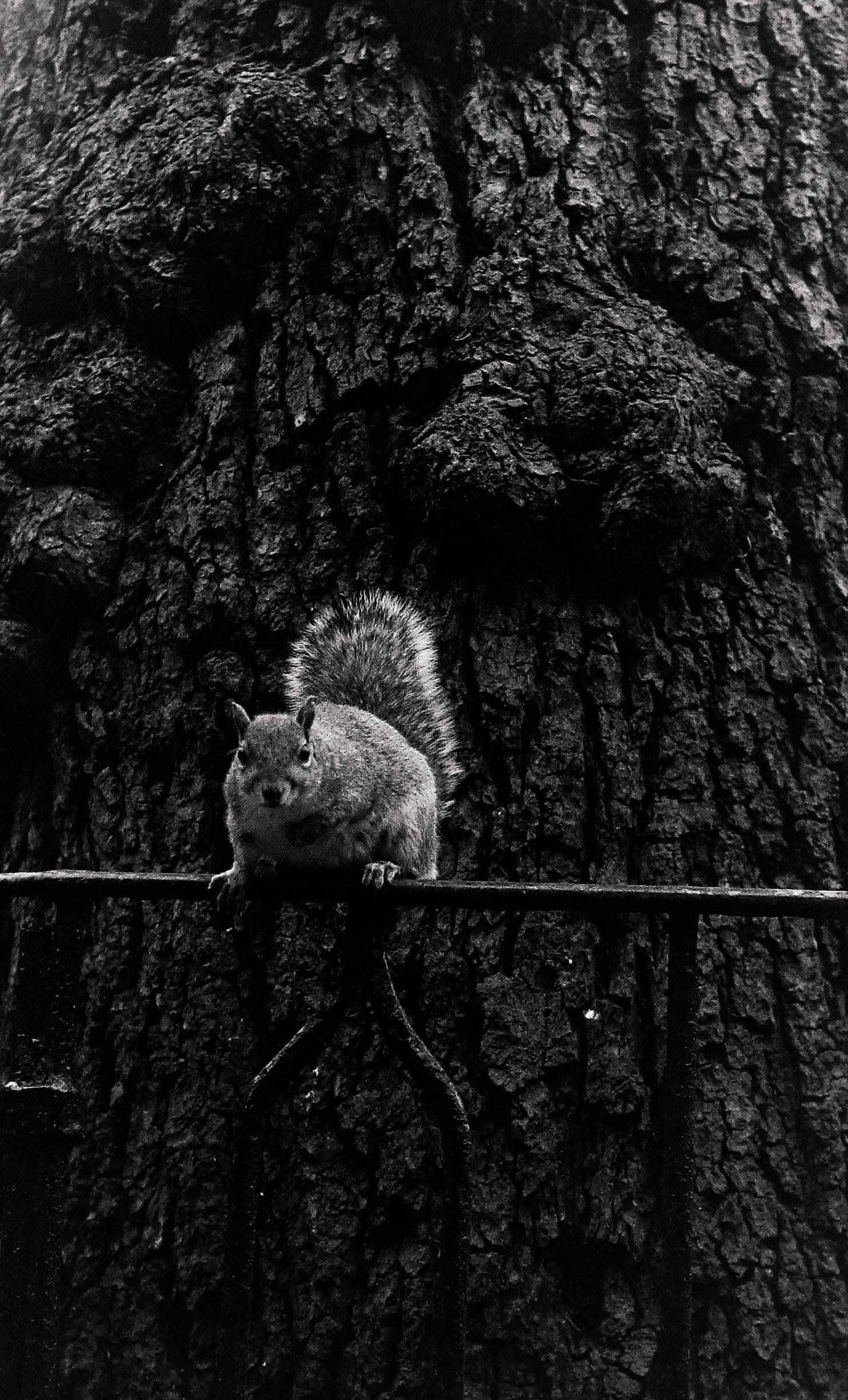
Photo by CJ Deocareza
massive tree in the Arboretum that’s supported by sturdy iron braces. Oh, I chimed in, the fig tree. We were the only ones in the room who seemed to know what we were talking about.
I had immediately remembered the Scottish Covid Memorial, the work of Alec Finlay, an artist with ME-CFS and Long Covid who I’d met in an online support group in the early days of my illness. Despite being unable to walk beyond his garbage bins, he had conceived and created the memorial in Pollok Country Park called I Remember, which is made up of 40 ‘tree supports’ – wooden braces made for oak trees which have begun to lean. Some look like stick figures, pushing back against the trees leaning onto them. Others look like utilitarian objects. Each one has been custom-designed and imprinted with a short phrase: ‘I Remember’.
Here in Nottingham our Covid memorial is one hornbeam tree, still-juvenile, planted in the Forest Rec. The dedication took place on a grim March day; there were maybe fifty people there, bearing daffodils. Some brought printouts in memory of their loved ones, in plastic sleeves to resist the rain. It was such a profoundly lonely event.
Not far from this young hornbeam tree, there is an old recumbent oak, which fell over just after the Covid tree was dedicated. It’s part of a line of oaks that I figure are between 150 and 200 years old. It might have heard the Luddites’ conspiratorial conversations.
After the online discussion I found a paper called ‘The Ecology of Scotland’s Wonderful Recumbent or “Phoenix” Trees’. It suggests that only older trees tend to fall and stay alive; it is not uncommon for a 200-year-old tree to fall and then live for another fifty to eighty years. The authors aren’t sure why none have been found to live longer than this: whether it’s because they die off naturally, or because people use them for timber.
The paper argues for an effort to raise awareness about phoenix trees, and the ‘value and significance’ they hold. It says that professionals and landowners need to be brought along so that they don’t just consider them waste and chop
them up. I was pleasantly surprised, I confess, when our park staff didn’t dismember and remove the recumbent oak.
‘Phoenix trees,’ the paper reads, ‘combine several compelling elements: their enigmatic sculptural beauty, their compelling efforts to survive against the odds, and the unlikely stories of how they adjust themselves to their recumbent positions.’
On days when my health allows me to walk to the Rec, we visit this oak, taking the dog up the reclining trunk, mining its bark with treats. My partner complains, justifiably, about the litter and used condoms at its base. We often talk about leaving a sign in the voice of the tree, asking people to respect it. Still, I have no doubt that – if the chainsaws are kept away – the sideways phoenix will outlast me.
In This Version of the Story
Vanessa Bell
Trans. by Chase Cormier
in this version of the story I’m five the light stages a perfect choreography of dust from which I invent secret worlds the open door leads to the balcony where thousands of leaves dance in the hot summer air bécaud finds his country as I walk the beach whose belly has never been touched I discover what an olive tree is and the right way to fall asleep beneath it my father grinds coffee beans the flat fills with promises a slow day lies ahead
in this version of the story I’m seven my alcohol-soaked father sinks into the bed I walk alone, chin-waving to each of the massive trunks their many arms brush against each other above my head I live in the most deprived part of town a cement area modelled on new york made up of a dozen quadrilaterals except for the path I take to get to school it follows the course of the dried-up stream a plaque with the name of a bird bears witness I am a poor child sated with stories and wild beasts whose bites I don’t know yet the trees are parents pointing towards my destiny under their protection, I learn to breathe
in this version of the story I’m nine my great-grandmother is a cascade of laughter in front of full pails the thaw pays off we sink our legs into what snow remains open a path from the wood to the cabin simmer, sing, celebrate the syrup, its return a prayer to end winter in this version of the story I’m 26 the oak veils the ardour of a kiss long as desire a slow crossing of my body makes me a mother I emerge glorious in iron effluvia adorned with sutures my name is a song from which my daughter draws milk I exchange my pain for a life crowned with lilac a whispered vow they both reach for the sky in this version of the story I am ageless my mother is a bear who calls me up north I choose the forest, lick its resin recite aloud the essence of each tree their exhale – a hymn a lullaby lying against the lichen I invoke the ancient course of things that long before the churches carried the mysteries sanctified, you appear under the canopy our bodies dance in the liminal space of our memories rain and a hundred raging fires could not erase the beauty for our songs are the guardians of the land I return to the place of my birth the trees are a mother gifting truth in the hollow of a closed fist sleep my child sleep as long as I stand there will be tomorrows

Photo by Ashley Gallant
Palilalia Rich Goodson
My tic began when I was six. And it began because of one of my realisations:
The words people speak are not the same as the ones they write.
I realised that while spoken words were messy and unfinished and ten-a-penny, written ones were a lot more predictable and reliable – plus, they got you gold stars if you got them right. And I wondered: could spoken words get me gold stars too?
From that moment on I went about checking every sentence before I spoke it. It came from a fear: that a sentence might exit my mouth unfinished or ungrammatical or poorly enunciated, or in the Nottingham dialect – or falling short of what I might put on the page. It might be unfit for purpose. And from this there was only a miniscule conceptual leap to dirty. The words that left my mouth might be dirty, because they came out of my mouth, and my mouth was part of my body, and my body was dirty…
Wasn’t it? My mother had told me that once: that I was dirty. I think I was two. So of course I believed her, and thought that it was an unimpeachable statement. A foundational statement. That’s dirty, she’d said, in a tone of aggressive disgust, and she’d walked off into the kitchen. A moment of tiredness, probably. She was twenty-three. Nothing more. A moment she probably soon forgot. After all, I probably was being dirty.
The shamer can shame as an act of love. The shamer says: I shame you to let you know that this tribe and all its ancestors does not do the thing you just did. You will be exiled from this tribe if you do that again. I shame you to let you know that you have crossed a line into something I do not
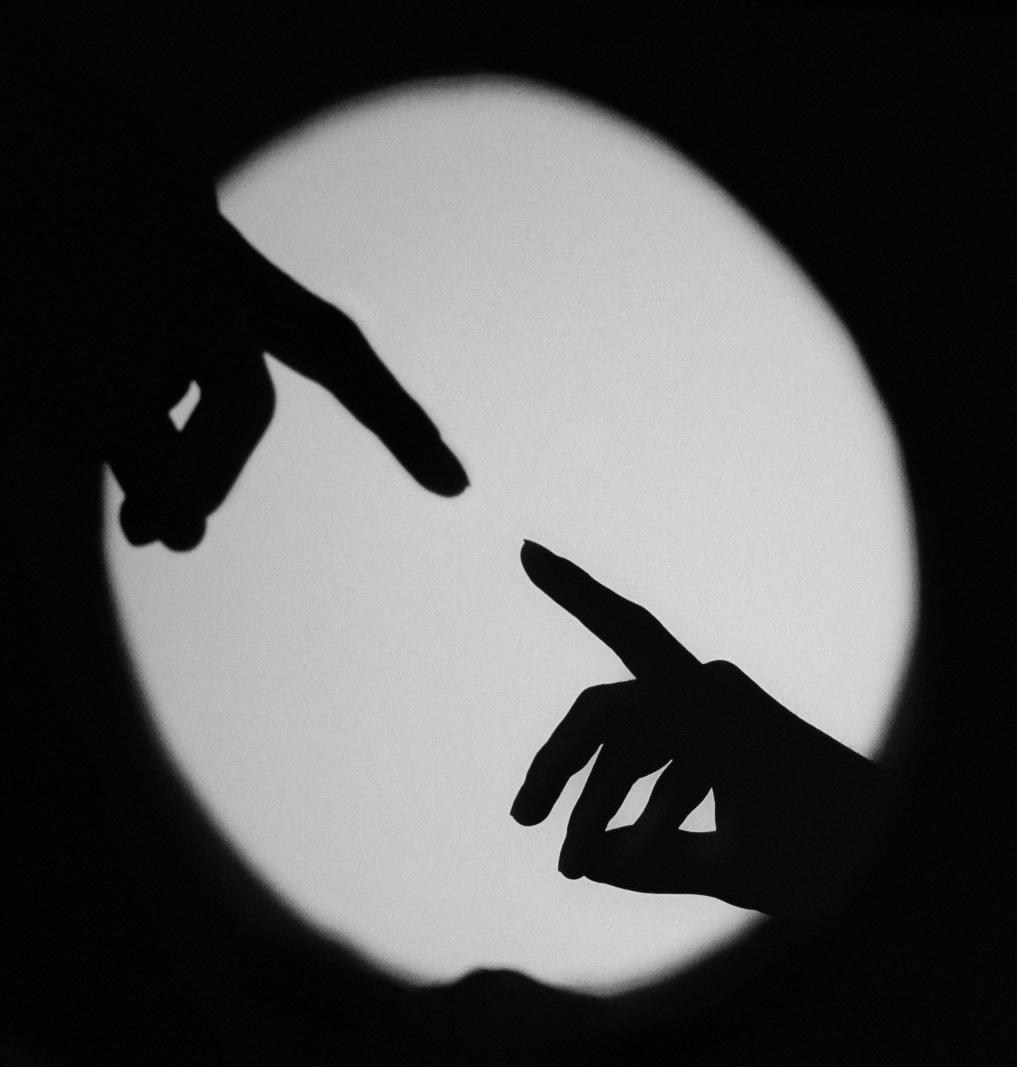
Photo by Shashank Dhongadi
understand, and which this tribe will not understand, and which its ancestors will not understand, a line which divides the civilised and the uncivilised, the moral and the immoral, the clean and the dirty, the halal and the haram, the kosher and the un-kosher: the trefah.
Trefah means: torn apart by a wild beast.
The shamer says: I shame you to let you know that I want you to stay on this side of the line: whole, safe, not torn apart by a wild beast.
The shamer says: I shame you as a warning, as a teaching. I shame you to protect you, to prevent you from being ridiculed or exiled.
The shamer says: I shame you out of love.
But it depends what tribe you’re born into and where you find yourself. One tribe’s wild beast, ready to tear you apart, could be another tribe’s pussycat, ready to lick your earlobe.
When my mother said I was dirty, she left my simple, two-year-old self stupefied. Horrified. Because it was at that moment that I decided that her love – her very presence –depended upon me being clean.
So I got with the programme, as they say. I would not be left at the river’s edge, in a basket, in the bulrushes, like Moses, where the wild beast might be a crocodile. I would not be taken away by the Dirt Police with their flashing blue lights and durr-durrs. I began to rehearse each sentence under my breath, a second before I said it out loud.
A second before I said it out loud.
So this became my tic. My happy glitch. My safe little trap of repetition. I’ve since learnt that it has a name:
Palilalia.
The first time I found myself doing this – being palilalic – I was holding Mum’s hand as we crossed the high street in Beeston where we lived. She was wearing a maroon mac. I remember a nearby boutique thumping out ABBA’s ‘Mamma Mia’. I remember bus fumes and yellow sunshine, and her looking down at me and listening to me, looking a little worried and a little proud, and me realising that this was a way of always being safely angelic in her eyes. I imagined seeing all the words in the sentences I was about to speak, lining up like I’d seen in the pages of books at school (because there were no books at home). I imagined the words of each one moving smoothly across the moist curve of my eyeballs from right to left. Fit, clean and orderly. Of course, this got in the way of seeing things.
Of course, this got in the way of seeing things.
It got in the way of ever saying anything spontaneous. It got in the way of ever saying anything spontaneous.
But with this tic I had a chance of being safe. From bulrushes, from the durr-durrs of the Dirt Police, and from being Moses. And I realise now that I thought I was keeping her safe too. Because if I was dirty, she was dirty. Whereas if I got gold stars, she got gold stars too.
I was saving her. What a precocious, narcissistic hero I was! Sons – especially only sons – are such complicated monsters. Later, I learned that sentences don’t save anyone. No sentence can have any kind of completeness. No utterance, no representation, no statue, no poem, no art of any kind, can make any claim to be whole or perfect, nor make any claim to convey any kind of total truth.
But Michelangelo believed that Art might, in his hands, do all of those things. Michelangelo once carved a marble ribbon – a diagonal assertion between The Blessed Virgin’s breasts – in his Pietà of 1500, and he carved it with the following words:
MIHEL.A(N)GELUS.BUONAROTUS.FLOREN.FACIEBA
Michelangelo Buonarroti of Florence was making this.
Pliny tells us that classical artists signed their works with ‘faciebat’ – ‘he was making’ – ‘he was in the process of making’ – NOT with ‘fecit’, meaning ‘he made’ – thereby suggesting that the work in question, though apparently finished, was still in process, not yet complete, not yet perfect. It could never be so in the eyes of the gods. It was a gesture of humility. Michelangelo goes one step further and leaves off the final ‘T’ of ‘FACIEBAT’ – wryly drawing attention to the work’s
‘unfinishedness’, and therefore to his own humility before God. Even the word he’s carved stops short of being perfect. As everything, in the end, stops short. But how humble is he being? Michelangelo was the first Renaissance artist to write ‘faciebat’ on a work. By doing so he’s making an explicit connection between himself and those artists of ancient Rome and Athens whom he so admired. So, he’s making a show of being humble. And he’s also saying:
I’m Michelangelo. I’m 25 years old. This is my family. A once-noble family which will be noble again. This is my proof.
Let the sensuous depth of this drapery deepen your devotions! I have learned all I can from Leonardo and now behold! How I surpass him!
I’m the inheritor of the glories of our glorious past. Look!
This is my legacy. I’m here. I’ve arrived. Look!
Michelangelo’s mother died when he was six. I wonder if, as he carved the Virgin Mary of the Pietà, first with the point chisel, perpendicularly into her heart, making stone burst out from it and become space; and then with the tooth chisel, obliquely teasing softness and form into what was left, and then with a metal rasp, finely grinding that illusion of serene pliancy into the texture of her skin – I wonder if, as he was doing all of these things, he was becoming a little boy again.
A little boy resurrecting his mother. Bringing her back.
A little boy resurrecting his mother. Bringing her back.
Yes, I’ve been broken-hearted Blue since the day we parted Why, why, did I ever let you go?

Photo by CJ Deocareza
If I See A Lone Magpie, There’s Another Nearby Gail Webb
One for sorrow, he says, to keep me still, expressionless. I yearn for another, a silver-white, black-jacketed partner in abandoned towns, or ivy-clad ghost tree.
Two for joy, they tangle and twist in rhyme, cling on the deadwood like eager devils, then gone in proverbial puffs of smoke. Praters, short-lived darts, mercurial shots.
Three for a girl, alive or dead. Often they saunter into view, glisten blue-black, jewels, feathers, found bright things, then darkness catches up, scythes time from under locked feet.
Four for a boy, fanfares full of new hopes, a future faces forward, faces backward, sorrows are swept along in joy’s current, we’ve got this, our grief becomes time to change.
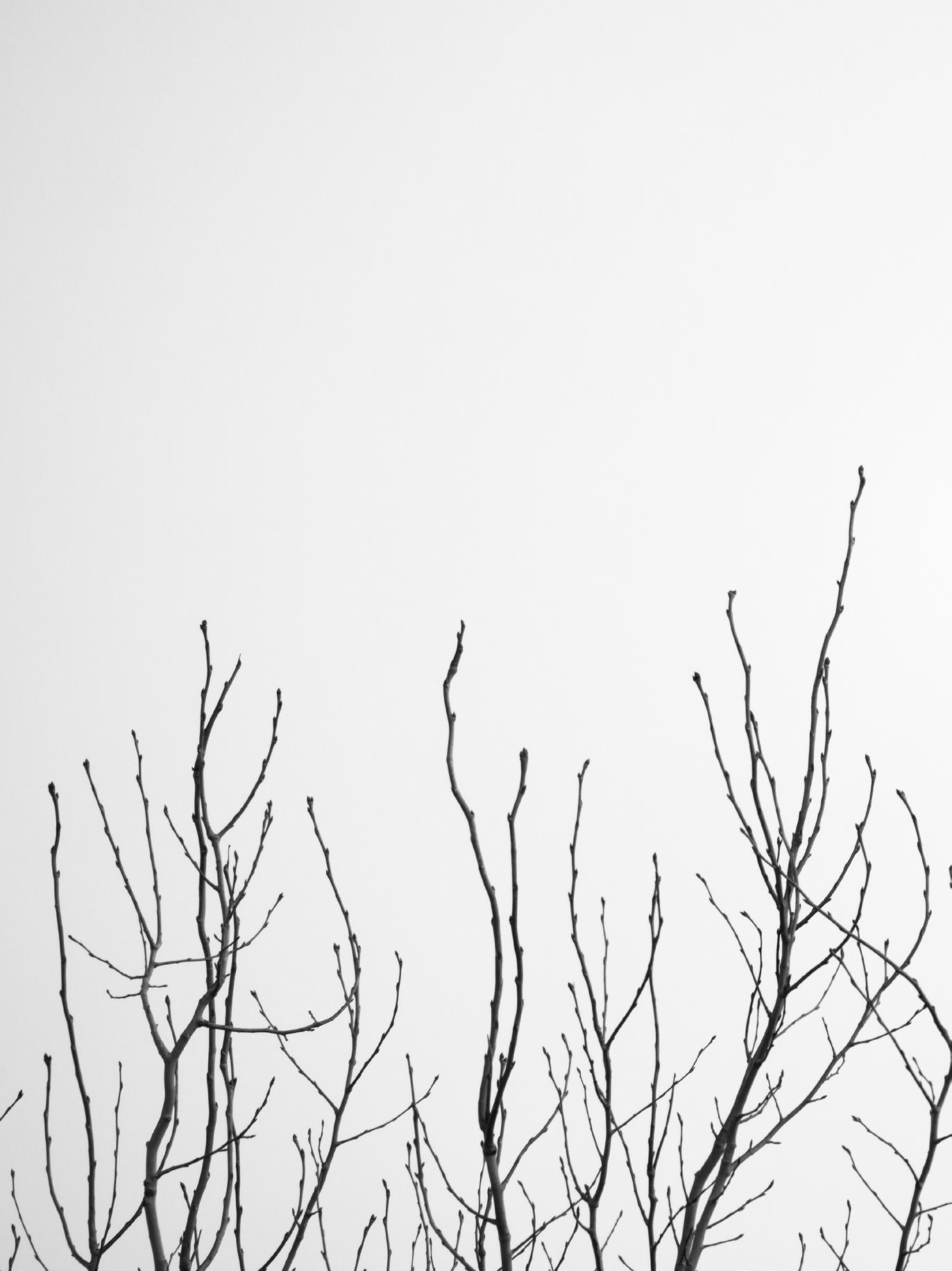
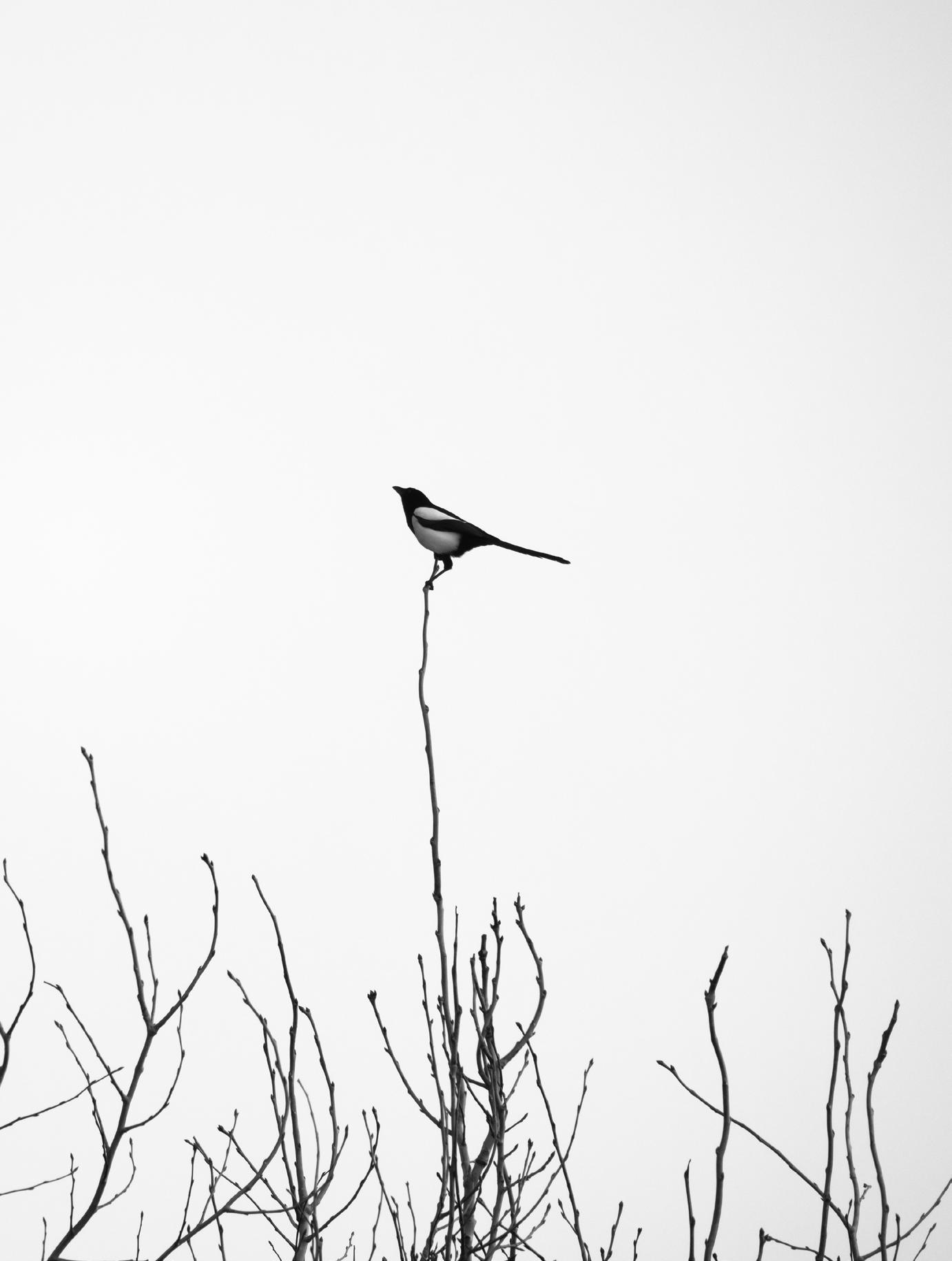
River Trent Bridie Squires
I mistake the sound of a fire engine for a waterfall.
A single magpie crosses my path for the fifth time this week.
My phone tries to turn my words into an emoji; I feel frustrated because I know what I am talking about.
A passing runner’s breath is deep and heavy. My sweat slowly gathers on the inside of a fresh jumper.
Faint voices chatter behind, talking about school and life and being big enough to manage all these things eventually.
When I die, I won’t be dead. I’ll be swimming in the pools of whisky on the Big Rock Candy Mountain, catching joke flipping bottles with Grandad, picking at a plate of salmon with Cleo, listening to the sparrows from Iremongers Pond in their migration chorus.
The purple flowers I don’t know the name of are blooming full today hanging over the edge of the concrete walls clinging to hope like springtime.


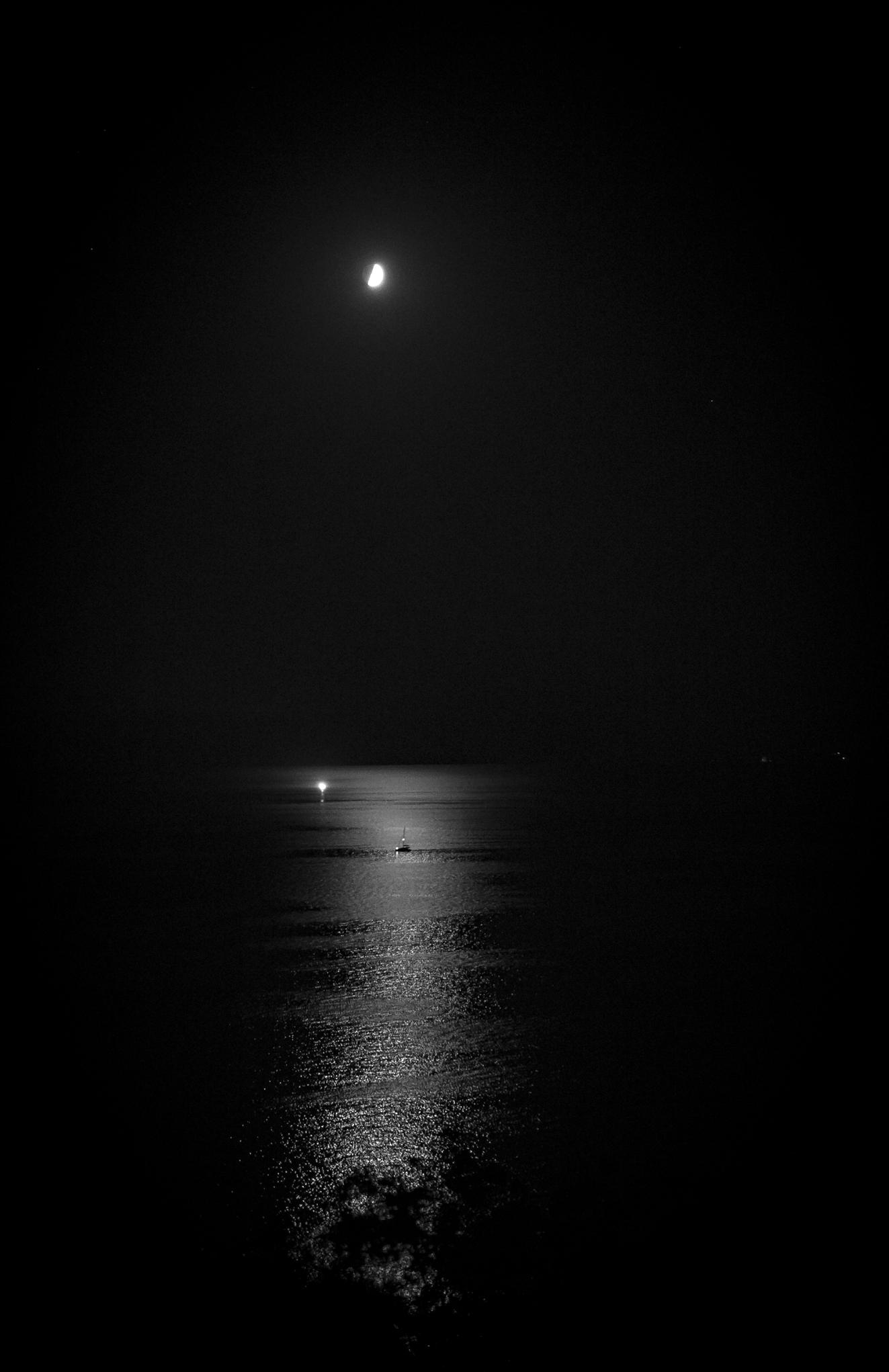
A Night on the Channel
Paul Liedvogel
Darkness fell upon the English Channel much as it had for as long as Sid remembered – slowly but without hesitation, black pulling down from the sky, pulling up from the sea, until the two merged, shyly, at an invisible horizon.
Yes, Sid thought, he would miss the nights on the Channel most of all; miss the trawlers solemnly drifting behind their searchlights; miss the glimmer of distant coasts like velvet stitching; miss the waves furiously, incessantly pounding against the ship’s steel carcass – he could guess at them now, looking down without seeing, far below, could sense them under the engine’s subtle vibrations, travelling through his legs and into his body and on to somewhere beyond.
He felt whole then, uniquely whole, and he would forget about an aching back or worn knees or the foul smell of scallops fresh off the Channel’s bed, the kind that you might never rid yourself of again.
Sid was sixty-six years old.
With a sharp whine, the winches atop the deck began to move, signalling the end of another towing cycle and, from out of the dark, the dredge appeared, water trailing its nets.
Sid tugged hard on the rope connecting to the dredge, the hemp burning hot underneath his gloves, steering the nets to where they would be emptied.
Soon, scallops flooded the deck and with them came that old familiar scent of sediment, and tang, and brackish waters, deep and without light – Sid often wondered about this place below, where the scallops fed and the Channel bore its secret scars.
He hunched down as the dredge circled away. He felt water enter his boots, and his gloved fingers dug into the scallops, shucking the shells, chucking the meat, the muscle,
through hatches into the ship’s hungry belly.
Fifty years, Sid thought, fifty years, and soon: no more.
But even as he thought it, even as his fingers worked through the scallops with the experience of a young man grown old, he could not imagine himself away from the trawlers, and the rain, and the cold, and the chilling clattering of scallop against scallop on the trawler’s open deck.
He did not truly believe ‘Sid’ existed away from the trawlers, and if he had voted one way or another in the past, then only because of the scallops, and the Channel, and the integrity of British waters, and he had nothing against immigrants, not he, but, o, the scallops!
The regular rhythm pulsing through Sid’s body, the crashing of waves and grinding of machinery, suddenly changed.
Sid looked up from the scallops and through the ship’s railing onto the darkly undulating sea. A cool breeze blew off the land that, tonight, lay invisibly in the far distance, spurring the waves – they began to lap against the side of the ship strangely and erratically.
Like something is drifting in our wake, Sid thought, like two waves running counter to each other.
He narrowed his eyes, concerned.
Then, he caught sight of the dinghy – it tottered on the edge of darkness, entering and exiting the world of the trawlers and scallops every other second. An onboard motor ran at the dinghy’s back, but it struggled in the trawler’s wake.
Figures huddled together on the dinghy; shadow and sluggish motion, and the blink of an eye in some rogue ray of light.
Sid called out to the other deckhands; the dinghy was pulled over the dark edge; somewhere up in the wheelhouse, a radio began to broadcast.
Listening to the radio’s crackle, to its waves bouncing off the night sky and deep Channel floor, travelling, travelling, travelling home, he felt, with certainty, this dinghy would not be found, would not arrive anywhere, and again his thoughts drifted, as by themselves, to that place below, where
the scallops fed. He closed his eyes, and in the dark he found the single eye still looking at him. It blinked – hopeful – then shut closed.
Tulip Thieves
Nathan Curnow
Touching tulips is a sadness
– Claire Miranda Roberts
Now all the garden’s overcome with dark the tulip thieves return, cursing themselves forever cultivating botanical doom. Like propellers through the flower beds, cows in the orchestra, they tramp at night, digging misery, strong-arming their haul of petals, vandalising for the glory of what they must deserve – sadness, as inevitable as war, suffering as self-cure.
To arrest themselves in wanting they choke the Orphean flame, sowing soil with absence –a tropism they can’t escape. They know frost in the morning means sun in the afternoon.
A hole freshly discovered is certain to be filled. Sabotage is never-ending as dip-darting microbats watch with ears, sound boarding plunder beneath the figs. The woe can be no winning, a stripped prize as their torches fade and they bundle back toward their cars before the traffic starts. At dawn they will remove their coats,
rest their spades beside the door, to mull again the broken cups. The stigma and the pistil.
*The first line of ‘Tulip Thieves’ comes directly from ‘Naming the Stars’, a poem written by Judith Wright in 1963.
Arecibo Observatory
Nathan Curnow
Because they were scared they put 10 million dollars into a karst sinkhole in the jungle.
They built a giant dish 1,000 feet-wide for tracking nukes in the ionosphere.
Cuba had happened, who could blame them? The eye stared up and out, its rim skirted by a teeming canopy –the coqui called and the coqui called back.
Meanwhile the stars in their bingo, the stars in their radio play, shone into the dish as the Gregorian dome rode the length of its azimuth rail.
They saw pulsars, asteroids, gravitational waves, ice on Mercury and mountains on Venus. They sent a message in binary that takes 25,000 years to reach whoever’s not there to read it.
Their fear chanced them upon an awe machine that stared past the threat they invented, into chaos, order and deep time until it snapped and the cathedral crumbled. The jungle was waiting, not waiting, not impatient for 50 years, its gravity dropping back into the hole, mealing on itself.
Now – the fruit bats, woodpeckers, the Wild Wist the mongoose and Emerald birds.
A diamond-eyed boa smells its long way out on a branch above the broken rim, its magnificence snaking the dense air, reaching a long, dead end.
It nests in concentric knowledge, folded like space and time. The coqui call. ‘Co’ is a warning, the ‘Kee’ means the call goes on.
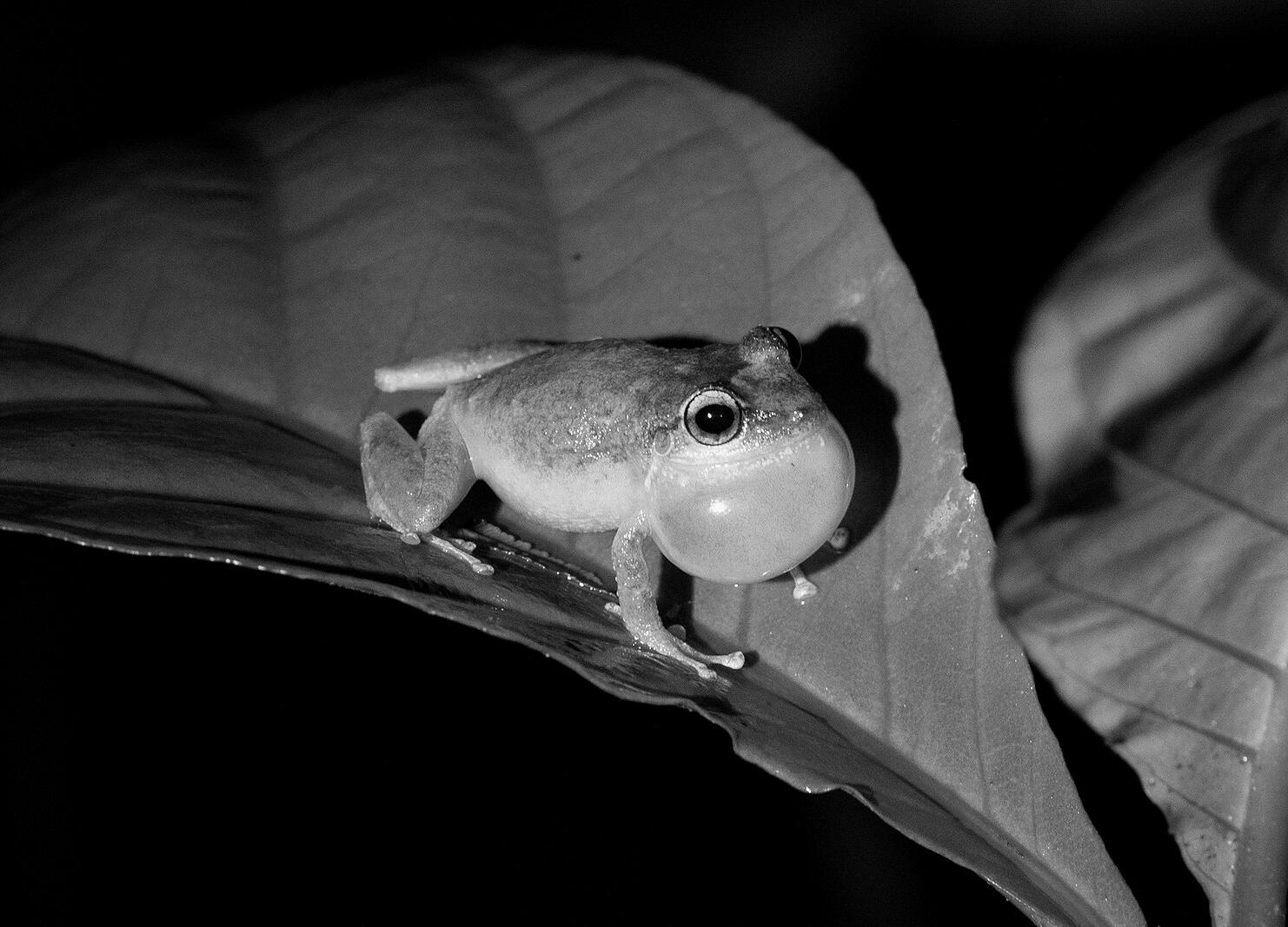
The Dream Audit
Andrew Tucker Leavis
David Pashton MP had posted something overnight which –to judge by the panicked apology now pinned to his timeline – he firmly insisted he had not written.
‘Hacked,’ the note said. ‘Appalling content. Not me at all. Deeply sorry.’
He sat in the conservatory watching his favourite robin in the birdbath, waiting sombrely for the call from Comms.
‘Which final straw is this?’ said the spin doctor, when the call arrived.
‘Fourth or fifth, I should think,’ said David, ‘though for once, I wasn’t actually conscious.’
‘When are you conscious?’ said the spin doctor. ‘The trouble is, they believe it’s the sort of thing you’d think. And, in a way, they’re not wrong.’
‘But I don’t think it,’ said David, helplessly. National Scandal was towering over him: he felt like a man starting to towel-dry a shipwreck.
‘Can I remind you that this is exactly what we’ve been trying not to do?’
‘I know it is. I’m aware, so go on then. Throw me your life jacket.’
There followed a cough, dry and procedural.
‘We’ll need to prove you don’t have unconscious bias. The Danish Social Democrats are doing this thing — it’s clever and Nordic. It’s called dream auditing.’
‘Very funny!’
‘No. Earclips arrive Monday. You wear them at night and they analyse your dreams for unconscious bias. Transparency is how we do things. That’s very us.’
‘Hmm.’
‘Not very you, but there we are.’
The earclips did arrive on the Monday, in a tightly sealed box. They were amniotic white, faintly anatomical, like cockle shells or something dredged from the seabed. David read the instruction booklet in English, then French for good measure. They would, he was informed, analyse both his theta and delta waves, and crossreference any troubling patterns found therein against the National Intolerance Database. It all seemed fairly kosher.
‘Very dashing,’ said Barbara drolly, as he checked in the bathroom mirror that they were properly affixed.
‘They’re cutting-edge.’
‘So were lobotomies,’ she said, ‘once upon a time.’
Blameful phone calls had wearied him. He sat on the bed and glimpsed a memory of his hand resting on Tony Benn’s shoulder at the Hucknall Men’s Club, the air hot with embassy smoke. The fight had escaped him. He rationed two glasses of Château Pontet-Canet for himself and fell into a blameless sleep.
In the morning he forgot to take the clips off until he caught his reflection in the gleam of the Guardian homepage.
‘OPINION: Pashton apologised. The problem is, the left heard him the first time.’
News of his blunder had billowed outwards and upwards, and he was now being condemned to a kitchen-based exile. He digested the thinkpiece, then replied at length to a constituent who was convinced of alien life in Basingstoke. Both matters remained unresolved.
His secretary turned down most interviews, but he was finally sold on ‘Good Morning With E. J. Velassi’.
‘Mr. Pashton,’ said the quiffed presenter, ‘just last week you said you were “proud to represent one of the most progressive constituencies in the Midlands.” Is there a sense that you’re letting your voters down?’
‘Only in that I didn’t set a strong enough password. I shouldn’t have put my birthday in it, I’ll give you that. As you can tell by my birthday, I’m old enough to have known better.’

Photo by Claudio Arnese
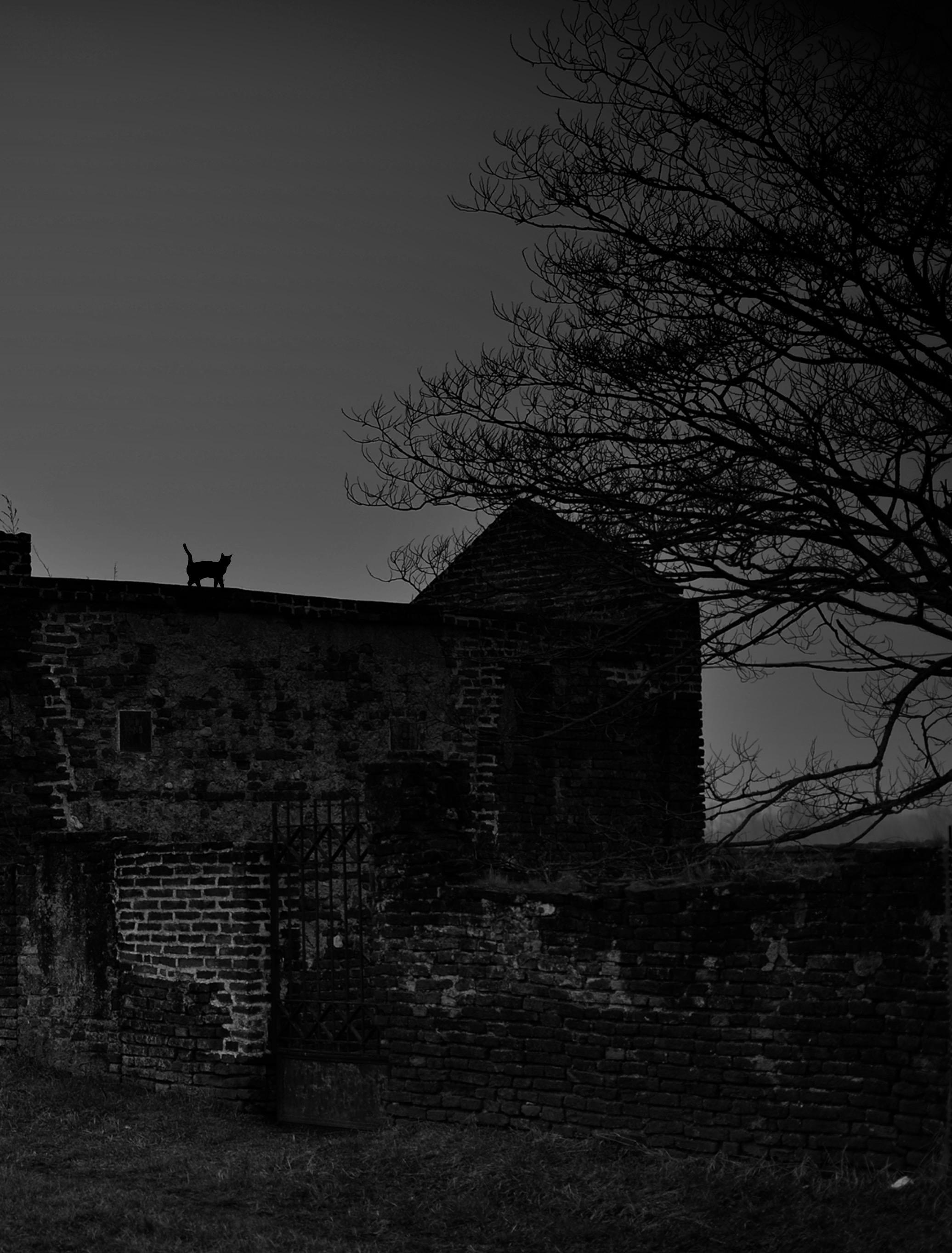
Afterwards, David scratched the make-up out of his jowls. He had joined the movement in his teens to strip the smug look off the face of his piano teacher…well, there had been some other impulse. Where was it? He took a taxi from the studio; the radio station was in Arabic; his shoulders felt heavy.
But the white earclips were weightless. They played music to him, his daughter’s recording of the Goldberg Variations. He wore the earclips every night for a week. Whatever dreams they appraised – like the vivid image of his father watching him on television through his binoculars – were, by morning, forgotten.
On Sunday, David was in the conservatory again, sitting in his handwoven wicker chair, when the dog started barking at the front door. He put down the Sudoku compendium, walked through the hallway and grabbed the cockapoo’s collar with a penitentiary grip.
A striking man stood in the rain which was falling upon the doorstep. He had a clean buzzcut and an off-the-rack suit worn over a white T-shirt with a picture of a turtle in the centre. Straightening his cuffs, the man smiled at the crusading snout poking through the door.
‘Sorry,’ said David, gesturing dogwards, ‘she doesn’t know what to make of strangers.’
‘No worries at all. My name’s Adam,’ said the person in the cheap suit, ‘I’m the dream auditor.’
‘Oh come in, come in.’
David led the auditor past the landscape paintings to the conservatory, where he offered his guest a lemon balm tea and the broad rustic panorama.
‘I’m from nearby,’ said Adam, ‘Barnby, actually.’
‘What a dairy they have there,’ David replied, ‘And I like the farm shop. With the honesty box.’
‘It has its moments. I don’t come back often.’
The kettle boiled and they watched the robin submerge itself partially. Adam extracted a white laptop from his bag
and rested it on his knees. Then another device emerged, an aluminium cradle which the auditor plugged into the wall.
‘Right-o,’ said David haltingly, ‘what do you need from me?’
‘I can take a reading from the clips,’ said Adam, scratching a cheekbone, ‘and your neural responses will do some ballet with our bias-weighted interpretive model. Then I’ll compile some early data to give you an impression. Won’t take a minute, then you’ll be in the “tofu-eating wokerati” with us again, in no time.’
David gave a shielding smile. He took the box, which seemed heavier than before, from the mantelpiece, then handed the white earclips to the auditor and returned to his chair.
‘And so you have my soul to weigh,” said David with mock portent, ‘omnia mea mecum porto. Now who said that? I can’t remember,’ He sat and rapped two fingers on the wicker. Adam’s fingers rapped too on the laptop keys. In the kitchen, the dog was coughing.
‘Have you ever taken your own medicine then, Adam?’ said David, ‘Your dreams are audited, I suppose?’
‘I guess it’d be hypocritical not to,’ Adam blinked heavily.
Outside, the pigeons had returned to the fence, assessing the favoured robin in the birdbath.
‘And just what form of report should I expect? A slideshow? Interpretive dance?’
‘I mean, there are a range of output displays. You can get as granular as you like with it. It’s modelling your nighttime activity now.’
‘I have to confess some scepticism on my part,’ said David, ‘though I’ve been sleeping as well as ever – or better.’
‘Good. We’d always try to be non-invasive.’
‘Although I’m still damned if I know how what you’re doing is of any use.’
‘My job is to provide your employer,’ said Adam, now looking up at David over the laptop, ‘with a professional opinion as to whether you have an unconscious bias against a marginalised group. It’s not a trivial thing to do. That was
a hell of a tweet from someone on our side.’
Two more pigeons flew down from the roof. David took an alleviating sip of hibiscus and let the powerlessness wash over him for a minute.
‘Marginalised,’ said the MP, ‘is a funny word, isn’t it. It seems that you read about the marginalised all the time. So then it seems that the margins are actually in the middle of everything…’
‘Should we not be?’ said Adam, with a studied neutrality, resting his right hand briefly on the breast of his suit jacket.
The pigeons were now crowding the birdbath, eating all the food that David had thrown.
‘You see, I didn’t quite mean…’
David noticed again the screenprint on Adam’s shirt, and the auditor saw. He pinched a switch on the cradle, then pulled his blazer to one side and pointed to the image of the turtle swimming.
‘Have you heard of Urashima Tarō?’ said Adam.
‘No. Is he on the bench at Chelsea?’
‘He’s a Japanese fisherman, from mythology,’ said Adam. ‘A hero who goes to save a sea turtle. And his reward for this is a box of forbidden jewels.’
Harried by the larger birds, the robin flew up to the fence.
‘...when Urashima opens the box of jewels, there’s a catch, of course: he turns instantly into an old man. Then the story ends very suddenly.’
‘I like those lessons in being humble,’ the young auditor continued, his head turning towards the subject of his study, ‘you see them across all cultures. That’s always a struggle I have; knowing when to keep the box closed.’
In his mind David saw his father beating his fist at the Trade Union Conference. He had fought four elections to be remonstrated like a child, by a child.
Two of the pigeons spread their wings and tussled with each other. The robin had seen enough – it took off from the fence back into the sky.
Then the MP, red in the face, got up swiftly and walked
to the French window, sliding it open with such gusto that it set the dog off barking in the next room.
‘Damn pigeons! You’ve scared him off again.’ He clapped twice and the grey birds fled. ‘Of course, I shouldn’t say damn, Adam. I oughtn’t be insensitive to those who’ve had their souls condemned.’
Adam tilted the laptop lid down. ‘Everybody’s read your message, David. Our one selling point is that we’re supposed to be better than them. Do you know how long it took me to get out of a place like this?’
‘This village is quite lovely.’
‘Yes, well, people said things like your tweet to me. Every day of the week, people I knew. It made me sick to read it. And here I am again: on the cusp of the technological singularity, dragged out into the fucking countryside.’
‘It was a hack,’ said David, ‘I didn’t write anything.’
‘Nobody does! “It was an AI forgery, an impressionist from Channel 4.” That doesn’t mean shit,’ said Adam, ‘because people believe that you wrote it. And what do you think that says about you?’
A noise of breezy completion came from the laptop’s speaker. David felt himself coursing with the adrenaline he’d had as a younger man, when he’d gone against the whip on Iraq.
‘And suppose I had written it, Adam. You’re young; I’m not. We built this country on turn-the-other-cheek. You say “we” with your hand to your heart, but so do I. We were gentle, but we could stand to hear words we disliked. There was a place for you, even with your background. There was a place for everyone. Was there not?’
David’s throat was tight. Adam’s face settled in sober triumph.
‘Except – no place for me it seems, and it does seem like I’m old news and that I’m on the way out. All of this is on the way out. And I didn’t tweet it, but people believe that I would, and that’s because it’s true – that I don’t see anything wrong with saying it. There wouldn’t have been, twenty years
ago, or even ten. And you’re going to end my career, aren’t you, because this me, me, me-too tedium crept up on this party, and I was surrounded in the night. Goodbye, David Pashton.’
He sat down. He had opened the box and he was ancient now. There was a pause, in which both of them felt the cold air drawn in from the open window. A moment fell upon the room: of gentle understanding, in which they watched over one another, father and son after a row. The wind stirred the garden grass and the silence became softly-marked with foreboding, with fingerprints on a guillotine. The birdbath was empty.
‘Out with it then, Adam,’ said David, finally. ‘Give me the verdict.’
Difficult rainbows filled the screen: measurements and opaque readouts. Adam studied these entrails, consulted his professional expertise, then closed the lid softly.
‘Oh, David. I can’t tell you. But the party will be in touch.’
Cash for Bombs
Nicholas Hogg
The Army offered cash for bombs in Kandahar, buying up rockets and rounds from the locals, the anti-tank missile
Made in Britain, gleaming off the line in Bolton. Once the venture had launched, an old man came to the base with a fire extinguisher painted green. The guard tapped the casing with his gun, the cardboard fins glued to the metal. Good bomb, said the man, plying his wares. Very big bang. The squaddie at the gate got nervous, feathering a trigger. The man smiled. How many Dollar? The guard laughed. Bring us a real one first, mate. They waved him away with a muzzle, watching as he walked down the hill. Fucking chancer, said the lad from Bath. Two days later on patrol, the ordinance buried in the road, beneath the armour-plated chassis. The inch-thick steel that would rip like tin.
Torvill and Dean Nicholas Hogg
Jane Torvill and Christopher Dean are not married, explains my mother, as they stand on the ice together. She talks and cooks, peels back the lid from a tin of sardines. The telly glows. My father eats dinner at another house.
When they kneel, and the Bolero plays, Jane circles Christopher, a centrifuge in lilac. Their sleeves begin to ripple, like wings in flight, and Jane, like a chiffon scarf, wraps her body around his chest.
Yet she is the one in control, even when she is held above the cold hard rink, as they lean into the dance, and into each other, attaining something (I am told) more lasting and precious than love.
Satellite
Nicholas Hogg
I was skipping down a rock like a goat in Nike, when I stepped off a drop into clear blue space. I waited for the fall, for the sound of bones that snap like cane. I saw the Old Town frieze, the chock-a-block streets now hushed and still. As if I had time enough left for a look towards the peak. Sitting in the air like a man might read in a wingback chair. Flying in a poem on a page. Not smashing into shale that broke like glass, crashing on a hill like a drunk. Before I got up dazed and held my head. Baffled by it all. The position of feet and sky.
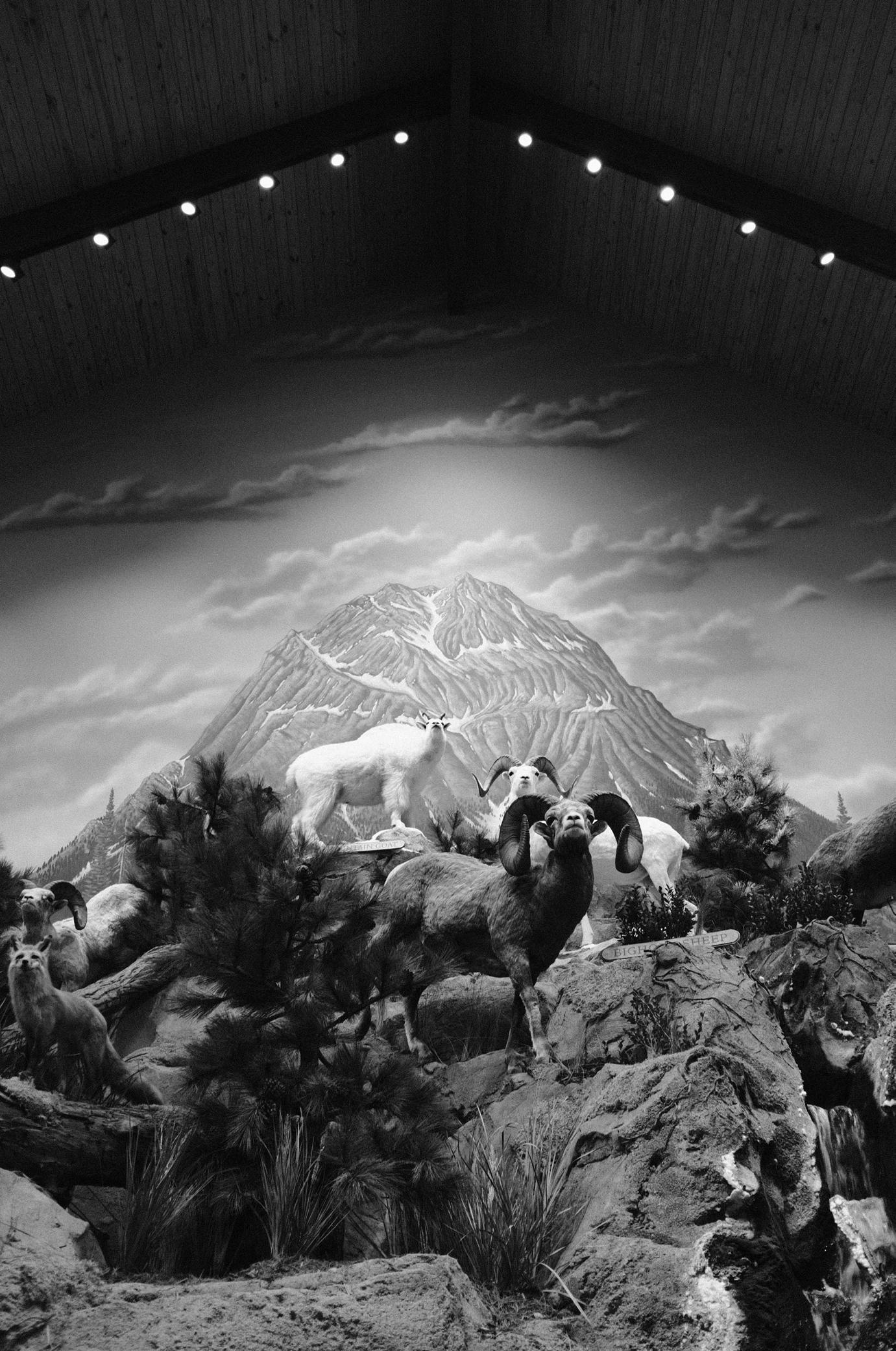
Photo by Ashley Gallant
And Still, the Sun Shines
Jib Tran
It is 1972. You’re a boy, eight years old, in Saigon, Vietnam. Your mom carts food to the city’s markets, her back stronger than anyone anything else. She is Atlas. But instead of stars, she holds up rice cakes – just as hot, if not hotter.
Your siblings (seven of them) scurry to find work, jumping onto diplomats’ cars, trying to wash them, being thrown candy and spare change. The Americans have the faces of panicked hikers, tossing meat at wild animals before escaping, a twinge of disgusted sympathy towards the desperation.
1973. Your mom takes you out of the city, away from the river and the sea of motorbikes. Their exhausts sputter goodbye. They are all you have known. Your family moved south before the war, before you were born.
You see a man outside the bus, clutching his chest, shirt rusted brown and black. He heaves in the hot sun.
You’re at the temple now. The people cluster around the entrance before the service, their quietness striking you. The Buddha statue smiles, looking over the mountain which the temple sits on. Stone stairs leading up.
Its path is known by orphans seeking a home.
The people begin moving now. You feel your mom’s hand in yours, squeezing softly, helping you follow. A shrine catches your attention. Its framed pictures hold monks and people like you, all looking forward, calm and resolute. There’s something sad in their eyes though, as if they were asking how they died.
The tails of incense sticks rest in ash bowls, like abandoned flagpoles, long burnt. The photos are from a time before yours, a time of protest, of people setting themselves on fire, of government cruelty. It was ten years ago, that day. There are still candles for them, alight.
You leave the temple, a wood-carved Buddha in-hand. Your mom tells you not to lose it.
1974. You are ten now. Your brother teaches you how to cross the city’s river, without a boat. You and his friends gather at the shallow concrete bank, the narrowest part you can find. There is a hesitancy that’s shoved down as you jump and wade across the water, murky drops splashing off you, tickling your face.
For this moment, you can fight against the force that’s always been pulling you down. Here it was, this whole time. It was Saigon River that kept you up at night. It was its lapping that crept into your bed, reminding you of your panging hunger. Its tides are where your friends disappeared. Its waves – black blankets – swaddled them all, lulling them to sleep.
You look back at your brother, having crossed on your own. You smile, sharing an experience you’ll never tell your parents.
He and his friends cross easily – except for one. One girl is too tired, announcing to her feet that she should ‘probably’ go home.
Your brother gets an idea and wades back, making sure to roll up his pants even more. He whispers something to her before hoisting her onto his shoulders, acting like he’s done this before.
Everyone cheers as the two step into the water. It looks like a scene from ‘I Love Lucy’, at least the episode you’ve seen through the neighbor’s window. Your brother is laughing effortfully, surprised by himself, determined not to leave her behind. She is yelling at him not to drop her, swearing that all sorts of things would happen if he did. His friends cry out: ‘lover boy’.
For some reason, your face gets flushed with embarrassment. That is when you learn that his fondness would always outweigh his strength, every time. It starts with the buckling of one leg and ends with a foot losing purchase, feet slipping on slimy rock.
There is a moment where her eyes grow wide. Your broth-
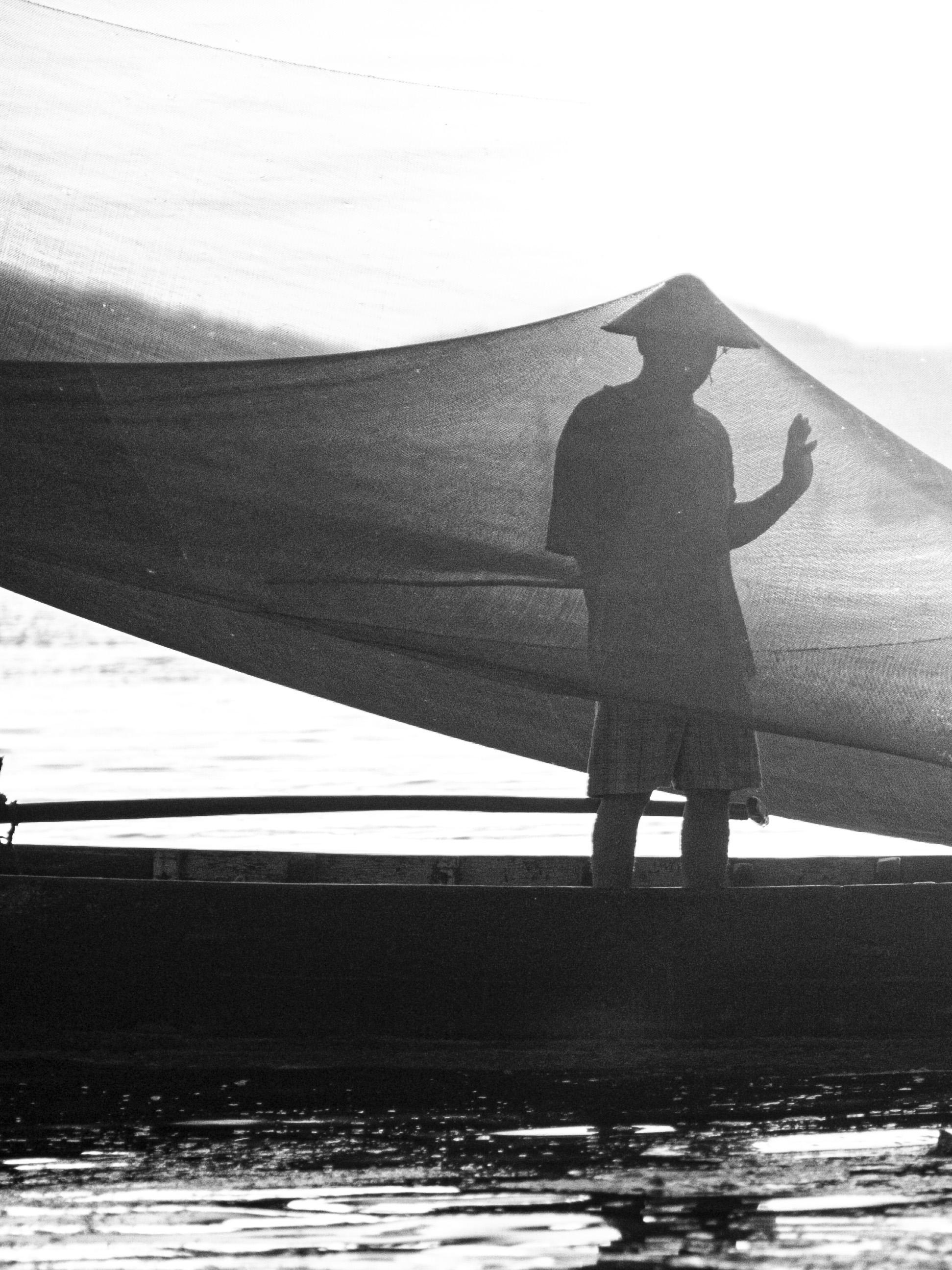
Photo by Qui Thinh Tran
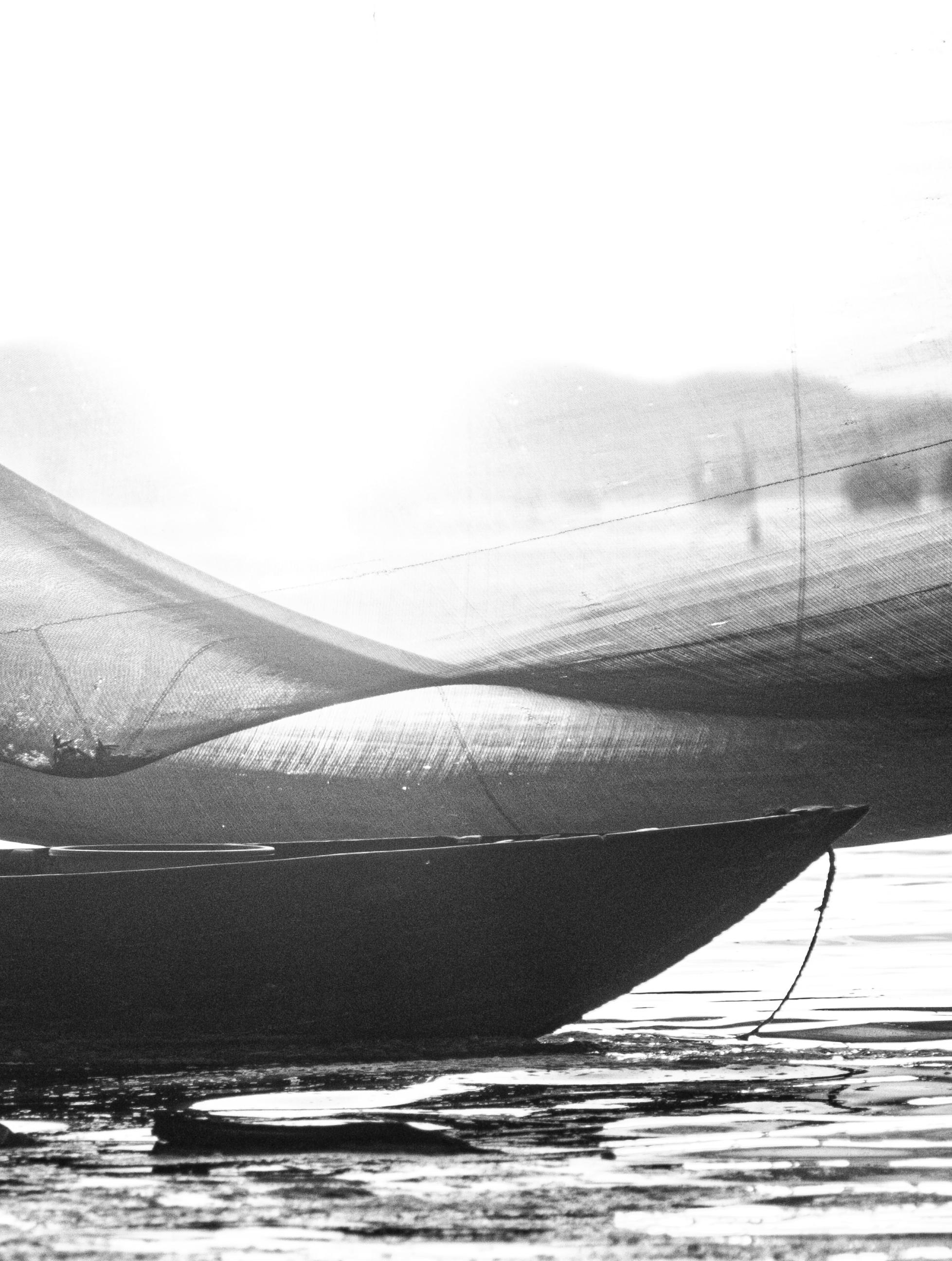
er’s mouth can’t react quickly enough – it’s wide open as face-plants into the river, like he’s going in for a taste.
His friends can’t hold it back anymore, percussive laughs escaping from them. You cry with laughter, too, the tears and breath like hot steam, like you were boiling for so long without knowing it. You finally let go. Falling back. It is time to shoot your steam into the sky, like a bonfire signaling for help that you’re still there. The moment is too good not to savour.
Your brother and the girl rise from the water, their shirtsleeves clinging like folded wings.
Later you help him discreetly dry his clothes.
1975. February. You find, in the new year, a job at the bike shop, fixing numerous rusty wheels, performing miracles to make them spin.
Your hands are marked with black tread – lace-like stamps.
You’re slowly becoming the road below you. You know it, but you feel like you can outrun it. You have to.
March. The dogs run away. You left the door open, and it’s your fault. Your dad’s never beaten you before, but you’re scared.
He doesn’t. He seems more sad than anything. You wonder if he wishes the family ran away with them, to some island past Saigon’s docks.
April. There is talk of annihilation. Surely it wouldn’t end like this, they all say, eyes lacking conviction.
You see – on your way back home – a throng of people, grabbing onto the American embassy, fingers sticking through metal fence. They start climbing onto each other, reaching and reaching. Their tears stream down, like rain through canopy. Their hands don’t stop extending upwards, vines reaching towards fading light, not quite believing what they’re seeing.
‘They’ll kill us. They’ll kill us,’ they scream.
The helicopters take off without notice, great buzzards
into the horizon. You don’t understand.
April 30. It is 4 A.M. You feel the explosions. It felt like the air itself was shaking, gripping onto the buildings.
You were asleep with your family, all of you in the usual room. It feels like you’re all crabs, nestled together in a sandy den, booming waves above, just waiting for a hand to break through and snatch one of you.
You all hold on tightly.
Later, you will see the tanks roll through the city. You will see the men marching alongside. They will remind you of your father in photos – the younger him. They could be distant relatives. You won’t know what to do but look, your face raw like it’s been smacked. Your eyes will burn images into your mind’s film, creating negatives that leave impressions on every image that follows.
You will see some of the local men being taken away, some bloodied and bruised.
For now, you hold on. You feel the breathing in the room, your family. You find your wooden Buddha pendant in your hand. You rub it with your fingers and squeeze.
You don’t let go.
Library Tickets
Henry Normal
The very first official papers I remember owning with my name on it were my library tickets
I was five and they were pink and more than anything each ticket was a certificate for self determination
I could choose
Where I wanted my imagination to go
Who I wanted to journey with How fast I wanted to travel
What I wanted to learn and When I wanted to change direction
I could choose.
Not my teachers
Not my parents
Not a politician
The five year old me.
As I grew older I graduated to green tickets –Like Certificates of Adulthood
Each ticket a licence to explore And I could now read any book in the library
Any book I wanted to read
Later, of course, I found I had other official paperwork I had a birth certificate that confirmed who I was I obtained a driving licence that confirmed who I was
And I obtained a passport that confirmed who I was
But the library tickets were special They were a passport to who I could be
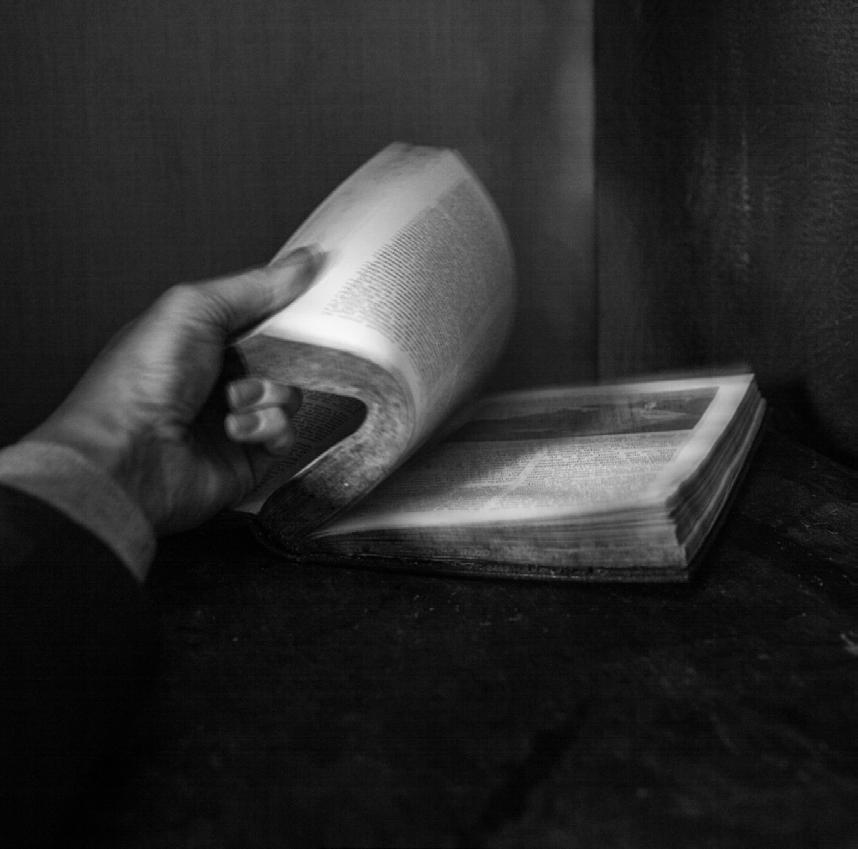
Photo by Nicola Davison Reed
Making Potholes into Poet Holes
Henry Normal
Will councils compound Pound to save pounds?
Slash cash with Ogden Nash?
Level Larkin for level parkin’?
Landfill Lord Tennyson like trash?
Will they fill the floor with Evelyn Waugh?
Elliot and Auden and many more?
Combine Rupi Kaur with Hardy to invent Rupi Hardcore?
On motorways Wordsworth’s literary wealth will they lay, with poets even older? And to the side, Shakespeare himself on what they may call the ‘Bard Shoulder’?
Are wheels in motion for wheels over Andrew Motion?
Will they bury Berryman before they’re Donne?
Will we see more ridges over Robert Seymour Bridges? Your tyre on Lord Byron for fun?
Will Concrete Poetry in craters creep?
John Bitumen everywhere you see?
With my books in a dip particularly deep to reflect my poetry?
Carlton Rd. Library in the 1960s
Henry Normal
It was just round the corner from our house –but a million miles away.
The first time I went in my legs weren’t that much longer than my short trousers
It was like a church quiet and atmospheric or a bank respectful and businesslike or a school formal but friendly
It was huge and clean and ordered and it smelt of books and polish
And I felt I needed to be on my best behaviour with clean hands and shirt tucked in I needed to live up to this building And each time I went in I grew taller And taller And taller
The Portal Henry
Normal
Once inside the library doors I escaped and changed and travelled through time and space all at the turn of a page
Met kings and prisoners heroes and villains wise men and fools giants and those forgotten
I explored the remotest peaks discovered hidden deserts the bottom of the deepest sea and the moons of imagined planets
I became an animal, an insect a bird, a spirit, an alien a creature long dead and a creature yet to be born
I flew and leapt and dived and swam and cried and laughed and loved and felt love in return
I learnt from a million minds the lessons of a million lives and of those who died a million times to save these worlds for you.
The Dinner Party of the Greatest Writers Ever to Have Lived –
Griffin Gudaitis
– was a total disaster. For various reasons, ninety-nine percent of the guests failed to make an appearance. Dickinson, Melville, and McCarthy, among many others, ignored their invitations. Fitzgerald, drunkenly swerving through traffic around the Place de l’Étoile, crashed the yellow Rolls-Royce head-on into the Arc de Triomphe. As the ambulance arrived, Fitzgerald’s passenger, Papa Hemingway, threw a lazy jab at the first responder. She then knocked Hemingway out cold with a flying knee to the face, bringing his semi-professional boxing career to zero wins, two defeats.
As this unfolded within earshot of a nearby salon, Marcel Proust was sound asleep and about to peek at the deepest level of R.E.M. until he awoke in time for his midnight snack: one madeleine cookie. At the teeniest nibble, the cookie transported him back to the garden of his childhood villa in Combray. Snuggling under lavender bedsheets, he opened his leather-bound notebook and wrote, Longtemps, je me suis couché de bonne heure.
Only one writer of all those invited declined by post. The letter’s salutation and body were in blocky capital letters whilst the end note featured a childish doodle of a beaknosed, curly haired, mustachioed man and his indecipherable signature. ‘Running 60 years late for a tea party in Dresden. Sorry!’
Be that as it may, most of the invitations were never mailed at all. They were lost, stolen, or traded for packs of unfiltered cigarettes and cheap red wine by their mailman, Charles
Bukowski. It all began somewhere in the old city of Athens – or was it Istanbul? – that Bukowski was in his mailvan bumping along the cobblestone roads in search of Homer. Our mailman’s inability to locate Homer quickly grew into an existential nausée that burned to the very core of his soul.
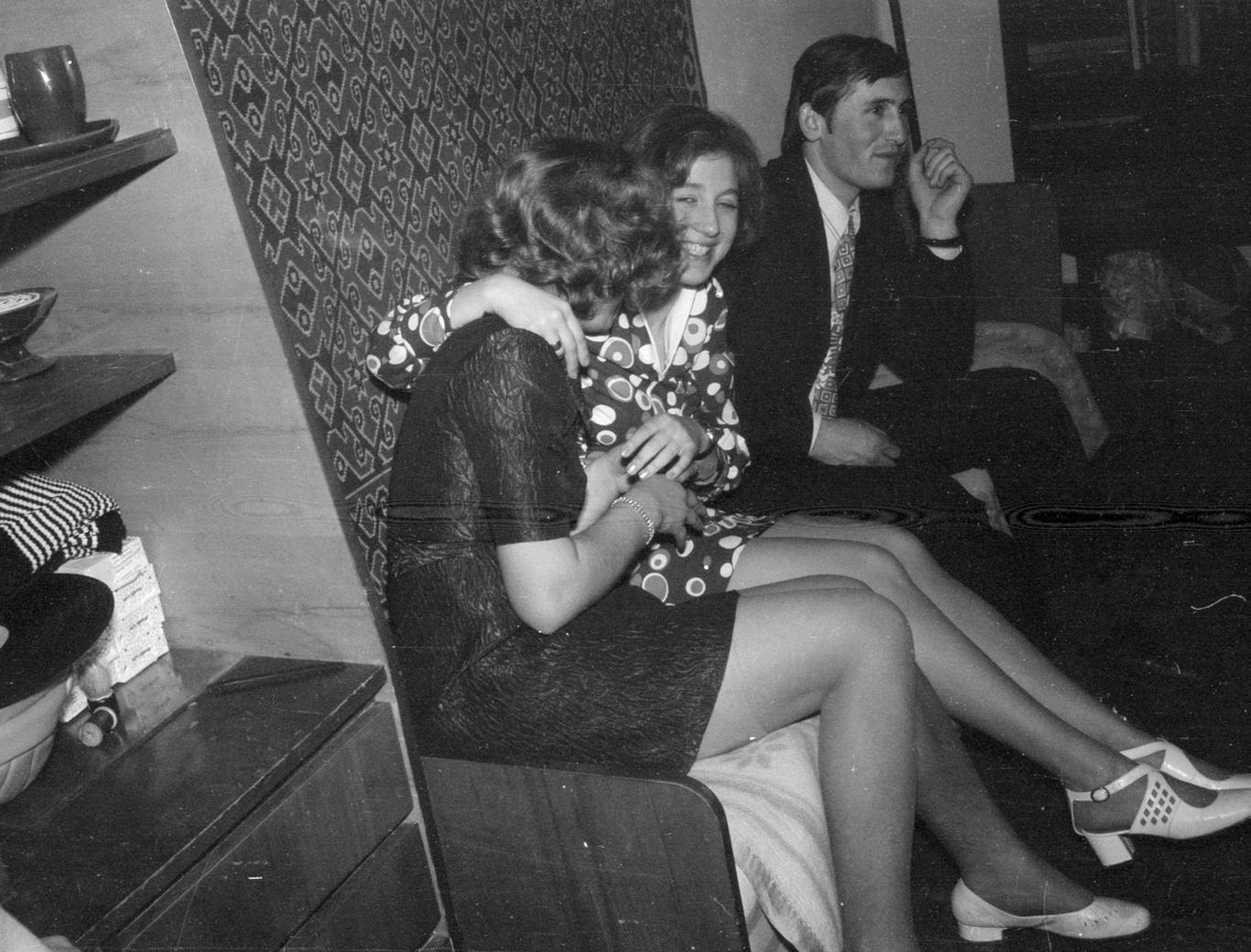
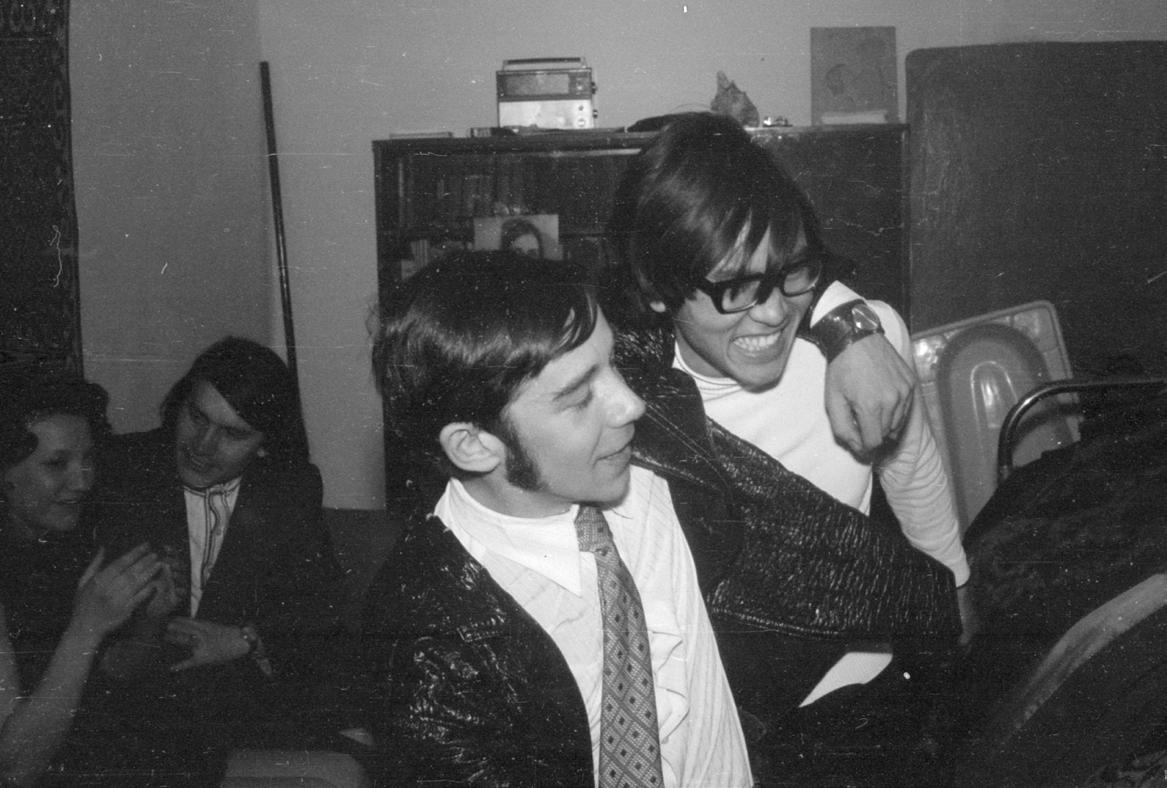
Photos by Vyacheslav Argenberg
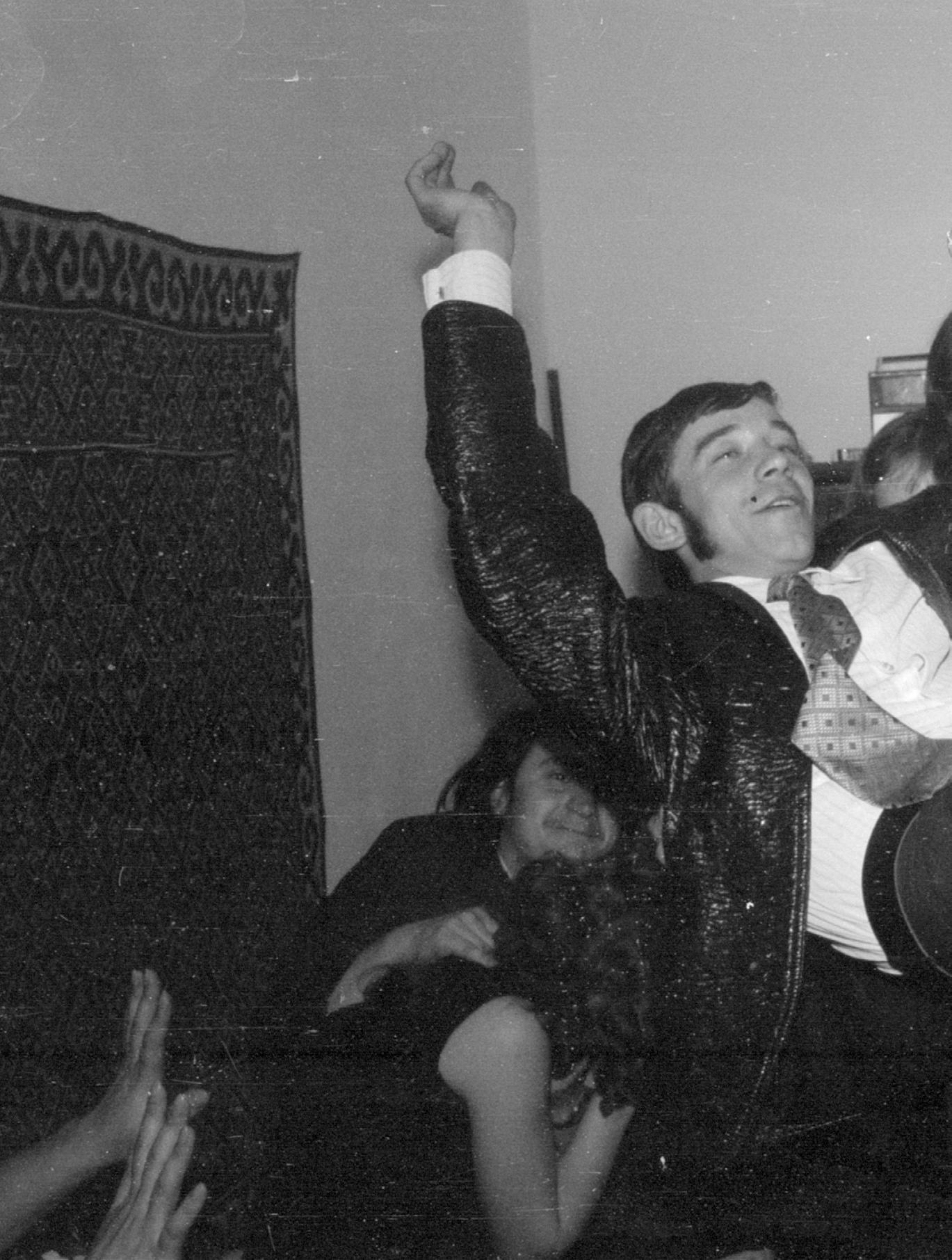
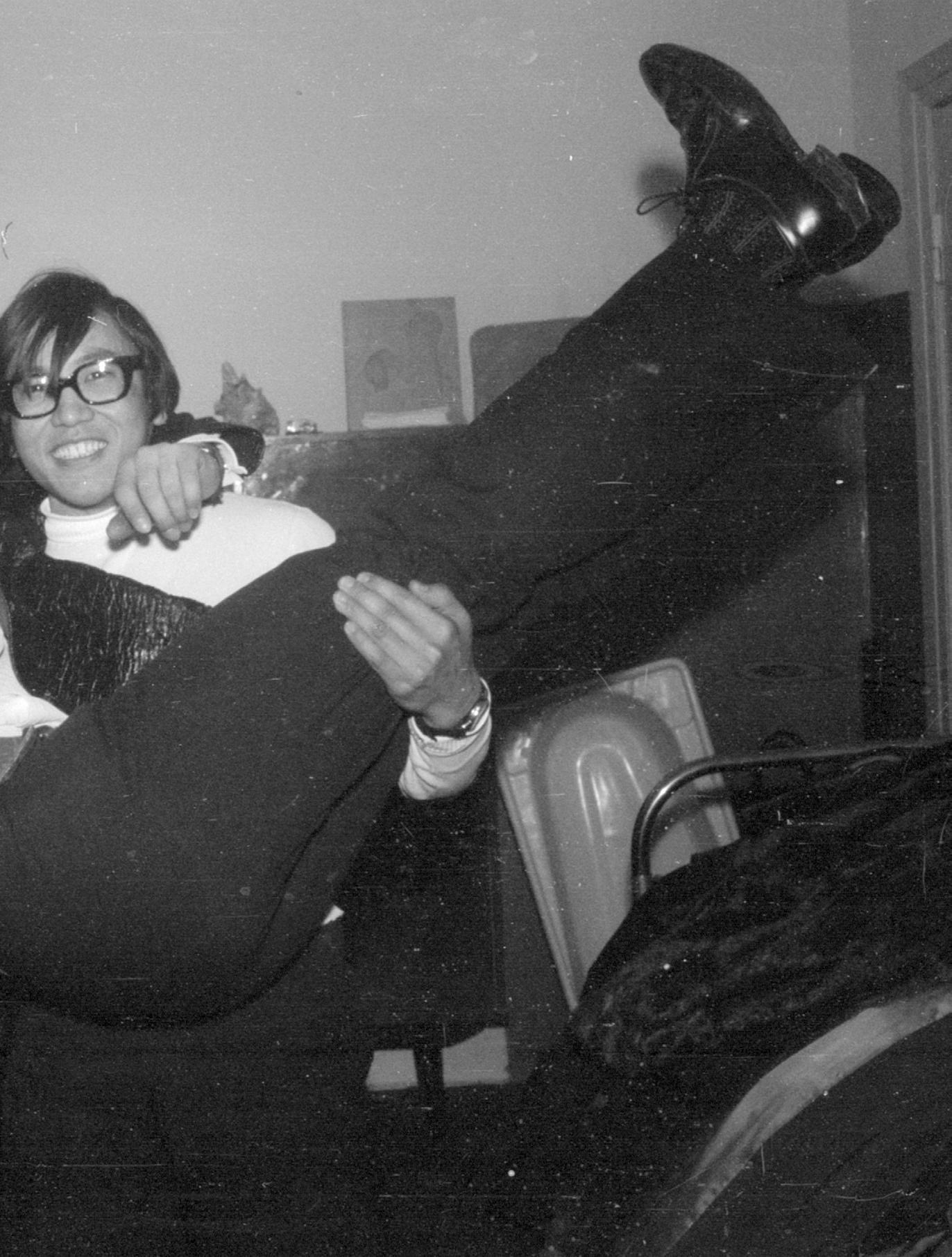
He could be cured by only one moveable feast: drinking and whoring. The next morning, Bukowski awoke with a head-splitting hangover in a brothel. His clothes, wallet, mailbag, car keys, and also the mail van itself had vanished into thin air.
For the one percent of guests who attended the party, the night consisted of reading, writing, and screaming. After one glass of sherry, William Blake stripped off his waistcoat and frilled stock until he was glistening naked. He then cheerily skipped around the party with his great flaccidness bouncing, proclaiming: ‘Milton was secretly of the devil’s party without knowing it!’ Milton stared out at the dismal scene from the darkest, lowest, most evil corner that Travelodge could offer. His amanuensis snapped her fingers in front of his cloudy, unblinking eyes. ‘Dad,’ she said. ‘Blink if you’re still breathing.’
Murmurs, whispers, and gossip abounded until the first course of the evening was served. White-gloved hands suddenly appeared suspended in mid-air, brandishing silver trays that gleamed against the blue flickering flames of the candelabrum. Dostoevsky stooped over and clutched his stomach. ‘I am a sick man,’ he groaned. ‘I am a spiteful man.’ Suddenly, his eyes rolled to the back of his head when a floating gloved hand offered him a salmon tartare cucumber bite. Murakami locked eyes with the youngest of the Brontë sisters whilst he ate a paprika-sprinkled deviled egg. He circled a yolk-stained pinky around his nipples. ‘Do you ever touch yourself like this?’
Jane Austen glared at Murakami with an expression of utter contempt. Throughout the first and second courses of the evening, she had shooed away unsolicited dance partners – primarily the French existentialists, Albert Camus and Jean-Paul Sartre – but the one man she took a genuine interest in showed no interest back: Oscar Wilde, who insisted on maintaining a comfortable distance of three metres apart. Austen did manage to coerce Wilde into accepting an invitation to their own, private dinner party of the greatest
writers ever to have lived sometime in the distant future. Finally, the main course was served. A flock of whitegloved hands placed a stainless-steel cloche in the middle of the banquet table. One hand unsheathed the dome cover. It was a deep-fried beetle! Large amongst beetle-kind, he measured nearly two metres from the tips of his antennae to the forks of his feet. Ominously, his long hairy legs were contorted into a fixed position of endless pain, as though he had been dropped into a vat of acid whilst still alive. Bursting through the front door, Gabriel García Márquez clutched his knees gasping, ‘Has anyone seen Kafka? I can’t find him anywhere.’
Chaos ensued, and madness reigned. ‘Say thy peace!’ Shakespeare screamed. As Travelodge lacked a thrust stage, the banquet table must suffice. Marching over the plates, he cried, ‘Life’s but a walking shadow, a poor player that struts and frets his hour on–up–up–on…’ Forgetting his next lines, Shakespeare kicked over a bottle of wine, which exploded in a blood-red spray over Tom Clancy.
Just then, MI6 officers fast-roped down from helicopters, crashed through the windowed ceiling, and locked Hunter S. Thompson in handcuffs. On his person alone were seventy-five pellets of mescaline, five sheets of high-powered blotter acid, and one pint of raw ether.
Poe and Chekhov yelled over one another, ‘I invented the short story!’ Tolstoy coughed. ‘The only good short story is death. Life is long. Read War and Peace.’ Joyce sneezed. ‘History was yesterday. Read a modernist take on a single day in Ulysses!’ A voice thundered from above, ‘Back to Hell! All of you! Now!’
Suddenly, the mouth of hell opened wide. Everyone and everything at the dinner party of the greatest writers ever to have lived plunged into the fiery pit. The crevice was sealed. Flowers sprouted in full bloom across the rolling green fields. God drifted down to the earth on a white cloud and pinched his temple. Baby sparrows chirruped at dawn.
Death by GPS
Thomas Legendre
Starting route to Death. Head out of Birth Canal and continue past Parents onto Childhood. Merge onto Primary School. At the next roundabout turn right onto Rote Learning. Take exit 13 onto Adolescence and plunge blindly into Sex. Push boundaries. Test patience. Make stupid mistakes. Continue onto Drugs and wander into Tall Grass until parents or teachers notice.
Proceed to the route.
At the next junction turn left onto University if you can afford it, otherwise head straight onto Underpaid Labour. Take the mandatory exit onto Adulthood. This route is correct and incorrect. Continue onto Dating and Sexual Mismanagement. Turn right onto Career You Will Later Regret. Take the third relationship onto Marriage. Continue onto Children. Move house multiple times. Gain weight. Lose hair. Suffer wrinkles gladly. Halt abruptly at Midlife Crisis.
Proceed to the route.
Continue onto Divorce. Use the desperate lane onto Career Change. Get on Second Marriage. Head north to Entirely New Set of Mistakes. Continue east and west onto Menopause, north and south onto Prostate Enlargement. Support children through early adulthood. Retire. Downsize. Forget recent events. Merge onto Arthritis. Continue onto Hearing Loss. Consider the route from your deathbed and see how little it reveals, after all. Destination is everywhere and nowhere.

Photo by Shashank Dhongadi
Cinema Irrational
Helen Cross
The ticket sellers think us children. But we shoplift make-up and our bodies swarm with feelings that are big. We feign an interest in Jumanji. Tickets pressed in sweaty palms. Faces scarlet as communion wine. If it were Wednesday, they might streak our heads with ashes. Tell the world our plan. We creep through darkened room like altar girls. A holy reverence as we find our pew. Iggy Pop’s ‘Lust for Life’ syncing with our hearts. The door opens. The usher walks towards us. This is it. Our life of crime revealed. We’re not fifteen, let alone eighteen, but we choose crime. Before she says a word, we crash through the fire exit. Daylight purifies us.
Recovery
Helen Cross
There she is. The lady who never puts her baby down. I hear the nurses as you sleep upon my chest. After-pains thunder red across my womb but I’m enchanted. Tiny fingers. Soft wisps of ginger hair. Every smell and glance at you pull me deeper into love. Such a tiny thing. Do you know how long I’ve waited? Didn’t dare believe you would be here. Drinking ice-cold orange juice to make you kick. Poking you awake. Praying to a God I wasn’t sure I could believe in. Asking Him to keep you safe. Here you are. Curled up like a kitten. Tiny bottom in the air. I stroke your back. Little lamb cries tell me it is time. I hold you to my breast and start to trust my body again.

Photo by Nicola Davison Reed
The Stone Dead
Alison Moore
‘This ghost,’ said Marcus, scratching at the paper with the sharp point of his pencil crayon, ‘is green, and he shoots ectoplasm, and his name is Slimo.’
Lesley lifted her own pencil crayon from the intricate labyrinth of her anti-stress colouring book and looked at what her son had drawn, the vivid green scribbled over the outline of his ghost. ‘He looks terrifying!’ she said.
‘And when you look at him,’ said Marcus, ‘he goes invisible.’
Lesley looked at her watch. ‘You can show your drawing to Grandma,’ she said. ‘She’ll be here in five minutes.’
I’ll come at one, her mother had said. She always came at one o’clock – it was her time. And she was always precisely on time, on the dot of one. Lesley sometimes wondered if her mother sat outside in the car, or even stood on the doorstep, until the clock struck the hour. She never had to apologise for arriving late, nor looked as if she had rushed.
Lesley went to the window and looked out, but her mother was not in sight. She said to Marcus, ‘I’ll go and put the kettle on.’
‘Can I have a biscuit?’ asked Marcus.
‘We’ll have biscuits when Grandma arrives,’ said Lesley.
Lesley was in the kitchen, waiting for the kettle to come to the boil, when the grandfather clock in the hallway struck one. Whatever the hour, the clock chimed once; whether it was one o’clock or midnight, the clock chimed once, and Lesley had begun to associate that single chime with her mother’s arrival, so that throughout the day, and every day, when she heard the clock strike one, a little part of her panicked, whether her mother was due or not.
Lesley heard the knock at the door, and when she stepped
into the hallway, there was her mother, visible through the glass, as if summoned by the chiming of the clock.
The clock was an heirloom. As a child, Lesley had been afraid of it. Its chiming had made her think of the farmer’s wife chasing after the blind mice with her chopper, two different nursery rhymes getting mixed up – she had got confused. And how silly, anyway, she thought, to be afraid of a clock.
‘This ghost,’ said Marcus, appearing beside her, holding up his drawing, ‘doesn’t have any friends.’
‘Well,’ said Lesley, ‘maybe we could be his friends.’
‘No,’ said Marcus. ‘He’s not very nice. And he doesn’t like us.’
Lesley opened the door and said, ‘Come in, Mum.’
‘This place is impossible to get to,’ said her mother.
‘Obviously not impossible,’ said Lesley, as her mother came in.
Lesley began to close the door, but her mother stopped her, drawing her attention to the state of the house’s exterior. ‘Your paintwork’s looking tired,’ she said. ‘I’m having all mine done by a man from the village. He’s doing a fairly acceptable job, although he can be lazy; I have to keep an eye on him.’
Her mother’s visits always began with a litany of criticisms: the front garden needed weeding; the windows needed washing; Marcus’s bike was on the path, in the way. ‘And did you have to choose such a poky little house?’ she asked.
‘Can’t you ever just be happy?’ said Lesley. ‘You wanted me to leave Tom, and now I have. You wanted me to move closer to you, and now I have.’
‘I wanted you closer than this,’ said her mother, following Lesley into the kitchen. ‘I thought you were going to live in Sleights.’
‘I’m a ten-minute drive from you,’ said Lesley. ‘That’s nothing at all.’
‘It’s not nothing,’ said her mother. ‘I seem to be forever
on that road, on my way to visit you.’
‘Well, you’re here now,’ said Lesley. ‘Shall we have a cup of tea?’ She fetched the cups and saucers out of the kitchen cupboard. Her mother would not drink from a mug.
‘And biscuits,’ said Marcus, who had appeared very suddenly at Lesley’s hip.
‘Are you going to show Grandma your drawings, Marcus?’ asked Lesley.
‘Come on, Grandma,’ said Marcus, leading his grandmother into the living room. When Lesley went to look, Marcus was saying, ‘It doesn’t actually have eyes, just black holes that go on for ever and ever and ever.’
The water in the teacups clouded, darkened. Lesley spooned the teabags out and added milk – not too much. She carried the tea and biscuits into the living room, where Marcus was saying, ‘This ghost’ – he pointed to a thickly pencilled outline right at the edge of the paper – ‘is afraid of all the other ghosts.’ Lesley put the tray down on the table, and Marcus reached for the biscuits.
‘He watches too much television,’ said Lesley’s mother. Maybe he did, but Lesley did not think that was where all these ghosts came from. Ideas just got into his head, like how he used to think that when people died they turned to stone. Where they had lived with Tom, there was a war memorial, whose stone soldiers looked cornered, and Marcus always touched them as he passed. He had seen, in towns and cities, the stone statues of people who had died there. And he saw them in graveyards, the stone dead: men, women, children, dogs. Sometimes, the stone figures were broken, which meant that the ghosts could get out, said Marcus; they did not want to be trapped inside. Lesley sometimes found herself looking at the world the way he did, forgetting for a moment that this was not the way things were.
‘He’s just got an imagination,’ said Lesley.
‘He’s got too much imagination,’ said her mother, as if it were a bad thing, like having too many biscuits, like it might make some part of you rot. ‘What’s this?’ she asked, picking
up Lesley’s colouring book.
‘It’s a colouring book for grown-ups,’ said Lesley.
‘What’s the point of that?’ said her mother.
‘It’s anti-stress,’ said Lesley. ‘It’s rather nice. It makes me feel like a child again.’
‘But you were a miserable child,’ said her mother, closing the colouring book and putting it aside. ‘What have you been up to?’ she said to Marcus. ‘I hope you haven’t been inside all day. That’s not healthy for a boy.’
‘We were waiting for you, Mum,’ said Lesley. ‘I thought we could take some sandwiches down to the beach.’
‘In this weather?’ said her mother, eyeing the agitation of the bare trees through the cold window.
‘We don’t have to,’ said Lesley.
‘No, no,’ said her mother, ‘if that’s what you want to do, that’s what we’ll do. Though I won’t be able to walk on the sand in my heels. I’ll have to wear my driving shoes. They’ll be ruined.’
Lesley packed up the sandwiches that she had made. Again she said, ‘We don’t have to take these to the beach,’ but her mother said, ‘No, no, we’ll do it your way.’
The three of them went down the steps to the beach, and her mother complained about the distance, and the wetness of the steps, and the damp sand, the damp rocks.
Marcus ran on ahead, this playground vast while the tide was out, and it would not come in until after dark. Every now and then, he stopped to inspect something amongst the rocks, and when he lifted something up, Lesley said to her mother, ‘He’s found something.’
‘Nothing dead, I hope,’ said her mother.
Lesley called Marcus over to them. He showed them his grey stone, which he said might have a fossil inside. ‘It might have been trapped inside the rock for millions of years.’
‘You can put it with the one I gave you for your birthday,’ said his grandmother.
‘Right,’ said his mother, ‘sandwich time.’
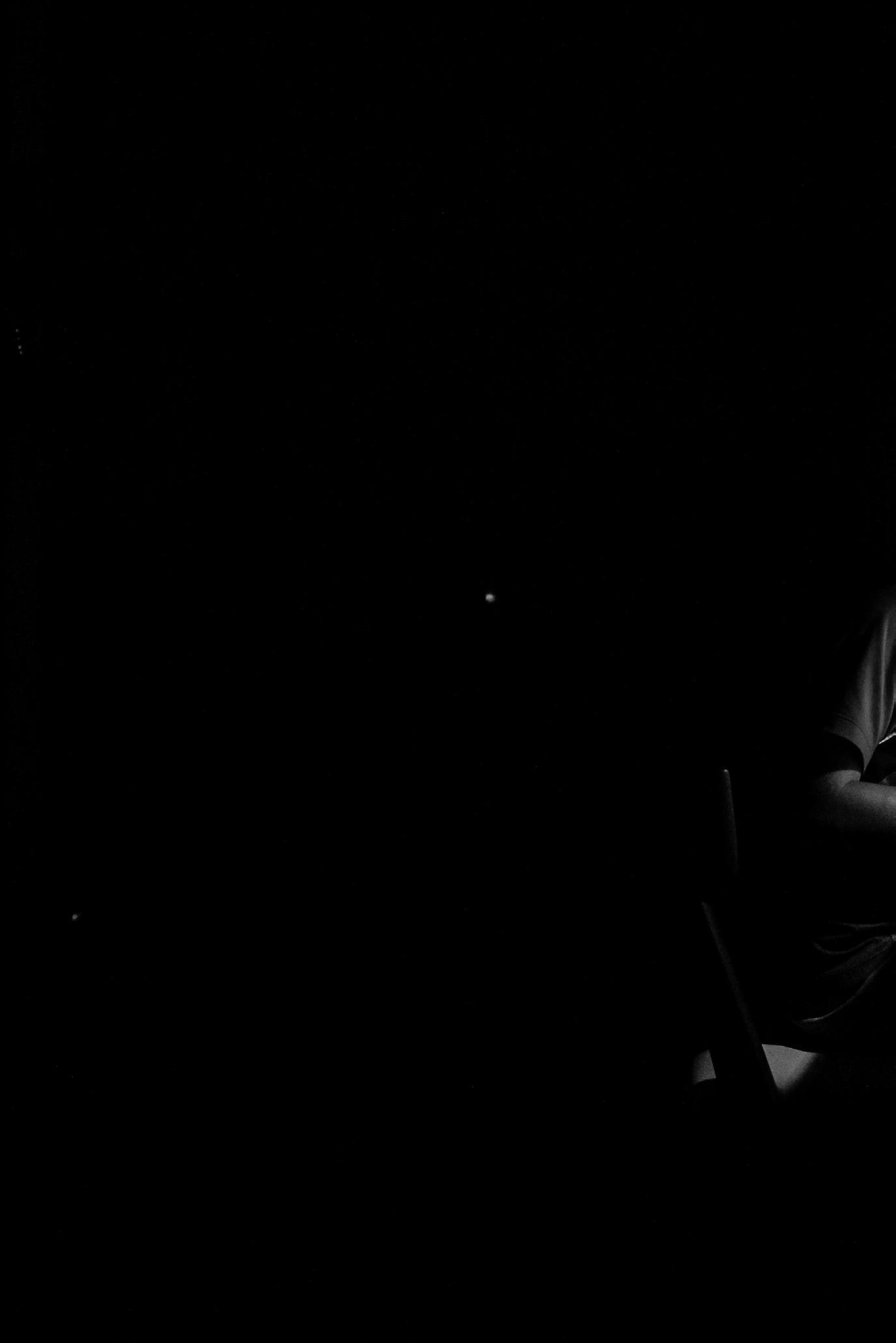

Marcus put his stone down to take a sandwich from his mother.
‘You can have a little fossil collection,’ said his grandmother.
‘I broke your fossil,’ said Marcus.
‘You broke it?’ said his grandmother. ‘Well that was very careless of you. Do you know how old that ammonite was? More than a hundred million years old.’
‘It wasn’t an accident,’ said Marcus. ‘I smashed it with a hammer, to let the ghost out.’
Lesley avoided meeting her mother’s eye. She said to Marcus, ‘At least the ghost will be happy now, won’t it? Eat your sandwich.’
‘No,’ said Marcus. ‘It’s not happy. It doesn’t want to be a ghost. But it did want to get out. The ghosts always want to get out.’
‘Eat your sandwich,’ said Lesley.
‘I’ll never give you anything nice again,’ said his grandmother.
They ate their sandwiches standing up, huddled into themselves.
They walked along the windswept front and through the town, in whose shops Lesley’s mother always seemed to be hunting for something quite precise. She inspected teacups whose pattern was right but whose size was wrong, and side plates whose size was right but whose pattern was wrong. After a couple of hours, Marcus began to complain, until his grandmother shut him up.
They had tea in a cafe. When the waitress came for the crusts of Marcus’s mini pizza, she asked if they would like dessert, and his grandmother said, ‘No. No dessert.’
As they left the cafe, Lesley looked up at the darkening sky and said, ‘The tide will be turning.’
They made their way back to the house beneath the threat of rain. Lesley and Marcus came into the hallway like people glad to be out of a storm, though it had not yet started.
Lesley’s mother, who remained on the doorstep, said, ‘I’ll go now.’
‘You don’t have to go just yet,’ said Lesley. ‘Will you have a cup of tea first?’
‘No,’ said her mother. ‘With any luck, I’ll make it home before the rain comes.’
‘Are you angry, Grandma?’ asked Marcus. ‘Are you angry because of the fossil?’ But she did not reply.
Lesley, unbuttoning her coat, unzipping her boots, asked, ‘Are your shoes all right, Mum?’
‘They’re damp,’ said her mother.
‘Oh dear,’ said Lesley.
‘The wet sand has got into them.’
‘You’d be welcome to borrow something,’ said Lesley.
‘Your feet are too small,’ said her mother.
Seeing that Marcus was struggling with the zip of his anorak, Lesley bent down to help him. ‘Grandma’s going now,’ she said. ‘Say goodbye.’
‘Goodbye, Grandma,’ said Marcus. ‘See you soon.’
The heavens were opening and Lesley said, ‘Look at that rain. You can’t drive in that, Mum. You don’t want to be driving on wet roads.’
‘You don’t want me spending the night here,’ said her mother, ‘do you?’
‘Will you call?’ said Lesley. It was routine for her mother to let Lesley know when she was safely home.
‘Yes,’ said her mother. ‘I’ll call.’
‘Time to get ready for bed,’ said Lesley, steering Marcus into his bedroom. She closed the curtains against the darkness outside.
‘I don’t want to sleep downstairs,’ he said.
‘Well,’ said Lesley, ‘we have to sleep downstairs; there’s only downstairs now. Arms up.’ She helped him out of his top.
‘I liked our old house better,’ said Marcus.
‘Yes,’ said Lesley. ‘Me too. But it’s nice being by the sea,
isn’t it? It’s nice living closer to Grandma and Grandpa, isn’t it?’
They were quiet for a moment, while outside, the rain continued to fall.
‘I don’t think Grandma likes me,’ said Marcus.
‘Of course she does,’ said Lesley, holding her son’s pyjama trousers for him to step into. ‘She comes to see you, doesn’t she?’
‘She comes,’ agreed Marcus, ‘but I don’t think she likes me.’
‘She’s upset,’ said Lesley, ‘because you broke her fossil.’
Marcus climbed into bed. ‘Will you stay with me?’ he asked.
‘I’ll stay until you fall asleep,’ said Lesley. She lay down with him and read a story, but had to stop because it frightened him. She dimmed the lamp and sang softly until she fell asleep beside him.
The telephone was ringing in the hallway. That’s what had woken her. By the dimmed lamplight, she left her son’s bed and picked her way across his room, placing her feet carefully between his strewn toys. When she opened the bedroom door, the hallway light that flooded in was painfully bright. She pulled the door to behind her and picked up the phone.
‘Lesley,’ said her stepfather, ‘is Ruth sleeping there?’
‘No,’ said Lesley. ‘Mum left after tea.’ The grandfather clock behind her chimed and she turned and saw how late it was. ‘She should have been home hours ago.’
‘I’m going to drive over,’ said her stepfather, ‘in case she’s broken down somewhere.’
Lesley turned her head towards the front door. Had she heard something? The porch light was on, but she could not see anyone through the glass, on the doorstep. With the phone still pressed against her ear, she went to the door and opened it, but there was nobody there. She looked out at the turbulent night, trying not to think about her mother’s car crumpled in a ditch with the doors wedged shut, or shunted
under a lorry, her mother dead on impact, or not quite dead but trapped.
‘I’ll stay near the phone,’ she said to her stepfather. There was a tremble in her voice. She felt unsteady. ‘Do you think I should call the hospital?’ The hairs on her bare forearms were standing on end. She shut the door again, and locked it. As she moved back down the hallway, with her stepfather’s voice in her ear, it took her a moment to notice her son, wide awake and standing in his bedroom doorway.
‘This ghost can’t ever be happy,’ said Marcus, and Lesley looked for the drawing in his hands, but his hands were empty. He reached out, to hold on to her, holding on to her clothes, looking towards the front door, in through which had come all the cold air that Lesley could feel at her back, cold air in which the chiming of the grandfather clock still seemed to vibrate.
Endocannibal Aubade
Aurora Amaryllis
when you’re gone, I’ll rehome your bones your skull into bowl & soup & chew marking you – long bones split into spoon – marrow meat stew your cranium cup, filigree-veined like leaf’s underside your calcium and collagen curves smoothed by the boil –marinated teeth chattering in bubble-bursting heat –Carnivore, cave dweller, me, butchering bronchi, alveoli –you, mine – wagyu ribeye, lasting twenty-eight days
until I bleed you out – you becoming dark moon in Van Gough’s Cave – the oldest engravings of human bones known where I’ll smear oil sunflowers of you, handprints blooming between our bodies like light – our birth-theatre – exit stage left – when you’re gone, let me lick your plate –you’ll die – you’ll die – you’ll make me your grave.

Bent, branch-like
OCD
Elizabeth Cook
Before my keeper and protector
A three-piece Armitage Shanks suite, Swan faucets
Fingerprints waning
As Sherbert on the tongue
Lumbar shattering, knuckles splitting.
It began with yellow.
The butter-dish, sly
With bloated cow in smeary resplendence
Gut frothing
Like one before fire or flood
Fear made flesh, hurtling
From dish to door to mouth.
I return to the foot of the mountain
Prostrate before my absurd tripartite
Carex, Imperial Leather, Dove.
Only later, in the brown room
Do I gather up my cloak of obsessions, Lay them bare at learned feet, A mottled patchwork of sins.
We Are All the Same
Emma Oldham
Jamie’s diving mask kept slipping, letting in a sliver of cold saltwater. His eyes stung. His wetsuit clung like a straitjacket, choking his ribs and groin. For all the millions that Better You – the company he worked for – raked in, they could surely invest more in decent gear.
The water was murky today, thick with silt and streaked with oily bilge, ship discharge laced with human waste, making every moment of visibility painfully precious. He shouldn’t be wasting his time emptying water from his mask.
The firm had been slashing costs for years. Instead of accredited marine scientists, they hired untrained local men desperate for work. Labour was cheaper. No one asked questions. Most didn’t realise or care that environmental and legal safeguards were being ignored. The original team had been edged out.
What kept Jamie going was his grounding in marine biology, his published research on cetacean migration and strandings, and his steady hand in hostile waters. He’d tracked whales through sonar, tag data and carcass analysis. He could find any pod in the blue haystack.
In another life, a better one, he’d captained his university’s scuba club. That’s where he’d met Charlotte – nineteen, wildhaired, barefoot wherever she could get away with it. She’d become the mother of his daughter, Beatrice. Beatrice had inherited her mother’s quiet grace, her tangle of curls, and seemed to listen to the world before speaking to it.
The sea had once brought Jamie awe and purpose. Now, it asked for something harder. Once enough Cetolux had been hauled aboard, everything turned urgent. The prestigious serum was pipetted into glass bottles and sealed in frozen canisters at minus fifteen degrees to preserve its worth.
A battle raged below for control of it. Jamie had overheard the men. Boasts, murmured confessions, drunken slips. Tales of recruits who didn’t make it back. Sometimes it was a shove at depth, a tampered tank, a blade under the churn of bubbles. Too many men. Not enough whales. Jamie suspected the vanished had no family to notice, no paperwork, no names to trigger alarms. In these waters, silence was currency. Questions cost lives.
These boats had a reputation, spoken of in harbourside bars and half-abandoned ports. Once aboard, you gambled everything. But the payout, if you brought back Cetolux, could keep a man happy for weeks. Enough to risk it. Enough to stay quiet.
Jamie had lasted six years in this job. Longer than nearly everyone else on board. In the depths, Jamie’s mind and body worked like clockwork in the Colombia waters. He had memorised the entire route, even in darkness, from the boat drop-off to the Verruca Whale’s breeding grounds. He counted every breaststroke, noted every shift in the current and used every cetacean whisper to get him there.
He could reach their breeding grounds in fifteen to twenty minutes. He always cut straight for the kelp forest, slipping into its shadows like a seal. It was the safest route, but also the hardest. Here, the leaves grew thick and dense, a place where it was easy to get lost.
The sting of memory hit him every time. During his early expeditions in Sussex, England, his dives had been acts of restoration, not destruction. Back then he led teams of volunteers – collecting kelp seeds, cultivating them in labs, and replanting them along the coast. He had been among the first to use a seed blaster; he had fired up to 20,000 seeds into the ocean floor with each dive.
That version of Jamie, the idealist, would never have imagined this. He’d once tagged whales, wept over a beached calf tangled in fishing gear. Now, he was part of a system that hunted, silenced and discarded them. He pushed away from the kelp, from his past. At the breeding ground, he checked
the murky water. No silhouettes behind him.
Life pulsed ahead. Five mothers. Three calves. The sight knocked the breath from him. He hadn’t seen this many whales together in years. An untamed smile broke across his face. They moved like goddesses, mammoth yet weightless, their calls vibrating through his bones, the song of Earth itself.
As the ivory trade had driven elephants to near-extinction, and rhinos now teetered there with horns worth more than gold, Africa’s wildlands had become graveyards. Now, the obsession was weight-loss pens, and the Verruca Whale was the only species that could fulfil the demand. On top of its rough skin lay a network of warts – fluid-filled sacs, brimming with semaglutide, the key ingredient in weight-loss treatments.
Like every poaching syndicate before them, the ones in charge never got their hands dirty. The real money men stayed safe, their boots clean, their names untarnished, while the runners bled for the trade, taking all the risk and paying the price.
When Jamie started, the company had a good reputation. Ethical. Divers had full days to monitor whales. Poaching was partial, mostly tracking, photographing, and identifying individuals. He believed he was gathering data for conservation.
‘You’ll be helping us influence vessel routes to reduce collisions,’ Professor Nantz had told them.
Boats stayed anchored. Divers rested, refuelled. They worked in teams. Two would dart the whale with anaesthetic, wait for it to sink, then scrape the warts. Strict rules: four from juveniles, twenty from adults.
‘They’ll grow back within a year,’ Nantz had assured him.
While his ethical compass spasmed at the thought of the interference with wild whales, could he complain? He had the privilege of gazing into their eyes, unlocking a vessel into their ancient world. He felt the lumps and bumps of their skin, tracing them like a map of constellations spread across their vast bodies. He held their flippers, connected in a way few ever would. And when their song vibrated through his
lungs, rocking his eardrums, it was magic.
But then the pens hit the private market. Prescriptions were bypassed, and everything shifted. Staff were reassigned to build Cetolux supply chains. Packed with GLP-1 and GIP, it suppressed the appetite. At £500 to £1000 per pen, the market exploded. Influencers flaunted slim waists and radiant skin whilst whale numbers plunged. Expeditions grew longer, rougher. More time on boats. More competitors.
When the changes were first implemented, Better You offered Jamie a modest promotion. He was tasked with overseeing staff restructuring and research to match budget cuts. He fought to protect the few remaining researchers left on his team: Kraus, Malcolm, Camille and Amy, who had all uprooted their lives to move to work on the Colombian waters.
As much as he hated being away from the whales and locking himself behind the sterile screen of Microsoft Office and buried in policy papers, Jamie knew it was a safer job for Charlotte and Beatrice. He got to dodge the underwater violence and pollution. But when even larger, more ominous boats started appearing, among them the vessel of activist Eleonora Brask, he was pulled back into the fray. They forced him to train the new local recruits, putting him unwillingly back on board.
Jamie sank into the ocean’s embrace, his body drifting to the floor as the massive figures gilded overhead like silent blimps. His back brushed against the soft tendrils of seaweed, and his hair, untethered, swirled upward in the current. The red seaweed blanketed him, a cruel reminder of the colour of the stain he could never remove from the boat’s deck. When Amy’s body was pulled on board, a spear was shredded through her arm and her wetsuit torn and plastered with sinew.
‘What the hell happened?’ Jamie shouted.
‘The whale fought back,’ Kraus yelled, his hands trembling. The spear was lodged too deeply. He couldn’t stop it, couldn’t remove it.
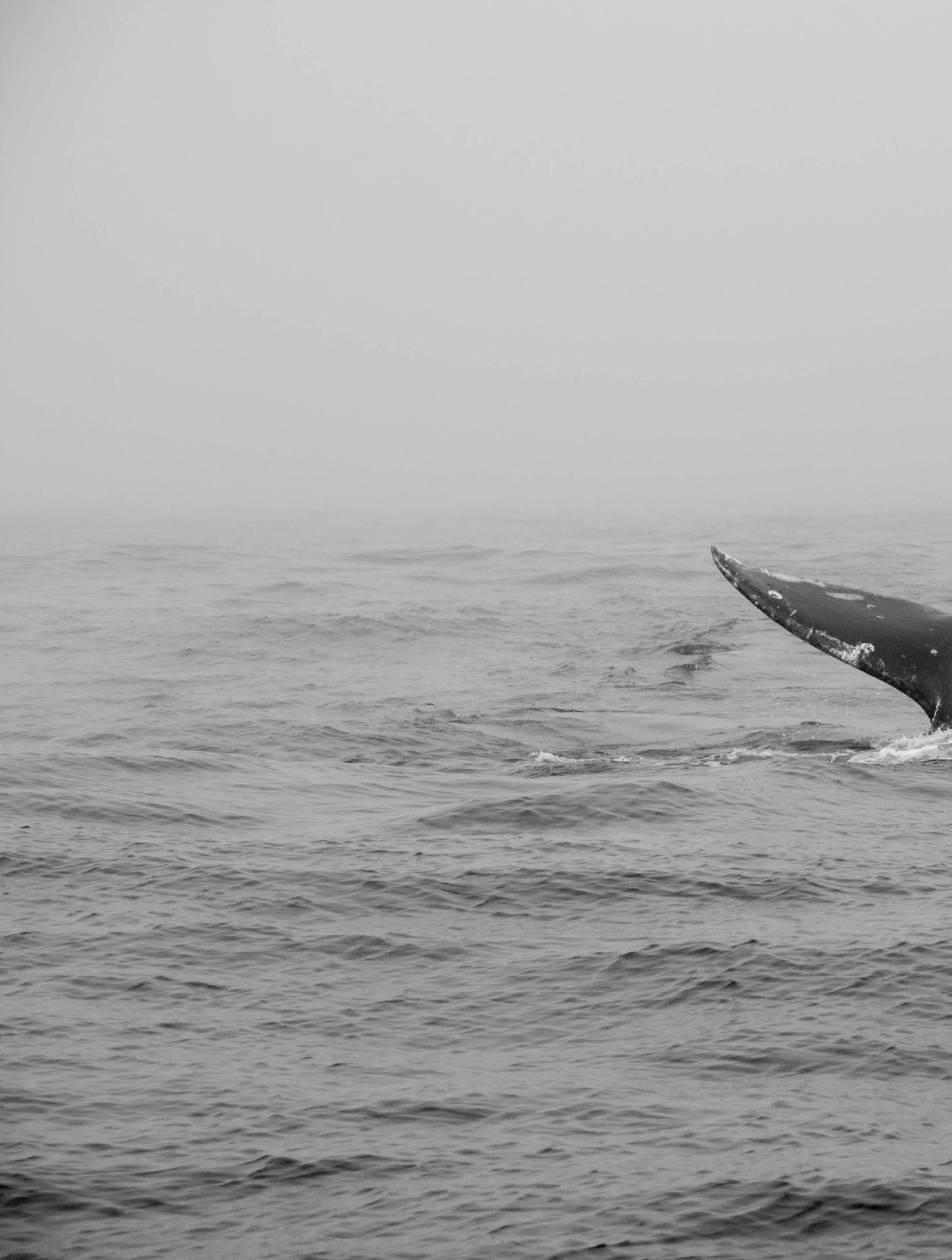

‘What do you mean, the whale fought back?’ Jamie grabbed him by the shoulders, shaking him.
‘Kraus! Talk to me! What the hell is going on?’ Amy’s blood sputtered from her mouth.
‘Fuck!’ Kraus screamed, throwing his face to the sky.
‘I swear to God,’ Jamie shouted, fists clenched, his voice raw with panic. ‘You need to tell me right now!’
‘I don’t know! I’ve never seen a whale do that before! It –’ Kraus faltered, his eyes wild with confusion and fear. ‘It tried to pin her against the anchor… and kept pushing its weight on her. It was like it was trying to… sink her.’
‘What? How is that even possible?’
‘I…I don’t know! It was like the whale just...wanted her down there. Eventually, she just gave in, her arms gave out under the pressure, and the spear –’
Jamie’s breath hitched. ‘Why wasn’t the whale docile?’
‘We didn’t use the tranquilliser!’ Kraus looked at Amy, her body jerking with spasms. ‘Fuck! No, no, no. She’s gonna die, isn’t she?’
‘We’re thirty-six miles from shore,’ Jamie’s voice cracked. ‘We had to pull the medical staff. So, unless you can somehow get that spear out without rupturing her arteries, yeah, Kraus, she’s going to fucking die!’
Kraus paced, muttering to himself, frantic. ‘Fuck. Fuck. Fuck!’
Jamie’s fist struck the wall. ‘Tell me now. Why didn’t you use the tranquilliser?’
‘Jamie, are you blind?’ Kraus spat, fury flashing in his eyes. ‘The crew hasn’t used tranquillisers in months!’
‘What do you mean, “months”?’
‘You heard me.’ Kraus spat again. Before Jamie could react, Kraus shoved him hard. Jamie staggered backwards but caught himself.
Kraus pointed at Amy’s lifeless body. ‘She’s been doing it for months. We all have. You’d know that if you weren’t hiding up here behind paperwork. It’s been hell out there, Jamie!’
‘And the whales? What about them?’
‘Are you serious?’ Kraus shoved him again and then lowered himself. He knelt close to Amy, trembling now, and closed her eyes.
The visibility was still poor. Jamie was forced to move closer to the whales to accurately assess the number and size of warts on them. The warts themselves were grotesque, as if they had been crafted by the same hand that decided to place them at the end of a witch’s nose. Jamie found it ironic that the biggest, most insulated creature, loaded with the most lipids, was helping humans reduce their overindulgence in fats themselves. Do people know where this stuff even comes from?
Jamie spotted a cluster of warts pooled just beneath one of the female’s right flippers. With the advantage of already being beneath her – if he acted quickly – he could slip upwards and remove them in one clean swoop. But he could end up damaging her flipper in the process. He took out his knife. His two-year-old Beatrice, his little Bee, needed him to bring home money. Since Charlotte’s postnatal depression, she had struggled to return to work, making their finances uncomfortably tight. The thought of Beatrice, still outgrowing her clothes and needing specialist milk to help manage her dairy allergy, kept him focused.
He emptied his mask again, forcing water through the purge valves by looking down and exhaling through his nose. A baby whale gazed directly back, making him jump. Holy shit! Where did you come from? With no fear, it nudged him away with its head, pushing Jamie’s body aside. It latched onto its mother for milk.
In all his years of studying, working and exploiting Verruca Whales, he’d never witnessed this intimacy among them. He slowly tucked the knife away.
Not today. He thought of Beatrice again, her tiny hands wrapped around his thumb, the softness of her cheek against his chest. He thought of the stories he had read to her about whales singing their songs across the sea. And here he was,
poised to carve from one like a butcher.
A sweet noise of contentment escaped from the calf, making Jamie’s heart ache. The mother and calf were so peaceful, so at ease, despite so much against them; Jamie found himself drawn nearer.
The mother’s body was marred, cut up. It looked like a careless decorator had attacked her with a wallpaper scraper, leaving jagged, uneven patches where lumps had once been. They hadn’t grown back. Instead, raw blisters scarred her body. He could trace the lines of damage where tools had carved into her like someone digging for gold. But this wasn’t a cavern of stone. This was a cavernous creature – of emotion and responsibility, a mother raising new life.
Something massive and brash tore through the water. The bulk moved with urgency, a dull metallic sheen catching the dim light. He followed its chain. That’s when he spotted it, the insignia of a ship. Something blasted from behind him, sending him into liquid darkness.
‘He’s awake!’ someone called, pressing a water bottle into his grasp. ‘You’re lucky we spotted you! We thought you were a seal at first.’
Jamie let out a slow, shuddering sigh of relief. He was still alive.
‘Who are you?’
A woman in a wide-brimmed yellow sun hat appeared above him, her silhouette framed by the hard glare of the afternoon sun. She offered a hand, firm and warm, and helped Jamie to his feet.
The sunlight poured down, hot and unrelenting, needling into his skin and forcing him to squint. He realised he was still in his diving gear, now bone dry. As his eyes adjusted, the sea behind her glittered like scattered glass. The breeze carried the scent of salt and kelp, tugging at her dress, a flowing, lemon-hued linen that danced around her legs like water. Her hair, the colour of ripe wheat, streamed in the wind like golden ribbons caught in flight.
‘How did you manage to get so close to the whales?’ She asked. Her silk scarf peeked out from under her hat, its ends fluttering.
‘It’s my job.’
‘Doing what, exactly?’
‘I-I-track the whales...’
‘To carve them up.’ She interjected, folding her arms, an accusation, not a question. One he couldn’t deny. ‘Give me one good reason why I shouldn’t throw you back into that disgusting water?’
‘I can’t,’ Jamie answered honestly. He cupped his face in his hands and began to sob.
‘Do you know who I am?’ She pushed again, showing no sympathy.
‘No.’ Jamie couldn’t make eye contact. ‘But I recognise your ship’s logo. You work for that whale activist.’
‘Yes. Follow me.’ She wanted him away from the tourists aboard her ship. She moved Jamie out of the public eye into her cabin. Jamie was thankful to be out of the sun and wind; his body ached. But as her gaze locked onto his, unflinching, he felt stripped bare and aching in a new way. He realised he was in the company of the Eleonora – the famous marine activist from the Swedish royal family.
‘So,’ she said, resting her chin on her palm, head tilted, ‘You work for that blindly evil company?’
‘Yes. And trust me, you can’t hate me any more than I hate myself for it.’ He shook his head. ‘It wasn’t always like this.’ He took a long swig from the water bottle, nearly draining it, but the thirst didn’t fade. Jamie suddenly went on the defensive.
‘Listen, you can put all the blame on me that you want, but come on! People consume crazy shit all the time without questioning where it comes from. Or where it ends up.’ He tipped the last drops of water over his head, slicking back his hair.
‘I agree.’ She said matter-of-factly. ‘I’m sure you are aware of why my boats patrol these waters.’ Jamie nodded. ‘Do you
want to help me? Or keep helping them?’ She swallowed the final word bitterly as if it were poison. He struggled to let go of his words.
‘I can’t help either of you,’ Jamie admitted.
‘Of course you can,’ she said, leaning forward, ‘You’ve got insider knowledge.’ She brushed her blonde fringe aside, her cheekbones sharp and striking.
‘Yes, I may have that,’ he said, rubbing his face. ‘But I’ve got no evidence. Absolutely nothing that’ll help you.’
‘So, no underwater camera?’
‘Ha!’ Jamie scoffed. ‘I wish. They don’t give a shit about their staff. We only ever get the basics, if we’re lucky.’
She made herbal tea, the aroma of chamomile dousing her cabin. Secrets clung to her, like perfume, impossible to scrub away. As much as Jamie wanted to draw near and take in a lungful of that possibility, he couldn’t. He was hollow. Too many nights without sleep, too many days pretending to be fine. His heart felt like a house with the lights turned off. He watched the steam rise from the mugs she set on the table, and for a moment, he hated how much he wanted to want it.
‘You must have some footage or data back home?’ she pressed. Jamie shook his head.
‘No.’
‘Listen, I’ve got four million followers on Instagram alone. Give me something, anything, and I’ll create the outrage. This madness has to stop. You can get your revenge.’ Her voice was coaxing like a melody. She was leaning in now, her dark green blouse flowing over her collarbones, the elegance deliberate.
‘But what if I don’t want revenge?’ He lifted his head, meeting her gaze with a quiet intensity. ‘I appreciate what you’re doing, lady, really. Hats off to you. They all need to be stopped. But I’m done.’
‘What do you mean?’
He sighed, eyes lowering. ‘As long as the world keeps consuming, they’ll keep killing. Your four million followers, hell, half of them might care, but the rest of the world? They won’t. I’m done.’ His words hung between them, final.
‘I just need to be away from the ocean. I’m done here. I want to take my wife and daughter back home before this life destroys them, too. I’m sorry, Eleonora. But I just can’t do this anymore.’ He took a long, hard look at the woman. ‘That doesn’t mean you should give up, though.’
Three years later, Charlotte gave birth to their second daughter, Ivy, named after her favourite plant. They had moved away from the Cumbrian waters, returning to a grounded life in Essex. Surrounded as she was now by her sister’s company and antenatal support in her language, Charlotte settled into a steady, happier place. She glowed, now truly enjoying her role as a mother, taking great pride in watching Beatrice grow into a caring and compassionate big sister.
Jamie had taken a job as a delivery driver. He had left the sea, science and conservation behind without a second glance. That part of his life was over.
One Thursday evening, returning home from a twelvehour shift, Jamie found Charlotte in the back garden, in the last spill of sunlight, breastfeeding Ivy. A book lay half open beside them, The Song of the Verruca Whale.
Jamie felt his chest tighten. His hand caught the doorframe, grounding himself. We are all the same.
Bittering Agents
Ho Kin Yunn
Between the tie-dye singlet and cream mittens is where the colour catcher should go, though it’s not in my hands. It’s by the vase of hypha-lilies and ashen magnolias, a greyfall of baby’s breath, cast over the dining table since yE oLde puB cRAwl. You told me how yeast seeks sugar. You explained what hops were for, that even good bacteria had to be controlled, and what the beer would need to replace it: yarrows; bog myrtles; mugworts. We’re brewing potions now, I mutter. We’re drinking potions now, you retort. We toast. Love potions, you add, as I’m about to finish. No no, I object. You can’t add terms post-toast. I curse under bacterium breath. Under soot sheet. Under sofa bed. After, you somehow conjured flowers, whites with off-whites upon wicker stems, and I remembered how shot that was, doing it in the backalley. Look how the colours catch the light by these trashcans. If only I had explained to you then, how colour catchers worked. Positively charged dyes scavenging for negatives, and wasn’t I a bitter negative, sought for that, for who I was. Or would the sheet have captured sungolds and greens, lilacs and crimsons, vermilions and everything I am not.
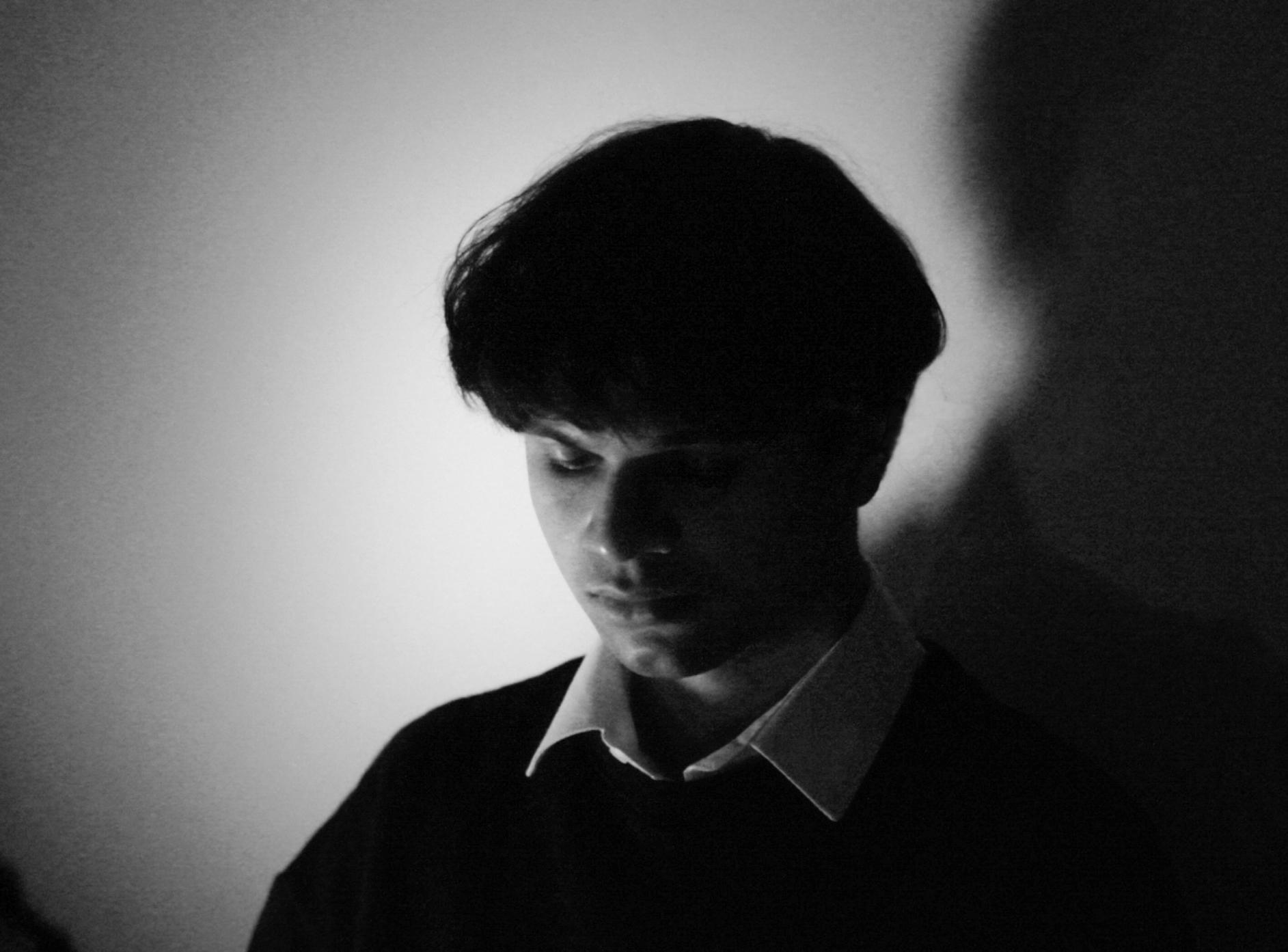
Photo by Shashank Dhongadi
Baptism
Gaynor Jones
The pool is tiled in hieroglyphic patterns as indecipherable as the equations scrawled in our maths books. Chemical odours clash, air heavy with hormones and the choking scents from the shimmering cans – we hiss around them to disguise the sound. In the steam of the changing rooms we cling to the edges, towels clasped between our teeth as we bend to untangle underwear from tights or trousers, banging our knees on low wooden benches, our shoulders on silver hooks cold as unwanted fingers on our skin.
We used to plait each other’s wet hair in here, prod our plump bellies. We used to play and giggle, unblinking at the flat discs of our chests, unknowing about what they – and we – would grow into. Now we’re split. There’s girls whose skin is like secrets, whose names are on ink-blotted papers tossed between the desks. Then there’s girls like us. We squeal our way through the footbath, where a discarded plaster floats like a fish-scale on the surface. We dash through the cold shower, cheeks burning at what the temperature does to our bodies, hot and cold, dry and wet.
When Coach hurls the weighted bricks – bright yellow against the blue – the tiles bend and fragment, water pulsing. Across the way, the boys pile out. Less about them, stripped of their uniforms. Still, we’re compelled to press our thighs together, fold our arms and squint at the discoloured grout that creeps the edges, the stray hairs that breed in the drains, anything but the boys.
When Coach blows his whistle we take our positions, a domino rally of bodies waiting to line up, dive, line up. Mia is last, late to training again, squelching from the changing rooms like a de-tailed mermaid, blonde hair curled into a nest, no swim cap, red costume with a black line that runs
the length of her body from chest to groin, like an arrow, or an X on a map.
Small sounds echo in the large room as she finds her place; the quiet rumble of a stomach hungry for lunch, the hitch and gasp of an allergic cough. The whisper of a rumour. Mia stands, toes on the edge, and we notice the cut of her costume, tight last summer, now loose, straps tipping either side of her freckled shoulders. It’s less flesh than we’ve all seen already.
When Coach whistles, Mia doesn’t move. When Coach clicks his fingers, right by the ear with the three silver studs like those we begged our disapproving mothers for, Mia doesn’t move. When Coach lifts one hand, fist curled, finger wagging, we hold our breath. Our parents aren’t allowed in to watch training any more and we wonder how we’ll tell this story later, what details we’ll include, or if we should even tell it at all. Mia’s flushed skin turns white-yellow around the pressure of Coach’s fingertip, the colour of pimples fresh to pop. Whatever Coach whispers, he whispers to her alone. Mia doesn’t move.
We stare at the bricks at the bottom of the pool, sunken blocks of primary colour, relics of our younger years when playtime was red swings and blue roundabouts and we thought we were all the same.
Released back into the hot sweat of the changing room, the other girls toss their wet hair around with ease, undress and dress their perfectly smooth bodies. Mia takes her bag into the toilet and we see the dry costume on the floor under the door, a snake flaying its skin. We wrestle ourselves back in to our uniforms, shirts sticking in our haste to cover up.
When Coach shouts from the pool, the other girls – the ones parading their matching underwear sets – don’t flinch, they don’t even hear it. But the girls on the edges, we’re alert, our minds and ears attuned to the dangers lurking behind everyday sounds; a boy by our locker who offers a compliment, a man at the bus stop who tells us to smile, our internal failings etched on our outsides in ways we don’t yet know

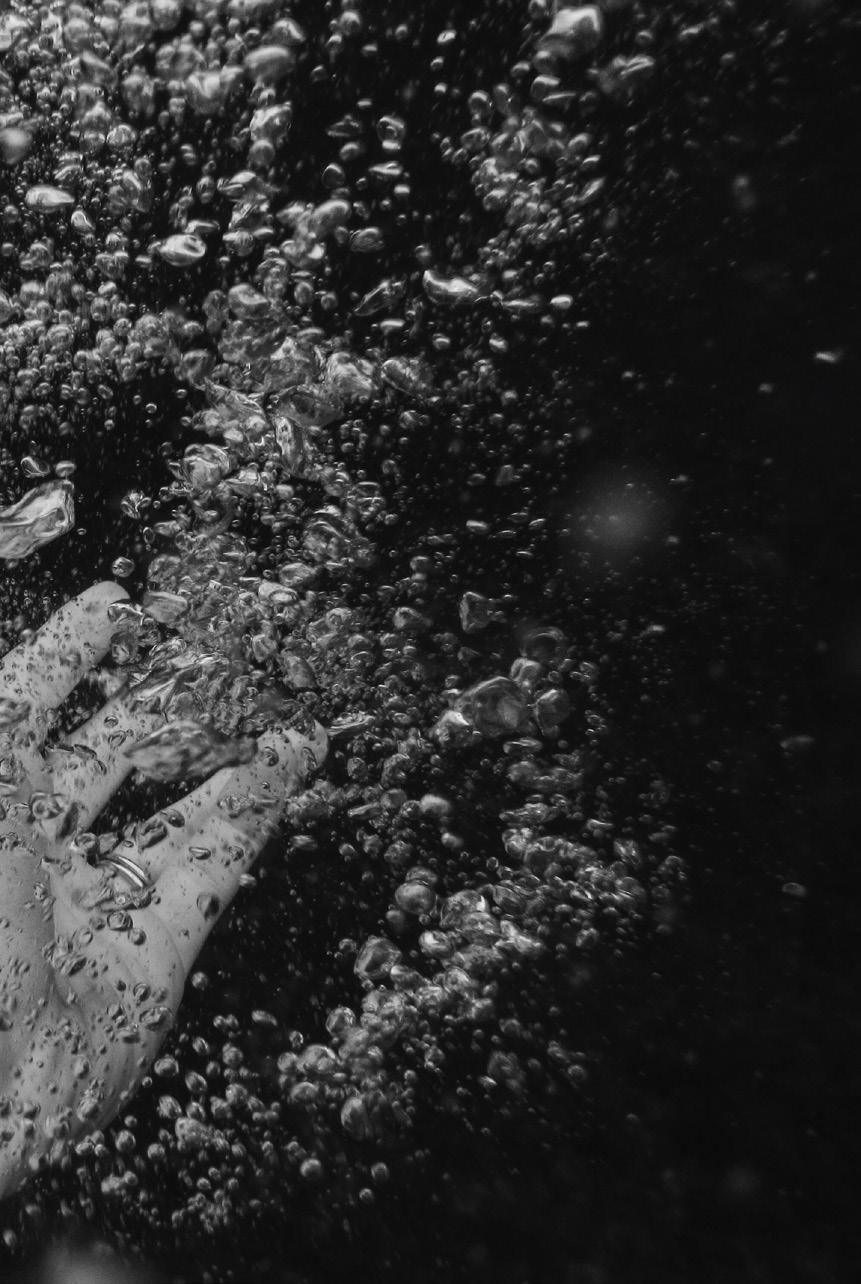
how to mask. But the next shout is louder, the manic anger piercing the steam, Mia’s name over and over, an irresistible call. We didn’t see her leave. The toilet door is still closed, the costume still there. Girls herd back out to the pool then, socks soaked in the footbath, white shirts slowly turning transparent under damp hair. Boys filter out too, clothes tangled or abandoned, parts we’ve never seen, hair and scars and bruises.
Mia stands on the top board, hands straight down at her sides. She’s more covered than she was in her costume just moments before, but this feels different – the thin slice of skin that runs down her body the same way the stripe did, snatched glimpses of things we know better than we should. The height changes her though, looming, like she could swallow us up whole, a fairy-tale giant. When the board wobbles beneath her, the movement threatens to part her unbuttoned shirt.
Coach stands at the foot of the ladder but doesn’t climb it, just blows the whistle over and over, cheeks red and glistening. There is nothing in his policy booklet that covers this. Eventually he spits the whistle out, puts his head in his hands. Up above, Mia starts to bounce, and the shirt does part then. On the other side of the pool, the boys stare at the floor. This isn’t what they wanted. Mia on higher ground. Mia in control. Mia in charge. We’ve all seen the video, the stills quickly devoured then deleted. Everyone has. Scandal bleeds through hierarchy.
When she leaps from the board, legs together, hands clasped, the shirt balloons around her like a parachute for someone else, someone who might need saving. Coach turns his back. The other girls release their slurs, disdain dripping from their tongues. The boys retreat, fumbling back into the changing room, eyes anywhere but on Mia. We stay. We watch. The splash is clean, a white cloud where she lands, but the water around barely rippling. Mia stays under, bubbles rising around her like miniature jellyfish. She sends her shirt up first, a floating shroud, but she isn’t dead down there, she’s
more alive than we’ve seen her in months. We’re transfixed by the freedom, a looseness unspooling in our stomachs, skin prickling, hearts racing. When she surfaces, she bobs quietly, hair now slicked to her neck. She kicks her legs, once, twice, then flips onto her back and points out her fingers and toes in an imperfect star.
The video was obscene, our curiosity betraying us. Mia a ragdoll, a puppet. But this is beautiful. Mia is beautiful. She pushes her stomach up and we marvel in the roundness of it. She takes a deep breath, and begins to smile. We smile back. The tiles spread out under her body, extending from her arms then up, out, and we see them clear and bright, we know what the patterns are now. Mia is in the water, but the tiles are wings. She’s flying.
Years later we search for Mia’s name and when it comes up blank we tell our own stories about her. We picture not her body, but her face, broad and smiling, coach’s whistle now as distant as a far-off train. We take our daughters to public baths and refuse to shield them in communal changing rooms. We allow them to run topless through spraying fountains on bright sunny days, their nappies sagging with the weight of the water. We dress them in grey or yellow or white or blue and hold off the inevitable for as long as we can. When they pause at our squad photos we tell them the best and the worst parts of it all. When they wear our old medals like dress-up jewellery, we run our fingers over the engravings and wonder what the prizes were really worth.
Weight
Vinod Sankaran
A frog prays on the side of the canal, motionless, in full concentration. The ripe paddy field in its left eye.
A lad casts a stone at it as soon as he spies it… One…two…three.
After each throw the frog thinks that there will not be another. But, the lad’s throws bear more power after each.
The frog’s left eye is shattered. The stone inside grows more weighty, as large as a big city.
In a flat on the forty-first floor I am feeding the fish.
My four year old son insists on a frog to play with.
I fold a white sheet of paper and make a frog for him.
The frog leaps off from the point of his forefinger.
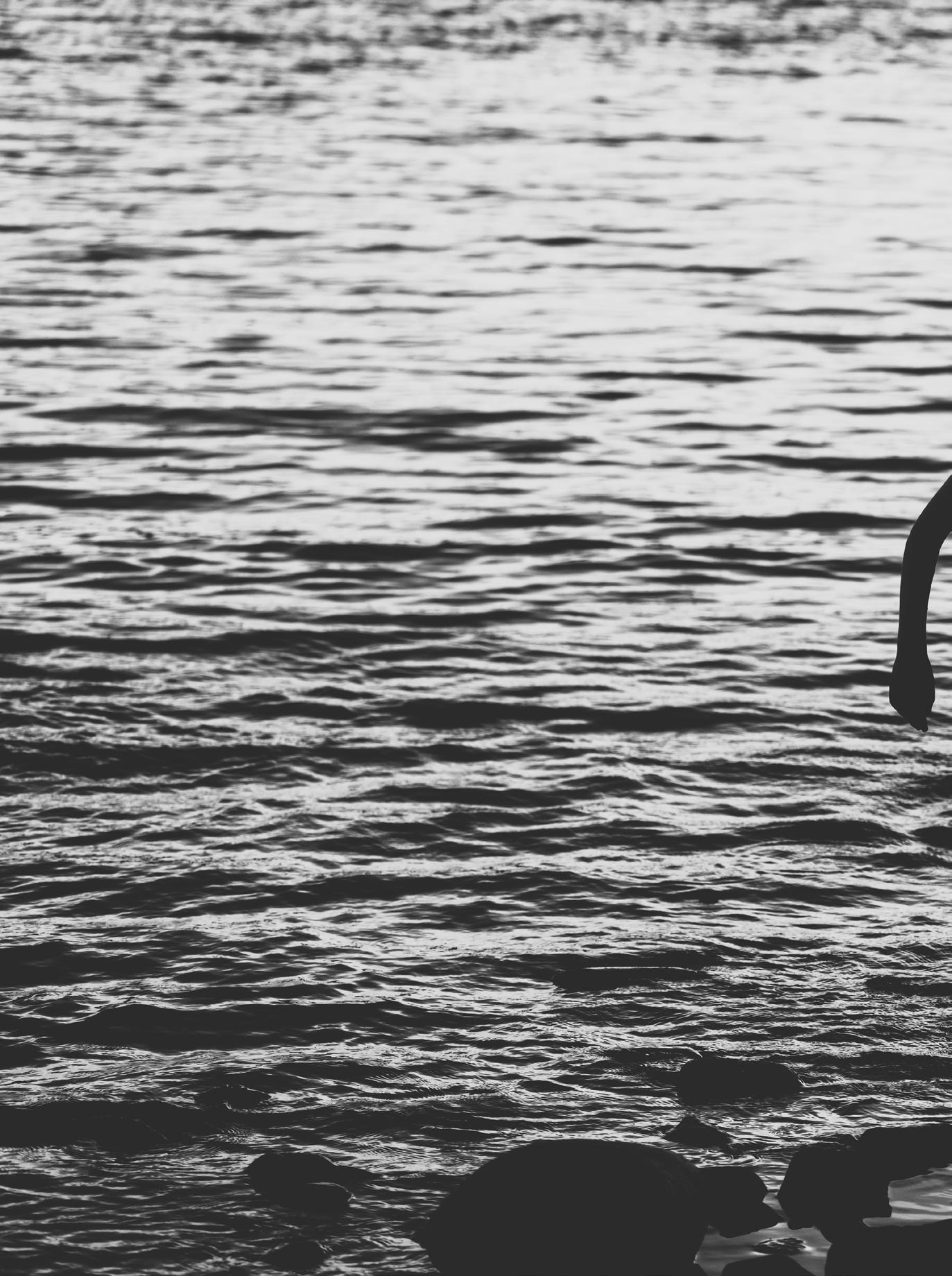

Rhapsody on a Street Corner
Chloé Rose Whitmore
Feeling, suddenly, that frog-leap of joy in your chest. The rattle of it in your ribs. That even seeing the slogan on a passing t-shirt or the curve of a perfectly round stone is to see, at once, the scope of the world, its rivers, the froth of radiance foaming the surface. In your heart, a swollen wave. A real and cavernous want.
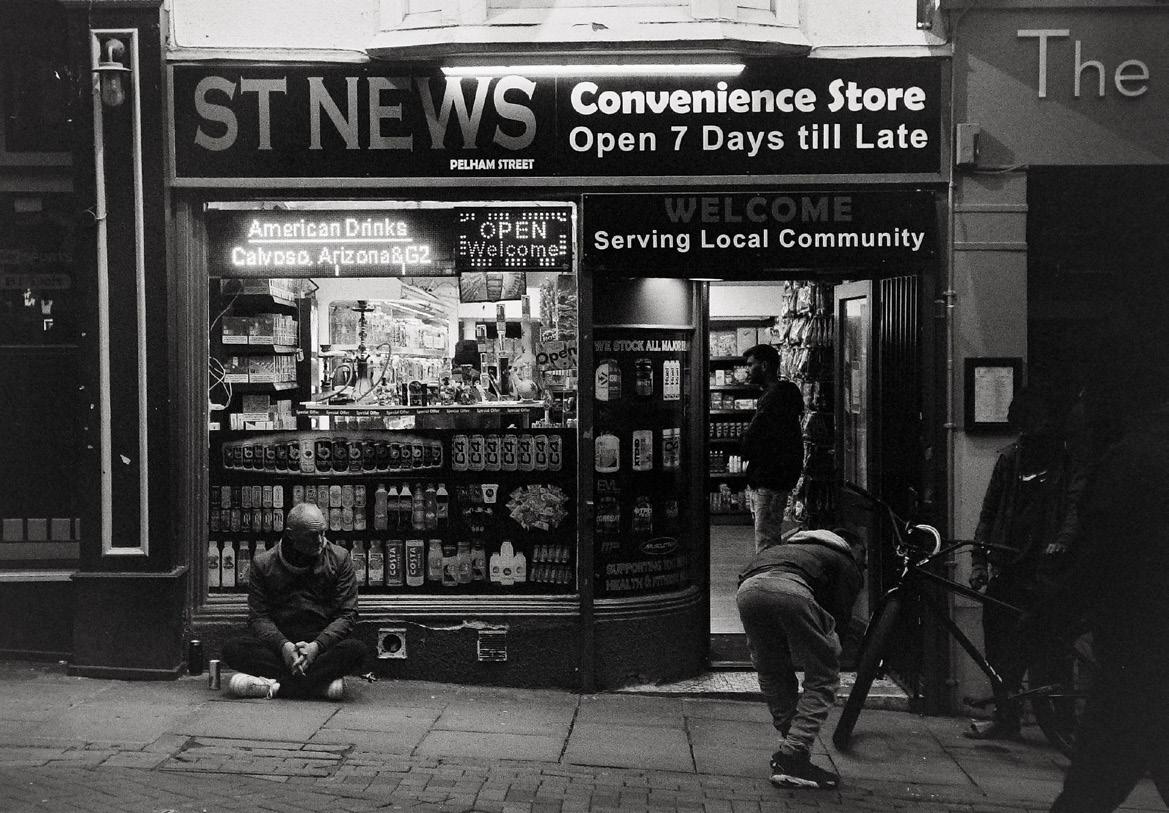
Photo by CJ Deocareza
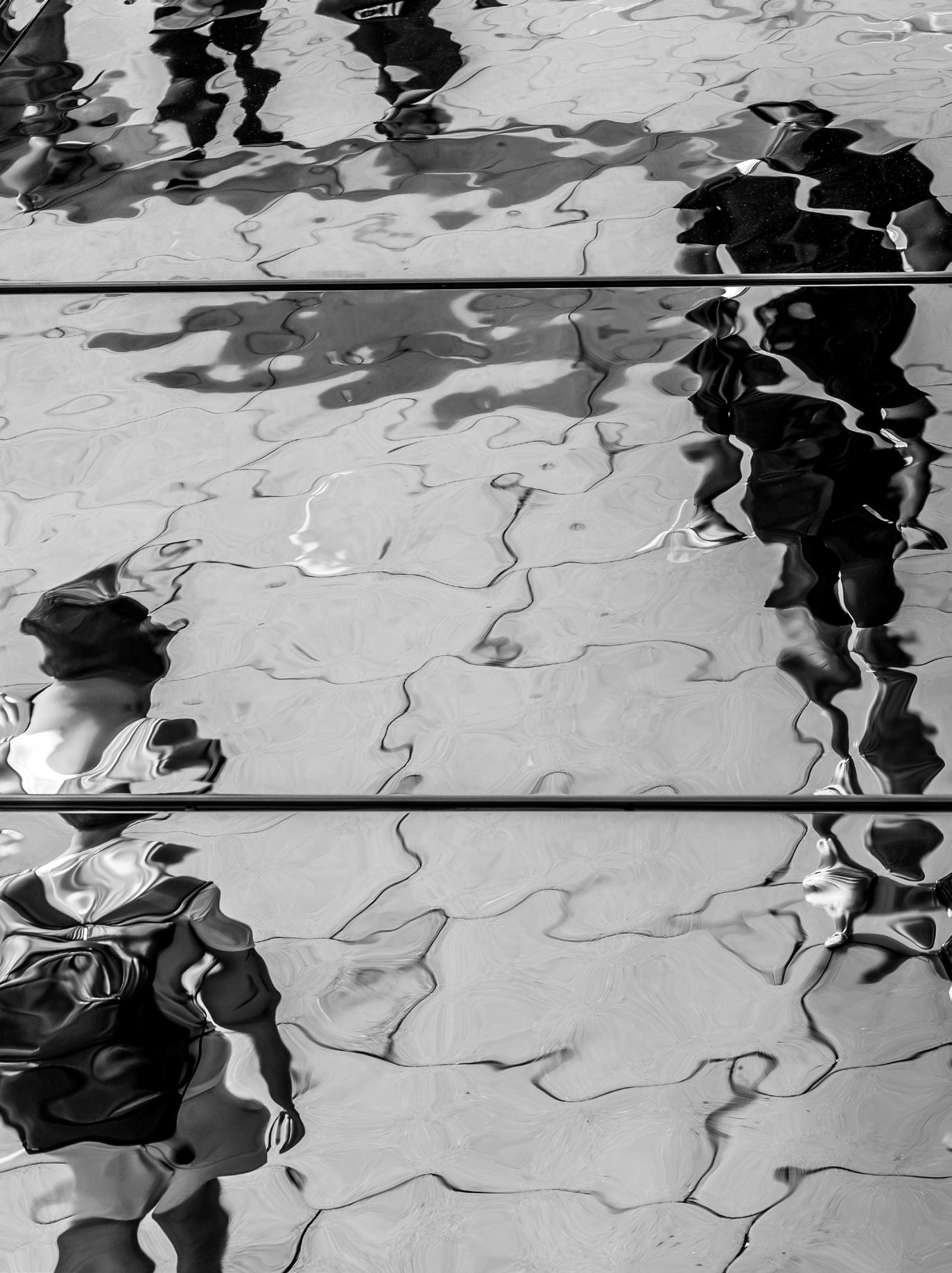

Surface Tension
Daniel Cordle
It isn’t a big deal. It isn’t even really a drip. Sometimes, an hour or two after Sharon finishes the washing up, there’s a globule of water suspended from the mouth of the mixer tap, trembling under the surface tension. When she looks in the sink a smattering of droplets are splashed around the plughole.
‘Just turn the tap a bit tighter,’ says Harry. ‘It obviously wasn’t turned off properly. Really, just remember to turn it fully off.’
Sometimes there are no drops at all. It’s fine.
To say they’d met twelve years ago would be wrong, because they’d known each other longer than that, but it was twelve years ago that they’d fallen in love. It was at a party that she realised she loved Harry.
After the trauma of her sister’s illness had been the awful, drawn-out reconfiguration of herself to a world without her sister. Most friends had either been awkward, embarrassed and absent or, anxious not to be absent, too present, intruding. She understood both reactions, had been guilty herself of both in relation to friends’ losses. There was no right way to be present, really, and she understood that.
The party was a month after the funeral. She had found herself in a patch of still water amidst the chatter and the laughter. She felt her eye pregnant, a tear trembling, latent within it. Harry had touched her delicately on the elbow. His eyes sparkled as he looked at her. He smiled and said gently,
‘Hey, sweetheart, you okay?’
He had a soft way of saying ‘sweetheart,’ semi-serious, that changed it from an intrusion to an endearment. The touch wasn’t flirtatious. He touched the elbows of women and of

men. It was unconscious, asexual and as neutral as a handshake. It was Harry’s way of saying he was paying attention to you. She needed that naturalness then. She needed that touch.
‘Sharon?’ She can hear him downstairs, clattering around. Curled on the bed, she tries to concentrate on her book. He appears in the doorway.
‘Sharon, you really need to turn the tap off properly.’ Then, more gently, ‘Sorry love, but you shouldn’t – we shouldn’t – let it drip like that.’
They got married a year after the party. If you’d asked to look at the wedding pictures, although it might have taken her a little while to find the album (the sideboard? the kitchen drawer? the box in the attic?), she would happily have described the day for you. It was sunny and it was full of friends and flowers and laughter and smiles. Her face would have softened and brightened as she spoke, as if she could feel the sun on her face still; still hear the chatter and congratulations.
She works at her laptop at the breakfast bar, scrolling through emails, not really answering them. It’s Saturday afternoon, so Harry has taken the dogs out. There is a gentle, periodic plop from the sink, maybe once every two or three minutes. Although she’s only just noticed it, it must have been going
on for some time because when, irritated, she looks over, a cereal bowl – abandoned that morning – is half full.
She empties the bowl, turns it upside down and swings the tap to the side of the sink. The tap seems quieter, bearable. She goes back to her emails, scrolling down and then up. She clicks ‘reply’ on one of the simpler ones and begins to type, then stops, thinking.
There’s another drip.
She takes her laptop to the study upstairs.
Sometimes she remembered that she loved Harry, she really did. They would be out somewhere and he would come up to her in the crowd and his fingers would brush her elbow and his eyes would sparkle and he would say softly, ‘Hey, sweetheart.’ She knew this wasn’t a gesture and a phrase unique to them – she would see him across a room, greeting female acquaintances in the same way, or he’d touch the elbow of a male friend as they left after a dinner party – but only she knew, she thought, how it made Harry special, linked them. She felt such electric gratitude for that touch.
The tap is dripping three or four times a minute, but they are going away for the weekend. Harry is in the car, starting the engine. She opens the front door, dithers.
She returns to the kitchen. She checks the plughole is clear.
They didn’t need children. They’d agreed long ago, without every really saying it, that if it happened, if they had children, then that would be great, but they weren’t going to define themselves by the presence or absence of children. They were happy as they were.
It isn’t a standard tap. She can see what you are meant to do with a standard tap. Obviously, you must just prize off the cap and then there’ll be a screw or something that gives access to the washer, but this has levers you pull to operate the hot and cold water. It isn’t clear how you get them off.
When she googles the manufacturer she finds a PDF manual, but it’s just a diagram: the tap with its component parts disassembled and named. She can see how the tap works but she can’t see how to fix it. There are no instructions telling her how to get into it.
She thinks she might need a ceramic valve, not a washer. When she searches the internet for videos of repairs they are all for slightly different types of tap.
‘Harry, what shall I do?’
‘It’s just a drip. We’ll sort it out later. For Christ’s sake come on, we’re late.’
The tap drips every three or four seconds now. It’s a simple job. All she has to do is have a go, take a spanner or a screwdriver or an Allen key to it, or get someone in, but her dad was a plumber and she feels ashamed to ask for help with a dripping tap. She can’t see where to start with the thing.
She looks across at the tap. A globule of water is suspended from the mouth, poised and trembling. She knows something is wrong and she knows she has to do something, but it’s always easier, day by day, to leave it.
a forest is a library
Frank G. Karioris
There aren’t lotus flowers in the February rain –we will laugh at the foolishness of accumulation,
these thousand of years, why do you make pain out of blue jade, keeping clear the beads of the day’s departure?
Did the day contain the rain, pouring it again did it walk the stairs of the previous years in each other’s arms?
No matter what, whether the day is austere or intemperate, we always have to decide what to shed tears for.
The roots will soon decide to become summer, with work, love, & patience they will forgive the winter’s transgressions.
In the joy of life, become understanding, a new season.
[Found poem from the top of Geonjisan mountain.]
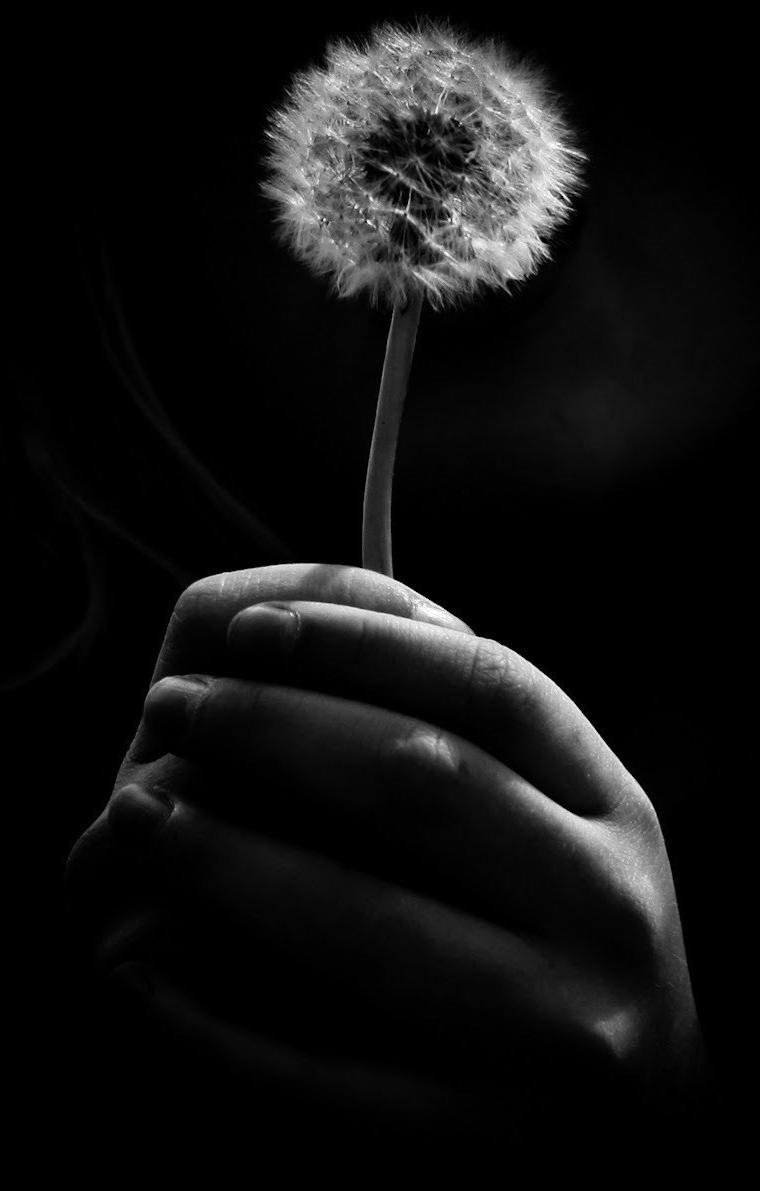
Photo by Nicola Davison Reed
To depart as a season
Frank G. Karioris
One day, when the field looked out of the window deep in the fall of the browns & greens,
grandmother said ‘I am going’, & asked ‘Do you come from the fire station?’
A heart that looked sick with sound, the house became just another space,
She drank with Bacchus three bottles of disagreements & in two hands held forgetting.
I Still Pray in English
Nas Jolaade
– after the flood & before the burning at night I mumble into the cracked basin of my hands words that belong to a god i no longer fear – our father who left his sandals at the door of empire but still walks in here like he owns the house. mother says my yoruba comes out like cough syrup, sweet, broken, useful only when I am sick. so I say Jesu but stretch the vowels like elastic, make the e sound like a question: Jesu? Jesu. Jesu – it depends on the war I’m fighting that day. history class was a burial. then we passed down maps that forgot where our rivers began. they made us kneel on dry beans for speaking pidgin, then taught us foreign languages like it was salvation, said it is official. say it is recognised and ours are… ha…wait! sometimes I wonder if salvation tastes like chalk – if the missionaries chewed it before spelling civilisation into our blood. I still pray in English because God stopped answering in my mother tongue. maybe it was the accent. maybe the angels were outsourced. at the market, a woman sells pepper like war, counts coins in a language she does not dream in. nearby, her child recites the Queen’s Premier for Common Entrance but forgets the word for hunger in the dialect of his own belly. the mosque plays a verse I don’t understand. I close my eyes, pretend it’s thunder. pretend the rain will rinse this borrowed skin, and return me to whatever god kept quiet when the ships came.

Five Feet Down
Thom Seddon
Three young men laboured at a desert’s edge, digging for absolution. Turning over the Nevada earth, their sharp strikes burst rocks of thirsty soil into powdery rubble. The temperature kept rising, early dawn a distant memory, their excursion delayed by too many guessed turns on the tracks while locating the site. Above the barren landscape, a blanket of unbroken clouds trawled, en route to join summer monsoons.
No one had spoken in a while.
Mason, the youngest of the three, was starting to crack. The humidity was obscene. His hands ached from gripping his shovel, from his sweaty palms slipping, no matter how tight his hold. He felt trapped beneath the thick, pale sky, his skin choking beneath a film of grime. He’d already removed his shirt; too hot to be self-conscious, too miserable to care about getting burnt.
His brother Frank’s irksome wonderings bust out and crawled over him in the heat. ‘What else could be down here you think? Treasure? A hell-mouth?’
‘More dirt?’ snarked Mason, before adding, ‘I still don’t think we should have to do this.’
‘We don’t have a choice. No other option.’
‘This damn heat though. The ground’s fucking solid. Bone fucking dry.’
‘Just keep digging.’
Frank was dismissive, wiping his face onto the shoulder of his denim vest. He winced as the coarse fabric touched his aggravated skin. For once, Mason didn’t pause to enjoy his brother’s discomfort. He gestured overhead.
‘Could wait ‘til it rains, at least.’
‘We’d sooner hit a water-pipe.’
‘That would fill the hole.’
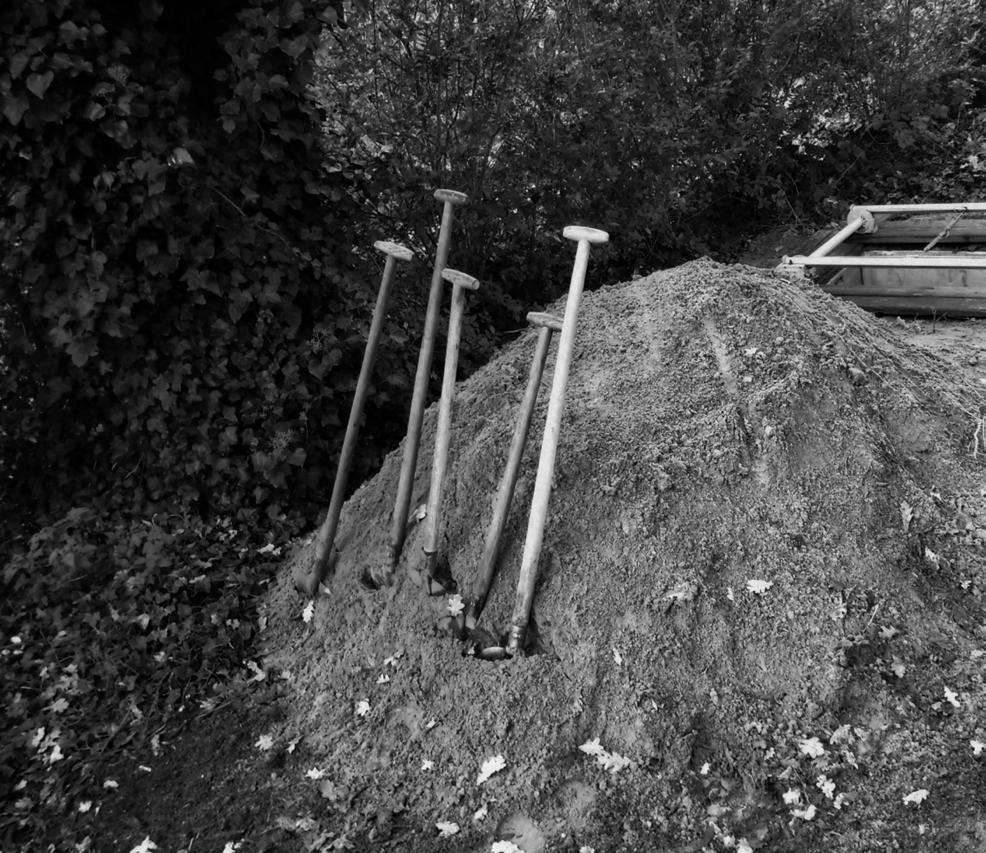
‘Suck it up, son,’ Frank scoffed. ‘Keep going.’
Mason tensed. ‘This again? You’re kidding, right?’
‘Oh, I’m kidding, am I? So, what’s the joke?’
Mason counted a breath, in and out. ‘Forget it.’
‘No, c’mon,’ Frank pressed, pausing to rest a heel on his shovel. ‘Enlighten me and my good buddy Tommy here. What’s the joke?’
‘You,’ Mason deadpanned. ‘You’re the joke.’
‘Whatever keeps you going.’ He grinned, savouring a beat. ‘Son.’
Mason pushed his shovel to the ground, taking the bait.
‘That! That, goddamnit – you turned eighteen, now you keep calling me ‘son’? It’s not fucking funny.’
‘It just works so well with your attitude.’
‘The fuck does that make you, then?’ Mason shot back. ‘Daddy?’
Frank’s self-satisfied smile dissolved.
‘If that’s how you want to see it, son, then be my guest. Just don’t stop digging.’
‘Oh, I won’t,’ Mason retorted.
‘So don’t.’
‘Real eager to get away from here all of a sudden. Funny, huh?’
‘Another joke?’
‘Fucking right it is.’
‘You’re full of ‘em.’
‘And you’re full of shit!’
‘Goddamn, why you gotta swear so much? Is it –’
‘Y’know,’ Tommy now spoke, interrupting the brothers. They were his first words since sunrise. ‘I’ve done shittier jobs than this.’
‘Doing what?’ Frank sighed. ‘Testing live wires with your tongue?’
‘And there I was,’ Mason reviled, ‘being told our little outing weren’t that bad.’ Frank rolled his eyes performatively and groaned.
‘I never said that.’
‘I worked in an Indian restaurant,’ Tommy’s voice pushed between them again. ‘Midday ‘til eleven thirty, Tuesday to Sunday.’
‘Indian restaurant?’ Frank frowned. ‘Like one in the casinos?’
Mason cringed. ‘No, you racist dumbass, he means like from India. Right?’
‘Sure,’ Tommy’s brow raised. ‘Like India.’
A bead of sweat from Tommy’s forehead made a break for the ground. Mason followed it down and licked his dry lips.
‘So, what did you do there?’ Mason asked to distract himself. ‘Waiting tables?’
Tommy shook his head. ‘Washed dishes.’
‘Nothing else?’ asked Frank.
Turning to Mason and winking, Tommy chuckled. ‘Fuck all but.’
Mason looked to his shovel. ‘What was so shitty about that?’
Sucking on his tongue, Tommy dabbed his collarbone with his sleeve. He cleared his throat and cracked a lazy smile. ‘The process, the people. All of it, I guess.’
‘I can relate,’ said Mason, then purposefully avoided Frank’s reaction.
‘I got told off if I changed the dishwater,’ Tommy continued. ‘The cook said I didn’t need to, even if it was like soup. There were two big ass sinks, side by side, and after you washed something in one, it was dunked in the other.’
‘To rinse, right?’ Frank asked.
‘Sterilise,’ Tommy corrected. ‘The second sink was full of boiling water topped off with bleach.’ He rubbed his eyes, recounting how the vapours burned, even scorched his throat. Hour after hour, stooped over the sink, elbow deep in a broth of food-waste, growing ever more turbid. ‘For five bucks an hour. No cut of the tips.’
‘Gross,’ Mason sympathised. ‘Still, could’ve been worse?’
‘It was worse. The owner thought my name was Timmy, not Tommy. Best yet, his accent made a T sound like D.’
Mason sniggered, ‘What, like Dimmy?’
‘Got it in one. And as was his custom, he addressed me proper. As Mister.’ He paused and shook his head, laughing. ‘Caught on with the whole kitchen. They called me Mr Dim.’
‘That’s unfortunate,’ Frank fretted.
‘So, for eleven hours a day, six days a week, I inhaled bleach as my co-workers treated me like a moron and called me Mr Dim.’
‘You didn’t correct them?’ asked Mason.
‘Tried. Tried a couple times. But after a while, I dunno –it’s simpler to pretend you’re in on the joke, y’know?’
‘Still don’t sound that bad,’ Frank quipped, though Mason didn’t feel like it was in agreement with him.
‘Sure it don’t.’ Tommy winked at Mason again before returning to the dig. Mason slowly retrieved his own shovel from the ground. His eyes kept straying to Tommy. He looked different since the first time Mason met him, when Frank brought him round to the empty house. It was like there was more of him to see now. Like he was all at once unremarkable and yet fascinating. How the armpits of his plaid shirt were soaked a dark maroon. How each time he lunged forward,
open buttons revealed his chest. Mason suddenly wanted to put his own shirt back on. Bothered, he thrust his shovel down with such force it hurt his hands. He grit his teeth, trying to hide it.
‘Come on, don’t quit now,’ Tommy spoke, kind and smooth. Dust and sweat had flattened his hair, partly covering his eyes. He smiled.
Mason didn’t protest this time. He shook his hands out then plunged his shovel back into the earth while Frank mumbled something to himself. Mason didn’t catch the words but still breezed over his brother with a scowl. Frank was oblivious, too focused on the dig. Mason noticed, in fact, that Frank looked twice as dirty as he and Tommy did, his long hair slick with grease, skin patchy with stuck dirt. Mason wondered how far behind they’d be if it weren’t for Frank’s efforts; then wondered what it would be like if it were just Tommy and him.
‘So, are either of you guys scared?’ Tommy asked sincerely. Frank responded by ramming his shovel again and again into the ground. ‘Mason?’
‘I haven’t really thought about it,’ Mason claimed, though his voice quivered. The dig dragged on until the concave hole grew far wider than it was tall. It would have been quicker if they could have been more precise when they started, but nobody knew the exact spot. The instructions had never been clear. Mason questioned if they were even in the right place at all. He knew better than to have that thought aloud.
They were five feet down when Tommy struck the ground and it splintered – dirt slipped through a crack like sand in an hourglass. Rushing from his side of the hole, Frank fell to his knees in a flash and scraped aside the remaining earth, quickly revealing more of a panel of pale raw pine. He grabbed Tommy’s shovel from him, frantically digging until the panel revealed edges, corners, a top; a sigil burnt in black. He didn’t ask for help, and it wasn’t offered. Soon enough, Frank was seizing the sides of what was now so obviously
a box, trying to haul it from its hiding place; its grave. It wouldn’t budge, like it was baked into a rock. Frank spat and swore repeatedly as he struggled, which Mason chose to ignore. Then, as quickly as Frank had dived down, he fell back on his knees, defeated, looking up and away, shielding his eyes from the vast whiteness of the sky.
‘It don’t need to come out, man,’ Tommy crouched down at Frank’s side to look for himself. ‘We can still get in.’
Standing behind the others, Mason found himself fixated on Tommy’s fingers as they trailed over the lid. They weren’t trembling like his.
‘I hope you guys know what you’re doing,’ breathed Tommy. ‘Remember what I said in the truck.’
‘Yeah, I do,’ Mason steeled, masking nerves as he repeated, ‘There’s enough gas to get us out of here fast.’
‘No, wait,’ Frank interjected, like he’d come round from a trance. ‘We – we can’t open it, right? Not like this, out here.’
‘We can’t take it home neither,’ Mason took a short step closer. ‘Not just to bring it back and bury it again. It’s now or fucking never.’
Frank looked back over his shoulder. Mason saw his eyes were wet. A different gnawing in his stomach overtook everything else. The same blood ran in every single one of their veins. It was like he could feel it flowing.
‘C’mon,’ Tommy’s tone was a velvet calm. ‘Let’s open it up.’
Mason extended his hand to Frank. When he pulled him to his feet, neither let go. Tommy rammed the head of his shovel under the lid. The grain gave way, nails prised up with a biting squeak. A creaking groan seemed to raise from the ground. Mason squeezed his eyes shut tight.
For just a moment, he told himself. He’d take a deep breath, and then he’d look.
The Hunter David Sergeant
The Hunter who said to me
To truly track
As I do you must change your cosmology: act As if any living thing can feel Your mind. An unusual character: He’d stalk till close enough to bring His sight to presence on a creature, Then pull the trigger: at which A bouquet of flowers Would burst from the mouth of his mind.
Surfing the Garden
David Sergeant
‘Like as the waves make…’
The gardeners are surfing God into the spinach breaks
And cutting back off the rhubarb’s towering curl.
You take the tensiled bobbing of a pea-shoot, Delicate as balance, and rise it slowly
To its feet down a speeding prism of water And roaring light –
the plants are surfing gardeners
Into the lovely left-hand break of Spring! They are leashed to their forms
As swallows are leashed to their wings –
As a spray of blossom goes up
Where the cherry tree carves back
Off curling hands and goes racing
Across the streaming face of the future –
And the cabbage, now airy as gossamer, Weaves in and out of the pocket
Of energy, trembles the lip
Of kohlrabi and broccoli and cauliflower.
The children shriek – run joyously
Through shallows, throw pebbles and cheer –
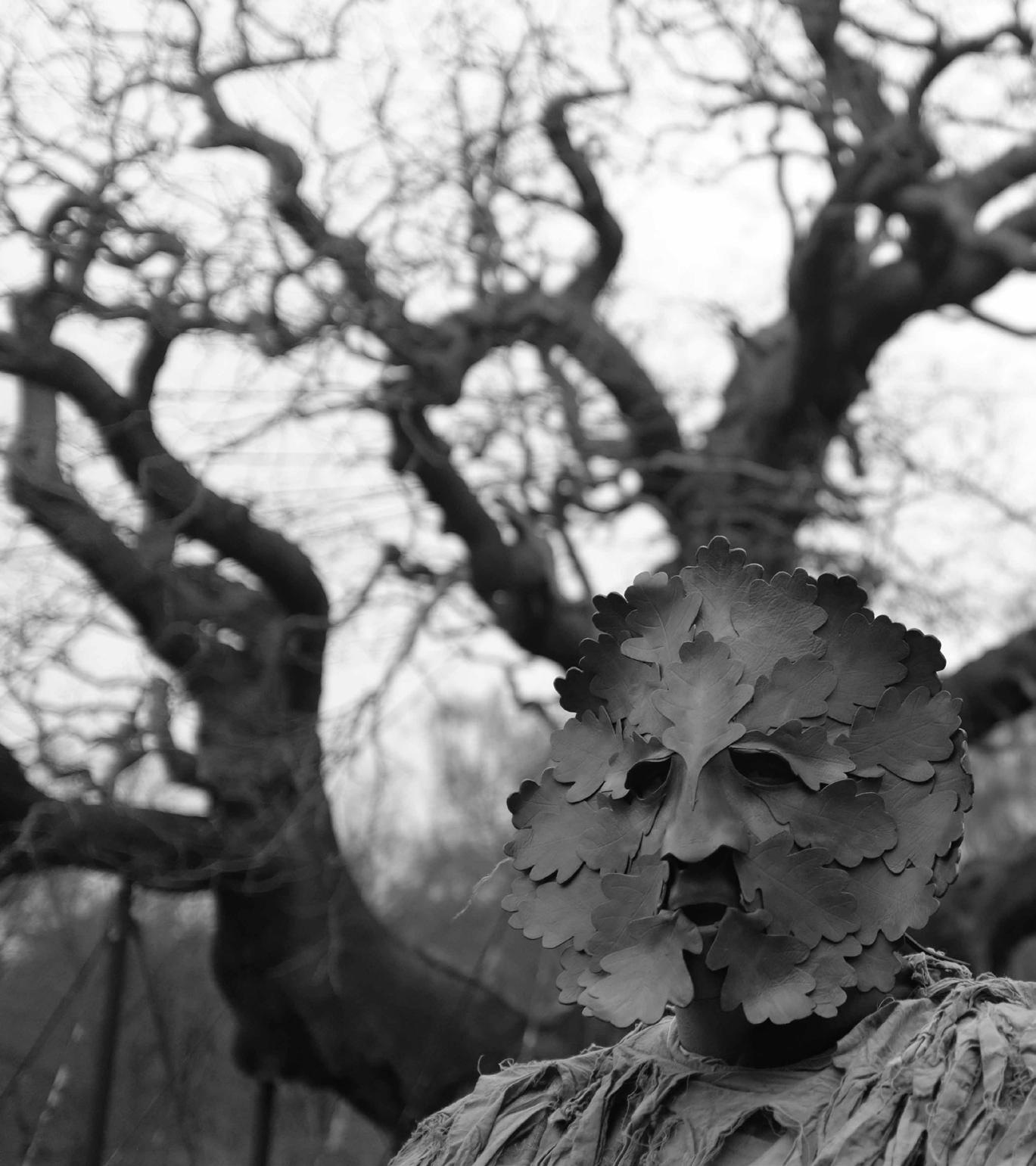
Photo by Ashley Gallant
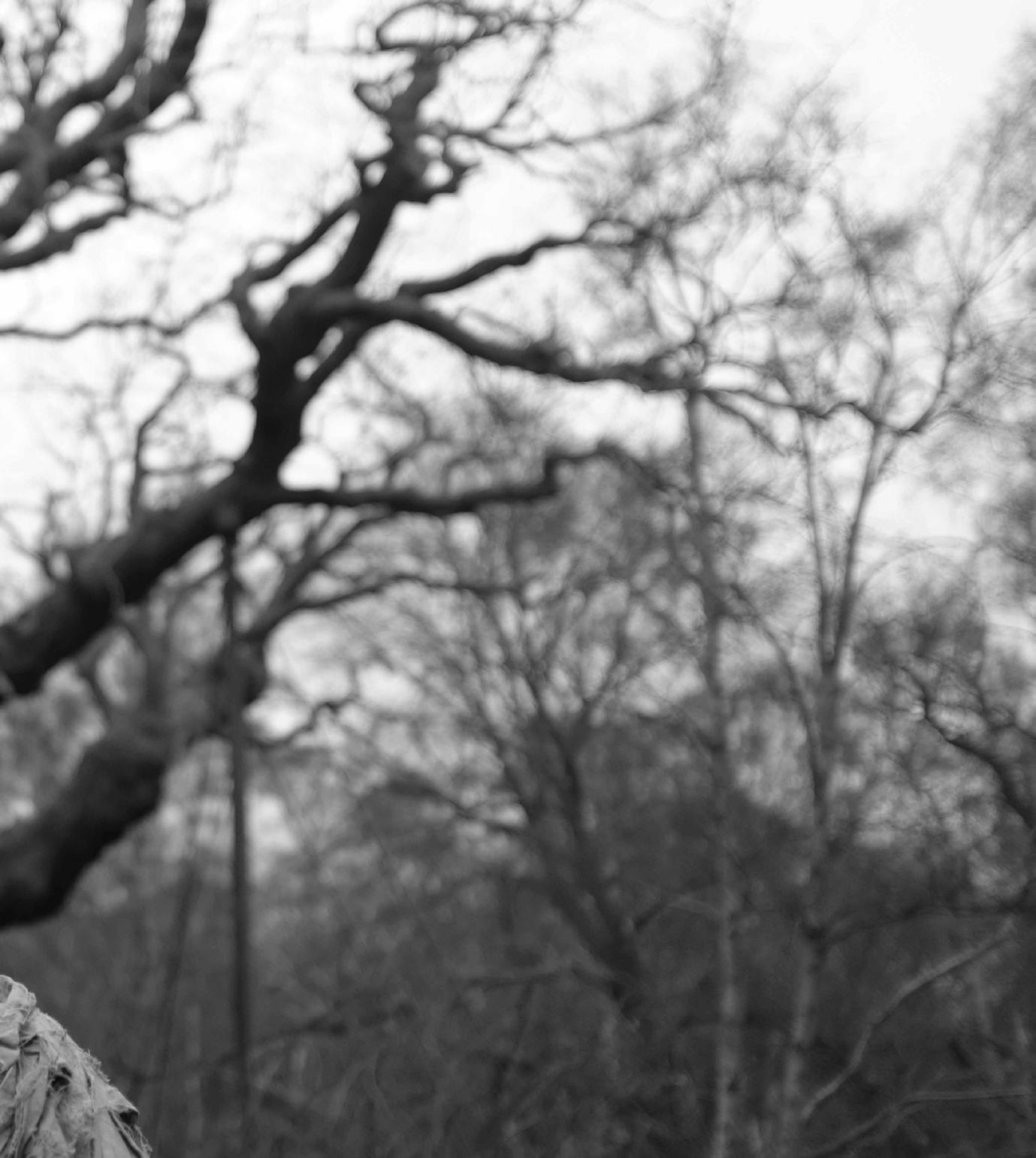
Heart of the Midlands
Jared Wilson
Aldo Rossi, the Italian writer, designer and architect, believed in a collective memory attached to buildings. I love this idea –if it’s true, then the building at 8 Talbot Street in Nottingham has enough stories to keep us all paying attention. Someone should probably write a book about that one day – give me a year or two.
Nowadays, people know it as Rock City, the music venue and nightclub that for generations has been a pivotal part of Nottingham culture. The venue is 22 months older than me, having opened its doors in December 1980. Since then it’s hosted some of the world’s most famous acts; Nirvana, David Bowie, REM, U2, Guns ‘n’ Roses, The Cure, The Smiths and many, many more. For a century before that, however, the building was an epicentre of curious things.
The earliest incarnation of 8 Talbot Street dates back to November 1876, when it was The Alexandra roller-skating rink. This was the brainchild of Edward Baker Cox, the proprietor of The Talbot Hotel on Long Row. At the time the (old) Nottingham Journal newspaper carried an ad with the shouty headline ‘Rink! Rink! Rink!’, announcing its opening. Roller skating was still brand new in the UK and the ad promised that ‘no accidents whatsoever have occurred’ at the old rink, to soothe any worried parents’ concerns.
The Alexandra first opened its doors on Friday 24 November 1876. It was such a success that three months later Cox actually opened a second right next door, known as The Marble Rink. More expansion followed: in September 1877 the Alexandra Rink invested in an aquarium and large rockery, requiring several tons of the porous limestone tufa. When the aquarium opened it included, as its headline attraction, two
live seals. In that era people in Nottingham wouldn’t have seen a seal outside of an illustrated book. The arrival of such an exotic animal must have got tongues wagging.
But the craze for skating (and marine animals) waned over the years, and so the halls were reclaimed for many diverse purposes. The Alexandra Rink – sometimes known as the Alexandra Halls – had been designed from the beginning for more than just skating. Kelly’s Directory of 1904 stated that it was to be used for entertainment, seating 2,500 people. Adjoining it were two smaller halls, one 65 x 75 feet, with 700 sittings, and another 33 x 22 feet.
The most common events were balls, dances and whist tournaments, but there were various other high profile events. William Gladstone, for example, who served as Prime Minister four times, is said to have addressed nearly 10,000 people at the venue in September 1877, when he was attending the laying of the University College foundation stone.
Between 1868 and 1894, specialist entertainers were booked for the rink: tight rope walkers, gymnasts and the strongwoman Mademoiselle Valerie, who became ‘the one theme of conversation throughout the town’. In late 1880, Mr Cox offered up the venue as a home to the Nottingham Gymnasium – who were attracted there by the close proximity to the Turkish baths.
This certainly made for an all-purpose venue. In December 1881 a meeting of the National Skating Association was held there; soon after there was a Poultry, Pigeon and Rabbit show. In 1884 the notable American long distance walker Edward Payton Weston spent two days in the Alexandra, walking 650 circuits of the hall each day. Weston had been attempting a 5,000 mile walk around Europe and, we must assume, had some steps to catch up on. The secret of his stamina was said to be his habit of chewing coca leaves as he strolled. I’m unsure how much fun this would have been to view as a spectator sport – but it happened.
During Queen Victoria’s Golden Jubilee in 1887, the
name of The Alexandra Rink was changed to the Victoria Hall. Shortly after being renamed, the building began a long stretch of time as a circus venue, specialising in equestrianism. The width of the main hall allowed plenty of space for a 42 foot diameter ring, deemed – and we will have to take their word on this – the optimum size for an acrobat to stand on a cantering horse.
But horses and ponies weren’t the only animals on display; there was a ‘Grand Troupe of Elephants’, for example, in Elphinstone’s Grand Circus in 1890. Visitors may have been even more interested in the ‘Exciting Pig Hunt’ the following February, as, very generously, the winner got to keep the pig. In 1895 Herr Seeth, who modestly promoted himself as ‘The Greatest Lion Tamer In The World’ presented seven trained African lions in a circular iron enclosure and a tiger riding a smart black pony. Through all these years the hall never neglected its ‘bread-and-butter’ function and, between the circuses, the skating continued: in the mid-1890s, 8 Talbot Street even featured football matches on skates.
The buildings brought a taste of internationalism into Nottingham. Into the 20th century, the building saw banquets and bazaars, and in September 1903 the hall temporarily became home to a ‘Dahomey Village’ – a troupe of West Africans, from what is now Benin, which included the famous ‘Amazon’ women warriors who had fought valiantly against the French a decade before.
In 1909 Keir Hardy MP, namesake of the current Prime Minister, addressed the local supporters of the Independent Labour Party, although apparently the hall wasn’t big enough for the crowd. For political balance, in January 1914 the Duke of Portland gave a talk there about Irish Home Rule to the Primrose League. The building continued to be used for dances, meetings and functions during World War I, although it was requisitioned twice as a temporary home for soldiers in 1915.
After the war – and the Victory Ball, which was held
there in February 1919 – the halls returned to normal, but their next door neighbour had their own designs upon them. The well-known Nottingham grocery company Burton’s of Smithy Row – considered to be Nottingham’s answer to Fortnum and Mason – soon purchased the building and its land, and on Saturday the 5th of May, 1928, the venue saw its last recorded dance party.
From the 1930s onwards, 8 Talbot Street was taken over, turned into an unspectacular storage space. The acquisition made commercial sense, and the building stayed in their possession until the 1960s when Burtons became part of Fine Fare, one of the first UK supermarket chains. For several years it simply housed a bakery.
Given its history, though, entertainment couldn’t be kept away forever. After several inconspicuous decades, Fine Fare sold off its Talbot Street buildings, and in 1973 J. Pullen Enterprises, of the Talk of the Town in Manchester, received planning permission for the ‘conversion of warehouse into theatre club’. The architectural drawings showed major alterations to the building. New features were to be added: tiers for dining tables, a stage with a pit, suspended ceilings and all the standard services like a kitchen and beer store.
Part of the building beside Stanley Place was demolished to provide access for coaches and deliveries. There was even a drawing of the entrance steps featuring a sign with the name of the venue. It would be called the ‘Heart of the Midlands’.
The brand new nightclub was managed by Alan Roper, later a manager at the Nottingham Evening Post, known for his on-mic patter and his gift on the piano, and the Heart of the Midlands’ grand opening took place on Tuesday the 6th of November, 1973, with a line-up headlined by the American singer Gene Pitney. In the beginning, acts booked at the venue would usually sign up for a week-long residency. Next up after Pitney was the Liverpool-born variety comedian Ken Dodd, who was then nineteen years into what would become
a six decade career. Dodd would have known the surroundings well, having made his first professional appearance at the Nottingham Empire in 1954. Of that debut, he later recalled simply: ‘at least they didn’t boo me off’.
Other residencies soon followed: Yorkshire-based comedy band The Grumbleweeds, famed for appearing on Opportunity Knocks and The Coal Hole Club; Tony Christie, who’d just sold a few million copies of his single Is This The Way to Amarillo; and the cabaret duo Ronnie Dukes and Ricki Lee, who’d become well known as regulars on an eccentrically-named ITV variety show, The Wheeltappers and Shunters Social Club.
For its time, this was a stellar line-up. The original intention was for the club to be a membership only, ‘sophisticated’ nightclub, with top-quality acts, where you’d go to dine and dance into the small hours. Unfortunately, the timing of its opening could hardly have been worse. The country was in a bad way – industrial relations were dire, oil prices were rising and inflation was rampant, reaching 25% by the summer of 1974.
As a result, in January 1974, a ‘three-day week’ was imposed by Edward Heath’s Conservative government. As miners across the country took industrial action, the PM instructed all businesses deemed ‘non-essential’ to choose between operating only from Monday to Wednesday, or from Thursday to Saturday, to conserve electricity. Not only did this mean that the Heart of the Midlands would be closed for over half of the week, but also that its customers found themselves working less, with emptier pockets.
The nightclub at 8 Talbot Street had to lower its prices and aspirations accordingly. It did survive this lean period, but the need for membership was watered down – so the calibre of the acts, and their performance fees, declined. The food became standardised, too, and the phrase ‘chicken-in-a-basket-circuit’ was born, and associated with the venue, used in a similar way to how the ‘toilet circuit’ would be associated with Rock City decades later.
The club’s glory days weren’t completely over. For a week in August 1977, Ray Charles, American icon, starred at the venue. The advert billed it as ‘Nottingham’s Greatest Show Ever From America’ and he was accompanied by a no-holdsbarred 17-piece orchestra and his own female vocal group, The Raeletts.
The list of the Heart of the Midlands’ performers read like a who’s-who of Britain’s entertainment in the seventies: Bob Monkhouse, Cannon & Ball, Dave Allen, Des O’Connor, Frankie Howard, Freddie Starr, The Krankies, Les Dennis, Lulu, Matt Monroe, Norman Wisdom, The Nolans, Rod Hull & Emu, Suzy Quatro and Tommy Cooper. Yet by the end of 1979, as the winter of discontent rumbled on, it became clear the management wanted out. The venue was taken over by Mr Peter K. Miller, who renamed the club The Big Heart and relaunched it in January 1980 with the Nolan Sisters headlining. Mr Miller was a discotheque owner from Barrow-in-Furness who also ran the Fiesta Nightclub in Sheffield. His tenure in Nottingham, however, was short-lived.
On Saturday 12 April 1980, after another show by the Grumbleweeds, The Big Heart stopped. At a creditor’s meeting in May, the dire state of Mr Miller’s finances was exposed. Artists and employees hadn’t been paid. Acts were claiming breach of contract. Thousands of advance ticket holders were clamouring to get their money back. Mr Miller is alleged to have fled the country – owing his creditors more than half a million.
The building remained closed for ten months, and it might have seemed that over a century of entertainment at 8 Talbot Street would be over. But it would soon be reborn. When it was taken over by George Akins (senior) and Sammy Jackson, it was relaunched as ‘Rock City’. Where once there had been seals, tigers and strongwomen, there would soon be Oasis, Blur and Green Day; a new chapter began which continues to this day.
‘The city itself is the collective memory of its people,’ said our Italian architect Aldo Rossi – ‘and like memory it is associated with objects and places’. 8 Talbot Street is one of those spots, saturated with Nottingham’s heritage, vital, eccentric, full of reinvention. At Rock City today, history is still being written. It might not be called the Heart of the Midlands any more, but it hasn’t stopped beating.
Footprint
Fiona Theokritoff
Chlorophyll f was discovered in 2010. A red-shifted chlorophyll, it is thought to have potential for use in solar cells alongside or instead of semiconductor materials such as silicon.
We marvel at nature building with sunlight: trees transform from twisted twigs to refreshing canopy grass flourishes and flourishes, flowers bloom, crops grow.
From single cells, for almost four billion years, cascades of photons have produced an energy current. Fuel for making mass: from sunlight and CO₂ to food.
Now we mimic photosynthesis: strange crops of black rows in our fields, panels on our roofs.
Late in time, we combine simple elements: from light to light – then heat and power.
Storm Watchers
Fiona Theokritoff
Meteorology at its most intense.
Your smile, the brightest insolation that elevates everyone, but whose radiation will burn you. And those around you.
Your words have the enchantment of light precipitation, baby-soft drops, but then faster, harder, harder, faster, fat drops that merge, leave us sopping, dripping. Delirious but worried.
Flash – the electric discharge of your spiky wit, lights us up: jokes, double entendre, word play.
We are under your rainbow: you split our pedestrian thoughts into corona, glory and halo, and we bask in your brilliance.
For now. We have been here before.
Speedy raindrop words pool and swirl, may drown you.
Squall gathers pace, leaves and feelings swirl, colder, then more biting. Merciless, destructive.
Your thunderstorm builds: unstable air in opposing directions of wind shear. Warm updraft sets your supercell spinning, spinning upright, untethered.
As we brace for land fall, we know a tornado can destroy all in its path.

Luke Howard Names the Skies, 1802
Fiona Theokritoff
A man of classifying zeal, he chose Latin for his cloud names. So instead of tendrils, layers and piles, we have cirrus, stratus and cumulus. In the grimy science-hungry City, he readied his vision of clean heaven at Plough Court EC1.
Stood in the sturdy black of his Dissenter’s coat. aware, but not ready, for the tinsel shred of worldwide fame. As candles were lit, the comfortable Gentlemen were already pondering their hearty dinner at the Royal Society later.
Howard entranced them all, their pipes in mid-air. With borrowed Linnean thought and watchful patience, his measured reasoning cast elegant light on the river of our language, made words into new science. A paradigm for Constable’s clouds, Ruskin’s words.
Today in Tottenham, the Stratus East and Stratus West stands soar above the roaring football crowd, in honour of the quiet East Londoner. No hotspur, no hothead, but namer of the skies.
Mesopotamia
David Belbin
Only one checkout was open. The guy behind it was nearly Gen’s age and had a tendency to be irritatingly chatty. Two people with full trolleys were already in line.
Gen resented being made to use the scan-your-own section, which had eleven tills. It meant doing the supermarket’s work for them. But she only had a small basket and patience had never been one of her virtues. At the self-checkout, she decided to make a point by not scanning two items: a bag of sugar and a multipack of baked beans. Both went straight into the ‘Mesopotamia’ collection box to the right of the checkouts. She could, she knew, be stopped for leaving the shop without paying for them. A shoplifting charge, however, was unlikely to stick, since she’d taken neither item off the premises. This was the nearest she’d come to breaking the law since 1982, when she’d spent two months protesting at Greenham Common.
Mesopotamia was two hundred yards down the road. It ran a soup kitchen as well as a foodbank. Gen squeezed into the shop’s cluttered foyer. She used to take her donations to Oxfam in Sherwood but had let the car go after Phil’s death. It took two bus journeys to reach Sherwood, where every other high street business was a charity shop.
Gen had arthritis in one knee and the beginning of cataracts, yet felt the same in herself as when she lived in a tent. People said this was what growing old always came as: a surprise. In your head, you were the person you’d always been. Except for the burden of grief you carried everywhere. Her oldest friend, Vicki, had gone in her fifties. Cancer. Others drifted out of her life during Phil’s long, boring illness. A different kind of death. You can’t resent people for having had enough of you.
‘A few bits for you,’ Gen said, handing over the bag. It
held the last of her husband’s clothes, his shaving mirror and an unopened packet of razor blades. A yellow dressing gown lay across the top. The garment looked as new as the day she’d given it to him, three Christmases ago. The pasty pensioner behind the counter, a bent-over stick figure with broken glasses, recognised her.
‘Very generous as always, thank you.’
‘That’s the last of it, I think.’
‘Bit more space around the house then.’
He took the Sainsbury’s bag-for-life through to the rear. This shabby building used to be a carpet warehouse. Long before that, a cinema, The Futurist. The original, illuminated sign was still on the side of the building. The exterior remained impressive, Art Deco style, with three otherworldly columns. The ‘Futurist’ sign had been maintained. You might think the cinema was still open.
Furniture was piled up outside: chairs five pound each, a faux leather sofa for a tenner. The narrow room that had acted as a foyer was crammed with CDs, DVDs and books. Books were fifty pence, as were the CDs and DVDs. Practically giving them away. Gen browsed. She liked the idea of choosing old films in an old cinema.
Someone tapped her on the shoulder.
‘Excuse me.’
Automatically, Gen moved aside. The woman must work in the shop, for she had a pile of DVDs in one hand. Presumably she was about to put them on the shelf, although there was barely room for more.
‘You don’t remember me, do you?’ Her voice was middle class, what people used to call RP, rather than the Nottingham accent. She wore shapeless slacks and a knitted top that had once been smart. Her hair was dyed dark and her blusher had been carelessly applied. She was a little older than Gen, perhaps eighty. She had what Gen would describe as a strong face, which might once have been very attractive but now gave an impression at once haughty and vulnerable. If Gen used to know her, it would have been a long time ago.
‘I’m sorry, no.’
‘It’ll come back to you. How’s your Phil?’
‘No longer with us, I’m afraid.’
Gen waited for the standard expression of sympathy. Instead, the woman looked conflicted.
‘How long?’
‘Two years since.’
‘I’m sorry. Listen, I’m due in a meeting, but I’m here Tuesdays and Thursdays if you ever want to talk. When you remember who I am.’
Walking home, Gen tried once again to place her. She’d lived in this city all her life, apart from Teacher Training College. Many friends had come and gone. The way this woman had spoken, suggesting that Gen was bound to remember who she was, had a definite edge, making Gen all the more annoyed she couldn’t remember who she was. Not Greenham Common. Possibly the Labour Party. School? She tended to remember old colleagues. A parent? That could be up to fifty years ago, but a parent wouldn’t know Phil.
Gen considered herself lucky in that she’d reached sixty just before the government began pushing back women’s state pension age. Soon after she retired, the record shop where Phil worked, Selectadisc, closed down. At 64, he was too old to find another job. He claimed not to mind. Fewer free gigs, more time for holidays. They’d meant to explore India. She tried not to let the edgy encounter in the charity store bother her. Had she somehow hurt this woman? Gen had gone to Sunday School, where she’d been taught to consider herself a sinner, to blame herself for deeds done or not done. Some of that stuck. In her teaching days there had, inevitably, been students she’d let down, colleagues she could have supported more. Not many. Enough to cause a twinge of guilt if something reminded her.
Most of the time, using CBT techniques, Gen was able to tune those twinges out. Negative thoughts were a waste of time. As was regretting things that might have been: missed

Photo by Francesco Triaca
promotions, the two-year contract teaching in Africa that she’d deferred, indefinitely, after getting together with Phil, the house in Mapperley they could have bought just before prices rocketed.
Rather than turn onto Vernon Avenue, Gen walked a further hundred yards to Vernon Park. The park had a library perched at the end of it. She would’ve visited the library, but it was closed on Tuesday afternoons, as well as Wednesdays and Fridays. The council had threatened to close the library altogether. A pressure group formed. Gen signed the petition but didn’t join the demonstration. She’d worn out the protesting part of herself.
The pond behind the library was wide, with wooden viewing areas. Ruddy ducks and swans were often about, along with the ubiquitous Canada Geese and the occasional rarer visitor. Children came to feed the birds, but most children would still be in school. Gen sat on a bench and watched the swans. They remained elegant even when feeding, twisting their necks to dive beneath the water’s grey surface.
When she started to feel cold, Gen made the short walk home. The park had a separate entrance that led directly onto her street. It was one reason they’d moved there, making up for the absence of a back garden. She’d never had a garden. Phil’s divorce meant that he had no equity or money towards the deposit. They’d chosen Old Basford because it was cheap.
That evening, instead of watching a DVD, which required slotting it into the machine and waiting a full minute for the film to load, Gen looked through the menu of recorded programmes on her digibox. Since lockdown, she’d devoured endless old Poirots on ITV3. She’d seen nearly every episode. Some early ones were shown in the wrong aspect ratio. Everything looked too wide. She sat through them anyway. There was probably a way to change their shape in the TV’s settings. If so, it was beyond her.
The only remaining episode on the digibox was Murder in Mesopotamia. She’d not watched that back when she re-
corded it because she’d only just read the novel. But that was two years or more ago, just after Phil’s death, and she could barely recall the plot. Many things from that time were a blur, although the book was still on her bedside shelf, a hardback Book Club omnibus holding five novels. A bargain for a quid, but too heavy to read in bed.
She’d read a Christie biography and knew that Murder in Mesopotamia was inspired by Agatha Christie’s second marriage, to Max, an archaeologist twelve years her junior. A very happy marriage, she’d read, helped by Christie’s willingness to help fund Max’s expeditions, and not enquire what he got up to when they were apart. The Mesopotamia expedition was the one on which Agatha had met Max. The novel was published, Gen recalled, after Murder on the Orient Express, although there was a reference to Poirot having returned from Mesopotamia in the earlier book, so, chronologically, this story preceded it.
She began to watch, trying to see if they’d changed any of the plot, which adapters were prone to do, thinking they could improve on Agatha. Now and then they could. Happily, Gen couldn’t remember the solution. That was a useful aspect of Christie’s novels. The ending often turned on a tangential detail, revealed late on. Christie’s dénouements were clever, but rarely memorable. When Gen was young, people looked down on Christie, but her reputation had been resurrected, with documentaries and biographies galore. Gen liked a Sarah Waters or a Patricia Highsmith, but Christie was her favourite bedtime read.
In Mesopotamia, two women were murdered, one of them inside what was, to all intents and purposes, a locked room. The archaeologist’s wife – Christie’s surrogate? – seemed to have a trail of admirers as well as a dead first husband, creating multiple suspects. There were suspicious locals, but the white characters, as in most aspects of the modern world, were the real threat. The solution, when it came, turned on a central character not recognising someone they hadn’t seen for fifteen years. Gen found this far-fetched. But it was
clever, she had to admit. And memories did fade. These days, it could take her a while to place someone. Many people claimed to have a form of facial aphasia, a condition which might prove fatal for a schoolteacher. Was the woman in the shop...? Surely not.
The TV Mesopotamia inserted Hastings, who wasn’t in the novel. Poirot’s friend gave the detective someone to confide in. Hastings voiced suspicions the reader might be having, allowing Poirot to debunk them. Gen would like a Hastings, somebody to sound ideas off or ask questions, like: when did people stop calling that area Mesopotamia? In Christie’s time, wasn’t it called Persia? So many millennia of history. Tough to keep up with present day geography, never mind the past. Phil was better informed about all that.
Leaving Sainsbury’s a week later, it was overcast, but dry. Gen decided to look in Mesopotamia but not to linger, in case there was a downpour. The ghost of a suspicion haunted the back of her mind. The sooner she exorcised it, the better.
The woman she’d spoken to the previous week was behind the counter. With her was a man Gen hadn’t seen before, a bearded, portly guy in a dark green cardigan. Gen was, unusually, the only person in the shop. The two people behind the counter were talking. It took the woman a moment to notice her. She raised an eyebrow and nudged the bearded man.
‘This is the woman I told you about. The one who stole my husband.’
The bearded man had the good grace to look embarrassed and leave. Gen collected herself as best she could.
‘Henrietta.’
‘You remembered my name.’
Phil used to call her ‘Henry’ or, occasionally, ‘Hen’ but the choice of name had been an involuntary reaction on Gen’s part. She had never met Henrietta, only seen her from a distance, back when she was the mistress and Phil the philanderer. A tall, striking woman, handsome rather than beautiful, slightly imperious. Gen would never have recognised her
without the insult which, forty-one years on, she deserved.
‘When did you move back to the city?’
‘Ten years since. My mum was dying. I moved in with her, never left.’
‘You never let Phil know you were back.’
‘Why would I do that?’
A young woman in a tracksuit came in and started asking about the electric kettle on a shelf next to Gen. It would be rude to leave, so Gen stepped aside and wandered into the shop’s third area, a large space with wardrobes cluttering its centre. There were old records in small crates on the floor, a pound each. These days that was cheap, for vinyl, which had been rocketing in value. When Phil died, Rough Trade in town had given Gen a good price for his record collection. Rough Trade was a belated replacement for the shop where Phil worked for thirty-odd years, Selectadisc. For decades, it was the city’s coolest record shop. Phil worked in all four branches at one time or another. He’d ended up running the second hand department. If they were short of cash, he’d sell some of his own vinyl.
Gen flicked through the contents of one crate. Musicals, big bands, crooners from the forties and fifties. The music of her parents’ generation. Useless now, all of it. She didn’t know why she was looking. Since Phil’s death, she’d ditched the record player. It took up too much space, so she’d put it up in the loft.
‘There you are.’
The voice was kinder than earlier. Gen looked up from the records and said the first thing that came into her mind.
‘What should I call you?’
‘Henry is fine. We’re not enemies, are we?’
‘Once I would have expected you to...’ she could not finish forming the thought, but Henry gave an understanding smile. Maybe, after forty-odd years, despite the earlier barb, Henry had let go. Fornication, but that was in another country – the past – and besides, the adulterer was dead.
‘There’s a room at the back where we can have a brew, if
you’ve time.’
Gen followed Henry past a sign saying that the community kitchen was closed. Henry filled a kettle.
If this were one of those cosy, grown-up films aimed at people her age, she and Henry would become bosom buddies, their resentment forgotten, discovering that they liked each other rather more than they had ever liked Phil. Gen would watch that film, but not believe it. She had no desire to speak to Henry. All they had in common was having fallen for the same bloke.
Gen missed Phil, but knew she could have done better. She’d been young and, enjoying the attention of the record shop guy, had faked a deeper interest in music than she really felt, wanting to differentiate herself from his wife, who he’d described as ‘a bit straight’. Henry was some kind of nurse, and her shifts allowed Phil a fair bit of freedom. Recklessly, Gen had encouraged Phil even after he told her he was married. The marriage, he’d assured her, was ‘dead in the water’. Still, she’d known that men lied about such things, not least the ones who declared themselves enemies of the patriarchy.
In her time, Gen had been with men more feckless than Phil, ones who insisted that all relationships had to be open because it was immoral to tie someone down. But Gen, back then, wanted to tie Phil down. She’d assumed that, for him, Selectadisc was a step towards a bigger job, something creative. Whereas he had the only job he’d ever wanted and appreciated Gen because, unlike his wife, she didn’t push him to get a career with a pension so they could start a family. Not that knowing any of this would have held Gen back. She was in lust. By the time that lust was satiated she’d learnt not to try and change him.
‘I remember him talking about you,’ Henry said, handing Gen a packet of digestives to accompany her mug of strong tea.
‘He talked to you about me?’
‘He was impressed how you’d just come back from that nuclear protest, living up a tree, thought it was a right lark.
I assumed lesbian, didn’t worry.’
‘Most of us weren’t.’
‘You never dabbled? I thought everyone did, during those years. Anyway, by the time I realised what was going on, it was too late.’
‘Is it too late for me to apologise for my lack of solidarity?’ Gen asked. ‘By the time I realised he was married, I was already smitten. I wanted to believe him when he told me...’
‘Water under the bridge,’ Henry interrupted. ‘When I heard he’d never left the record shop, I hardly believed it. The only job he ever had. Amazing.’
‘It suited him.’
‘And you suited each other, if you stayed together all that time. No kids?’
‘Neither of us wanted them,’ Gen told her, though this wasn’t entirely true. ‘How did you recognise me?’
‘Your face flickers up on Facebook from time to time, presumably because we have mutual friends of friends, or something like that. Gen Brewer. If you’d kept your maiden name, I wouldn’t have known who you were.’
‘Did you change yours back?’
‘Afraid not. So we’re both Brewers. Bloodless sisters.’
The way she said this wasn’t malevolent, but nor was it friendly.
‘You never remarried?’ she asked.
‘There were a couple of men I lived with. Two years the first, eleven the second. The first one I threw out when he didn’t live up to expectations and the other... I suppose you’d say mutual agreement.’
A notification sounded on Henry’s smartphone. She apologised, then replied to a text. Gen considered leaving. She thought about the phrase Henry had used: water under the bridge. A cliché she’d have told a child off for using. Time moved on but here she was, trying to step into the same river. She’d owed this woman an apology forty years ago, but they were different people now. She would go when she’d finished her mug of tea.
Henry stopped typing. ‘Sorry about that. Family. There’s something you ought to know.’
‘That sounds ominous.’
The older woman’s eyes became kind, which confused Gen. She had a sudden need to use the loo. If she left now, Henry might not tell her what she was about to tell her. She should have gone in Sainsbury’s.
‘The thing is...’ Whatever it was, Henry was clearly working up the nerve.
‘I’m sorry, but is there a loo in here? I’m bursting.’
‘Of course.’ Henry pointed to the sign that Gen could hardly have missed, had she been looking.
‘Hold that thought.’
Going into the Ladies, she noticed an exit to the car park behind the cinema. She could leave without seeing Henry again. Gen wouldn’t find out whatever it was that Henry wanted to tell her. She had a strong sense that it was going to be something she’d rather not know. People might want to tell you things, but you did not have to hear them, not unless they were family, and Gen had no family left. She was, she realised, as closely connected to Henry as she was to anyone in the world.
Henry was talking to the man with the beard. Seeing Gen return, he scuttled back into the shop. The older woman got out her purse and withdrew a photograph. It showed a couple in their twenties, the woman holding a baby. The woman was quite striking, more than pretty, with eyes that told a story.
Gen took a deep breath. ‘When...?’
‘I didn’t know I was pregnant when he left. I’d been trying without telling him. Then he walked out. There was no way I was going to let him have any involvement, so, soon as I could sell the house, I moved away.’
Gen remembered Phil’s complaints that Henry had sold the house ridiculously cheaply, leaving him with nothing but debt to bring to his second marriage. When they got together he’d claimed that he and Henry had long since stopped sleeping together. She’d chosen to believe him.
‘What’s her name?’
‘Hannah. Something good came out of the marriage, something lasting.’
‘And you wanted me to know that.’
‘Want? No. Need, perhaps.’
‘And the grandchild?’
‘Three of them now. Arthur, Henry and Philippa.’
Gen noted that last name. ‘Did Hannah never want to...?’
‘I never kept it a secret from her. She could have got in touch with Phil at any time. She did go to take a look once. In Selectadisc. This would have been around the turn of the century. She was surprised he still had long hair.’
‘She didn’t speak to him?’
‘She heard him speak, she said, recognised that she had his eyes. Did you notice that? She said that was enough. He wasn’t her father. Mike, the bloke I lived with from when she was seven to eighteen, he was the nearest to a father she had. They’re still in touch. He gave her away at the wedding.’
‘And you were never tempted to tell Phil?’
‘Tempted? In a way. Look what you missed! But it became Hannah’s decision, and she’s a kinder person than I am.’
Gen needed to leave. ‘Thanks for telling me.’
‘I’m back here, and I saw you, and... I don’t know what I thought. Secrets are silly at our age, aren’t they?’
‘I suppose they are.’
Gen had had an abortion early in her affair with Phil, before she had become certain of him. She’d never told him, had never told anyone, which made it a real secret, one that only she knew. She got up to go.
‘I’m sorry you had to bring up Hannah on your own,’ she said.
‘I loved every minute.’
Touché. Gen managed a thin smile and thanked Henry for the tea. Then she left the back way, in case she needed to be sick.
There ought to be someone she could talk this over with, but there wasn’t. Pointless to think how Phil would have re-
acted; he was no longer there. She’d have to carry this knowledge alone.
Forty years of living just down the road, but she’d never walked through the large car park at the back of this building before. There was another charity shop to her left. It sold new goods and closed at half past three, which seemed very early. There was a car parts place and, beyond that, a deep warehouse. This was where the main cinema screen used to be, her childhood haunt. She’d seen A Hard Day’s Night there, joined the other teenage girls screaming at The Beatles. Other films too, but that was the one that came to mind.
In Vernon Park, the crocuses were out, flooding the area beside the library with purple blooms. It was only February, but spring couldn’t be far off.
Henry must have already heard that Phil was dead. Doubtless she’d been planning this afternoon’s conversation since Gen’s face popped up on her Facebook feed. Gen couldn’t hold that against her.
No swans today, but plenty of mallard ducks. Canada Geese came and went. She gazed at the pond, her mind elsewhere, until the children came out of school.
Writers
Benedict Cooper is a Nottingham-based freelance journalist and photographer who has written for national newspapers, national and international websites, consumer magazines, local press and specialist trade journals. He covers politics, society, literature, business, and the culture and history of Nottingham.
Emma Neale lives in Ōtepoti, Dunedin, City of Literature; her most recent poetry collection, Liar, Liar, Lick, Spit (Otago University Press), won the Peter and Mary Biggs Award for Poetry at the Ockham New Zealand Book Awards, 2025.
Indu Menon is an Indian writer and sociologist, author of acclaimed short stories and novels that explore identity, tradition, and postmodern sensibilities. Winner of the Sahitya Akademi Yuva Puraskar and several state awards, her works are widely taught in universities, and she has also written for Malayalam cinema.
Amy Acre is a poet, and founding editor of Bad Betty Press. Her debut collection, Mothersong (Bloomsbury, 2023) was shortlisted for the John Pollard Poetry Prize, highly commended in the Forward Prizes and named a Book of the Year in the Telegraph and the Financial Times. She lives in Nottingham.
Hongwei Bao is a Nottingham-based queer Chinese writer, translator and academic. He is the author of The Passion of the Rabbit God (Valley Press, 2024), Dream of the Orchid Pavilion (Big White Shed, 2024), Queering the Asian Diaspora (Sage, 2024) and Self-Portrait as a Banana (Poetic Edge, 2025).
Janet Gunter is a queer crip luddite who lives on land enclosed in 1799.
Vanessa Bell is an award-winning writer from Québec and the director of the poetry collection at Éditions du Quartz. She is the author of two collections of poetry and the first francophone Canadian to be supported by the Writers’ Trust of Canada’s Rising Stars program.
Rich Goodson taught refugee teenagers at Nottingham College for 27 years before starting a new life as a therapist, Buddhist teacher and queer warrior.
Gail Webb was Bridport Prize Shortlisted in 2024. She writes to connect and share moments as we travel together in a harsh and beautiful world.
Bridie Squires is a poet, playwright, producer and performance
artist from Nottingham. Previously journalist and editor at LeftLion Magazine, she was appointed Nottingham Trent University’s first Writer in Residence in 2019, and founded Nottingham spoken-word collective GOBS in 2020.
Paul Liedvogel is a writer from Heidelberg, Germany, part of the UNESCO Cities of Literature network.
Nathan Curnow is a poet in Ballarat, Australia, and he acknowledges the Wathaurong people of the Kulin Nations, upon whose lands he lives and works. He is the author of numerous poetry collections and his latest book, A Hill to Die On, is published by Liquid Amber Press.
Andrew Tucker Leavis’ writing has appeared in Radio Times, Under the Radar and Litro. He won an Indépendance prize for poetry, co-edits the literature section at LeftLion, and is the editor-in-chief of this journal.
Nicholas Hogg is a winner of the Poetry London Presents, Gregory O’Donoghue, and Liverpool poetry prizes. His debut collection, Missing Person, is out now with Broken Sleep Books.
Jib Tran is a queer Vietnamese-American writer and artist based in Devon, who loves dreaming of horseshoe crabs and shooting stars.
Henry Normal is a Nottingham-born writer/producer and poet; a BBC Radio 4 Broadcaster and co-founder of Nottingham Poetry Festival. A patron of Nottingham City of Literature, he has honorary degrees from NTU and Nottingham University, plus a bus and a beer named after him.
Griffin Gudaitis is an emerging fiction writer based in Oxford, England, and the Director of the Oxford Writers’ House.
Thomas Legendre’s previous work includes The Burning, Keeping Time, and Spring Fever, as well as multiple short stories, critical essays, and drama for stage and audio. He teaches Creative Writing at the University of Nottingham.
Helen Cross is a Malcolm Bradbury Creative Writing Bursary Holder at University Centre Peterborough.
Alison Moore’s short stories have appeared in various ‘Best Short Stories’ and ‘Best Horror’ anthologies and are collected in The PreWar House and Other Stories and Eastmouth and Other Stories. She has published five novels, including The Lighthouse and The Retreat.
Aurora Amaryllis is a creative and journalistic writer based in Nottingham. She regularly contributes articles to LeftLion and has been
highly commended by Hive West Yorkshire’s 2025 Young Writers’ Competition.
Elizabeth Cook is a Birmingham-based aspiring poet who writes about mental health, grief and ecology. She works in Higher Education and as a volunteer story-teller for the RSPB.
Emma Oldham is an award-winning conservation biologist and published children’s author based in Newark-on-Trent, England. Her passion for wildlife and storytelling began in childhood, never far from a notepad or a rescued creature.
Ho Kin Yunn is a Singaporean writer whose work explores grief and discomposure under migratory contexts. He is currently based in Nottingham.
Gaynor Jones is a writer, carer, and short story fanatic based in Oldham. She is the recipient of a Northern Writer’s Award for her (unpublished) short story collection, Girls Who Get Taken.
Vinod Sankaran is the author of two volumes of poetry in Malayalam, and the recipient of the 2025 Louis Peter Memorial Award. He lives in Kozhikode, India, with his wife, daughter, and son.
Chloé Rose Whitmore is a writer and poet from Nottingham, whose work has appeared in Mslexia, Dear Damsels and LeftLion, among others. In 2023, she was longlisted for the Manchester Poetry Prize.
Daniel Cordle is a freelance writer, researcher and editor, based in Nottingham; his most recent book (co-edited with Sarah Jackson) is Bunker: Stories and Poems from a Nuclear Age (Five Leaves, 2024).
Frank G. Karioris is a writer and educator based in San Francisco whose writing addresses issues of friendship, gender, and class.
Nas Jolaade writes to express his observations - and here is one of them.
Thom Seddon is a writer and all-round creative type based in Nottingham, where he lives with his husband and their two cats, and watches far too much Judge Judy.
David Sergeant grew up in West Cornwall and now lives and works in Devon.
Jared Wilson is a journalist and the Editor in Chief and co-founder of Nottingham’s LeftLion magazine. He has also written about culture for The Guardian, The Big Issue, NME, The Times, The Independent and more.
Fiona Theokritoff did a degree in ecology a long time ago: these
days she teaches creative writing to adults, and her pamphlet New Uses for a Wand was published last year by Five Leaves.
David Belbin has been publishing novels and short stories since 1989 and was the founding chair of Nottingham UNESCO City of Literature. Greeneland, his current project, is a serial novel about Graham Greene’s four months in Nottingham, each entry published a hundred years after the day it describes.
The first volume of the New Nottingham Journal was supported by:
Abigail Gayer
Adrian Long
Alice Veldtman
By Our Hands We Make Our Way
Ben Bloomfield
Ben Macpherson
Ben Rawson
C. Marriott
Caleb Dixon
Carol Williams
Cath Rodkoff
Ceri Marriott
Christy Fearn
Colin Tucker
David Knight
Freddie Taylor-Bell
Geoff Charlwood
Guidance and Growth CIC
Hanna Butler-Knight
Hannah Trevarthen
Hatty Bacon
Helen Morris
Helen Scott
Holly Brockwell
Hongwei Bao
Jeanie Finlay
Jim Leaviss
Joanna Atkinson
Jocelyn Spence
Jonah Larchwood
Julia Hodson
Julia Wong
Julian Bower
Kevin Chittock
Lauren McGee
Linda Murphy
Liz Wilding
Mark James
Michelle Saxton-Corner
Mike Carter
Mike McCabe
Rebecca Cullen
E. J. Velassi
Rory Waterman
Sarah Wheatley
Simon Eckersley
Terry Eynon

